#and very frequently goes ''death of the author - whatever i say outside the books is irrelevant and doesnt matter. read it how you want.''
Text
Something something Jason feeling like he doesn't quite fit as "Greek" or "Roman" as a metaphor for bisexuality, particularly the semi-canonical bi-coding in his half of experiences during the Cupid scene and how Favonius and Cupid speak to him in parallel to the scenes confirming Nico is gay.
Something something the camps as metaphors for traditionally acceptable forms of relationships and Nico living as a rogue outside of them, rejecting expectation (ergo in himself representing a metaphor of queer identity and living outside of boxes and defined/usually hetero-allonormative/binary ideas of what love/relationships should look like) versus Jason struggling with the expectation to conform to a label and even discussing with Nico both of them remaining at CHB together.
Something something the inverse of Jason shifting away from the camps after he breaks up with Piper, feeling lost and unable to find a place between the camps as he begins to explore his queer identity properly for the first time versus Nico only remaining at CHB because he has entered a relationship. In this essay I will-
#pjo#riordanverse#jason grace#nico di angelo#analysis#i know ive semi-rambled about this before here#but i was thinking about it on the discord the other day#for those in the discord forgive it being mostly copy/pasted from my rambling lol#i say ''semi-canonical bi-coding'' re: the Cupid Scene because. well. it's in the text! it's pretty overt!#which means it's pretty canon but nobody ever really discusses it and Rick has never acknowledged it#but also he never acknowledged Reyna's aspec-coding until a rare instance of him responding to q's on twitter#(that chain was also specifically sparked by me in that instance - due to him replying to my open letter about aspec coding in the series#- which i still find amusing cause it is SO obvious he didnt read it)#and he only like once acknowledged his mostly unintentional aspec-coding of the Hunt on goodreads#and very frequently goes ''death of the author - whatever i say outside the books is irrelevant and doesnt matter. read it how you want.''#''if you can get it out of the text then there's your canon.'' which i respect. reject ''word of god'' canon embrace analysis
327 notes
·
View notes
Text
Yandere Mitsuri, Sanemi and Gyomei with a gn darling who comes out as nonbinary



Request(ed): Yes! - Hello! I absolutely love your writing. may I request mitsuri, sanemi, and gyomei with their darling (or whatever you call it) who comes out as nonbinary? (originally f to gn). Stay hydrated! — Requested by 🍡 anon.
Warnings: yandere themes and beating up people.
Authors note: Akkk, this was so fun to write. This is probably one of my favorite to write!
Please request Gyomei more!! He's so underrated. Hope you like this 🍡 anon!!

Mitsuri Kanroji:
Extremely supportive. Once you tell her, she’s not hesitant to give you a big hug, plastering your face with kisses as she tells you she’s never ever gonna stop loving you just because of who you are. She’s happy that you came out to her.
Mitsuri is immediately doing everything in her power to make sure you feel comfortable in yourself; whether that’s reminding you verbally, that you’re the most attractive person in the room or buying your favorite color clothes to make you feel more confident, she would do it in a heartbeat.
If you decide to get a binder, she will have it personally made with your favorite color(s). Once she sees you wearing it, she hypes you up and tells you: “You’re so pretty, baby!!”
But, she’s sorta-strict on the binder limit. If she sees you wearing it longer than you’re supposed to, she will politely remind you to take it off, then hug you super tight; referring to you as the best partner she’s ever had. She'd then offer to do some stretching sessions with her.
If she hears someone talk down to you or refer you to your dead pronouns, she would yell at them, saying along the lines of: “That isn’t nice, y’know? You’re so mean.” Afterwards, she grabs your hand, leading you two out of there. Afterwards, she buys your comfort foods and cuddles you to death.
Mitsuri oftens compliments you. She makes sure you feel good about yourself, often telling you look adorable or hot at times. She hates when she sees you down or self conscious of yourself, when you shouldn't be.
If you're having a bad day, she will try to make you go outside with her, pick some flowers and walk around; buying some Dango and getting more outfits. She will often tell you to shower with her, offering to massage you or just have a nice bath. This also goes along the lines of drinking water, eating, and frequently doing physical activities.
Overall, she loves you for you; she treats you like pure royalty.

Sanemi Shinazugawa:
Absolutely has no idea what it means, but is willing to learn what it means; once you explain to him about your preferred pronouns, he’s grabbing you, kissing your head and whispering in your ear: “I love you for you, nothing will ever change that idiot.”
Not in a rude way, but Sanemi really doesn’t care what you identify. He fell for you (personality wise), that’s all that matters to him. However, he’s very proud of you for coming out to him; seeing that you were nervous and would think he would be mad or upset. In which, you should never ever feel that way.
If you decide to get a binder, he will have an extreme-strict schedule to make sure you don’t hurt yourself. If he does see you wearing it over time, even by two minutes, he will have a fit; throw a glare towards you and wait till you take it off.
Sanemi is very observant, so if he sees you looking in the mirror or just having a bad gender-day, he will try to ask you to talk about it. If you don’t want to, he’ll respect it and ask to spend time with him; either read a book together, sit on the padio in the early morning or take a warm bath together.
Someone dares to misgender you or in a way, make fun of you? He will have a screaming match with them, throwing hands half of the time. Either, after he finishes beating them up or yelling at them, he will take you away and distract you as best as he can: making you your favorite food, giving you a massage and giving you cuddles.
Much like Mitsuri, he will compliment you; expressing his love. Sanemi would compliment you when you wore your binder, new clothes, or a type of accessory that brought you extreme happiness; when you come in, he looks at you stunned, looking at how nice you looked, he would just nod and smile a bit: “You look really lovely.”
Sanemi would and will never judge you, in that matter, he loves you no matter what.

Gyomei Himejima:
Gyomei is instantly accepting of you. He’s a bit confused at the term, but as soon as you explain to him, he’s gently nodding, a smile covering his face; a tear comes down his jawline as he expresses he’s happy that you came out to him.
If he scents an inch of discomfort on you, he will sit you down and talk to you for hours on what he loves about you and why you should too.
If you want a binder, he will gladly get you one. But, he will try to keep up with the time limit you can only wear. By the time it goes off, he gently reminds you to take it off, do some stretching and take a walk with him.
When someone misgenders you, he will correct them, but if they’re being rude; he will frown, asking if they’re sad or so on. He doesn’t understand why people can be so cruel. If they continue on, Gyomei will grasp your arm and guide you both out of there; going on a walk to ‘look’ at the rivers nearby and pick some flowers.
Whenever you’re having a bad day, mentally or just not feeling very confident; he will remind you that you’re absolutely perfect. Much like Mitsuri and Sanemi, he will offer to start a bath for you, order you some new clothes or allow you to vent to him as much as you want.
Gyomei will try to compliment you, but due to his eyesight, he will try to feel for any new clothing or accessories, saying something along the lines of: “Is this new? It fits you very nicely.” Or if you get a new bottle of perfume/cologne, he will comment on it, saying that ‘It suits you. It’s a lovely smell.’
Gyomei’s opinion will never change. He loves you because of how kind you are, not by your body; he loves you for who you are, inside-wise.
—
Masterlist || Please reblog and comment instead of liking!!
Do not plagiarize, repost, modify, translate or copy my work.
ALL RIGHTS RESERVED ©yandere-kokeshi


#yandere blog#kokeshi!!#male yandere#yandere#yandere x reader#yandere anime#yandere headcanons#yandere gyomei#yandere gyomei x reader#yandere sanemi shinazugawa#yandere sanemi headcanons#yandere sanemi#yandere mitsuri#yandere kny#yandere kny x reader#yandere x gn reader#yandere x gender neutral reader#yandere demon slayer x reader#yandere demon slayer#yandere girl#yandere male#yandere x you#yandere x darling#yandere x y/n#yandere kimetsu no yaiba x reader#yandere kimetsu no yaiba#yandere hashiras#yandere hashira#requested by 🍡 anon#kny x reader
151 notes
·
View notes
Text
Ineffable Con 2020 Fun Facts
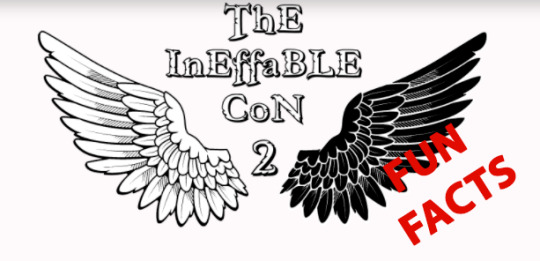
Fun facts from the Ineffable Con 2 (2020) guest panels :):
Neil Gaiman, Douglas Mackinnon and Rob Wilkins
David G. Arnold (the music composer)
Claire Anderson (the costume designer)
Peter Anderson (Peter Anderson Studio created the opening title animation and in-show graphics)
Paul Adeyefa (Disposable Demon)
Jeremy Marshall-Roberts (the owner of Mary the Bentley)
1. Neil Gaiman, Douglas Mackinnon and Rob Wilkins
What do they have from Good Omens:
Rob has the statue from St. Beryls, all four motorbikes from the four horsemen, Crowley’s Devon watch, box signed by David Tennant with Crowley’s sunglasses and Aziraphale’s cocoa mug with Michael Sheen’s DNA :).
Douglas has the playing cards from Episode 1 and heavily annotated Good Omens book they used for filming with inscription by Neil: ‘For Douglas, make us love, make us cry, 3rd August 2017’.
Neil has Aziraphale’s chair from the bookshop that he bought from the BBC and he uses it for Zoom meetings.
What is their favourite thing that was not in the book and was added to the TV show:
Neil: all of the first half of Episode 3 - an absolute joy.
Rob: also the beginning of Episode 3.
Douglas: David Arnold’s music and Peter Anderson’s front titles.
Could Aziraphale get out of the Bastille easily if he wanted to?
Neil: if he could: absolutely. Did he have any conception of the mess he was in: probably not. It’s one of Neil’s favourite pieces of acting - the absolute delight on Aziraphale’s face when he realizes that Crowley’s there and then he turns around and rather petulantly, grumpily goes oh it’s you - that moment of joy on Aziraphale’s face when he realizes that he’s been rescued is one of Neil’s favourite things.
Neil and yoghurt starter: I had this slightly mad thing where I would explain to everybody that fans were yoghurt starter. And I said, ‘Basically you start out with yoghurt starter and you put it into your warm milk and you leave it, and the yoghurt starter goes off and turns the entire thing into yoghurt.
Neil realized that there was a cat in his house (Neil doesn’t have a cat :)). After the panel Neil said that he was going to look for the cat with a can of sardines and Douglas joked that he would find Michael Sheen in a cat costume.
What was the best and worst about making the series:
Douglas: the best - the camaraderie, getting to know the people, the cast and crew.
Rob: the best - realizing that the book could be translated to the screen and watching it happen. The worst - coming to the end of the shoot and saying goodbye to everybody.
Neil: the best - the amount of love from everybody, the worst - fighting budget battles (producers wanted gone all of the cold opening and the death of Agnes Nutter).
Did they expect that Good Omens would attract so many LBGTQ+ people and how they feel about that:
Neil: Yes, absolutely. There are definitely people out there who seem to think that I accidentally wrote a love story with all of the beats of a love story including a break-up halfway through, without somehow noticing that I’d written a love story. And I may not be the brightest candle on the candelabra, but as an author who’s been doing it for a long time, I’m very well aware of when I’m writing a love story, thank you very much. And so from my perspective I knew that the love story would be one of the driving things that would get us from the beginning to the end. And I also made a bunch of decisions about our angels and our demons in terms of casting, in terms of gender that everybody backed me up on, which I loved. You know, the idea that the archangel Michael is played by Doon [Mackichan] is something that is... or Beelzebub is Anna Maxwell Martin, whatever, there’s... it’s not like we are going: these are women, there are men, we are going: these are demons, these are angels. They... this is not a thing. And also doing something like Pollution, where you go in and go: okay well if we were doing this in... if 1989 was now, if there were they pronouns, we probably would have done that. We didn’t think of it at the time but that’s no reason why we can’t do it now. And we did and I remember having a... not exactly a battle, but a... my very tiny skirmish with one of our execs who was very nice and very bright and was like: ‘Why are you saying they?’, and I’m like... and I... explaining, and he’s like: ‘Well I’ve never heard of that before.’, and I’m like: ‘Oh, okay, but trust me, just trust me, it’s all fine, just trust me.’
Douglas: And you know I have to say, just following on what Neil’s saying, I’ve been directing for quite a while, and I tend to notice if characters are falling in love, I tend to notice a love story happening in front of me, and I think it’s there, and everything is meant, guys, everything is meant.
Neil added: I would just say, there are some things that you do while you’re writing a script intentionally. The fact that... I wanted to do this, well, it was a thing I did that I really enjoyed doing... where whenever people accuse them of being a couple: they don’t deny it, they don’t argue, there’s no flustering on their part. They absolutely… you know, everybody… what I’m trying to say is: yes, other people in the story are perceiving them as a couple too. And here is Uriel perceiving them as a couple, here is wonderful Dan [Starkey, playing the passerby] …and you know, you do scenes like that because that’s... you are trying to make a point here and you’re trying to make a point on how people are perceived.
Season 2, yes or no [fiends, all three of them!]:
Douglas: What’s that?
Neil: Of what?
Rob: Is it muted for me as is for everyone else?
Neil confirmed that they are going to be Funko Pops. [yay!]
2. David G. Arnold (the music composer)
He didn’t read the book before he was approached to do the music. He was asked to do it by Douglas Mackinnon he knew from the Victorian episode of Sherlock and he said yes before even knowing what it was about because he wanted to work with Douglas again.
The first piece of music he wrote for the show was the brass band doing the Lazing on a Sunday Afternoon [Episode 6, in the park before the kidnapping].
The second piece of music he wrote was the lullaby that Crowley sings to Warlock. He always liked the lullabies like in Mary Poppins so he said to Neil: Why don’t we do it like Walt Disney, but if Walt Disney was possessed by Satan? That was about 7 months before he needed to write anything again while they were shooting and it kept going round his head the whole time - the melody stuck with him and when it came to the Opening Title of the show, this became the middle bit.
The original opening title was Everyday by Buddy Holly and each episode was supposed to be closed with a different version of it: a death metal version, an angelic choir version, a carmina burana version... and he actually made all those. But he likes to find the musical identity of the show and put it in the opening titles because it’s important and it tells you: ‘This is the word you’re going to experience’, so he wrote his own opening title with the lullaby in the middle and played it to them [probably Neil and Douglas] with Buddy Holly as the backup and: Neil just turned around in his chair and said, ‘That’s Good Omens.’. From that point the instructions were with no rules, just to create whatever he wanted: the further you can go the better, the weirder and the stranger you can think the better. It’s a rare thing to be shown a world like Good Omens and be let free to run around in it.
His favourite ending title is the Queen one in Episode 1.
One of the reasons he didn’t do a theme for Crowley and a theme for Aziraphale is that the theme of the show is theirs - it’s theirs and they share it and it’s both of theirs and there is no separating in that regard.
About Aziraphale and Crowley’s relationship reflected in the music score: It’s interesting isn’t it, because the relationship changed in a way slightly frequently and majorly infrequently. It seemed right from the start that their relationship was somehow seeded and planted and had begun by the time we saw them even though they may not have realised it themselves, you know, with the pair of them on the wall, considering one is a demon in the Garden of Eden and one is an angel. They act very charitably towards each other and they act with a lot of things you might not expect. And underneath that there is a sort of sense of togetherness and support even though they both know that their paths are going to diverge and they have different responsibilities. So I always felt like, right from that moment, when the wing came up on the wall, that there was something special about their relationship. Three moments that stuck with him: in Episode 3 saving the books in the church when they completely rely on the other for survival in the way that they were very open about, one in the car outside the nightclub in 60s Soho - the Holy Water, you go too fast for me, that genuinely tearing, that there was reluctance in those words that he spoke and that sort of things as a composer is gold, it’s about making those moments more, and in the last episode in a scene they’re not event in when we see Adam and Dog in the fields and Anathema that music there which celebrates Crowley and Aziraphale’s music which is the theme of the show - their shadow has passed over everyone’s emotional journey, and everyone’s emotional journey is theirs as well. The argument in the bandstand was important as well.
His favourite leitmotif from the series is the lullaby.
About the scene in the car in episode 2 when Thomas Tallis changes into Queen: Terry’s favourite piece of classical music was the Thomas Tallis piece [Spem in Alium] so Neil asked if they can go from Thomas Tallis - a choral piece from 16th century - to We Will Rock You, and: ‘You never say no. You don’t say that you can’t do it. What you have to do is to be the first person who solves the problem.’ In the end it was a two-days work just for this little bit and he mentioned that he never had these sorts of challenges anywhere else before.
His favourite non-musical detail in the show - the crucifixion, how the scene was shot, how it was upsetting, and how it was made more effective by Aziraphale and Crowley’s inability to stop it, that they had to observe and watch it, that it had to happen. I remember seeing that at the time and thinking, I wasn’t expecting that level of brutal honesty, in terms of the pictures that I was looking at and what they chose to show. And I think all the more effective for it.
3. Claire Anderson (the costume designer)
When creating the costumes for the characters she started with mood boards.
Aziraphale - she knew that he needed to have something winglike in his collar so that’s why there are sweeping lapels very often. Using velvet [for the waistcoat] because that was nice and soft and had all the appropriate qualities. His watch and fob that has little gold wings hanging from it and other tiny bits of symbolism. Tartan bow tie. Beautiful cashmere checkered trousers - not quite tartan but a nod to it. A mid to late Victorian coat, Michael only made his decision on the coat a couple of days before the filming. Aziraphale in the present settled on a ring with angelic symbol and harp cufflinks, earlier his ring in ancient times has got a much more roughly hewn set of wings on it, so before jewellery making became sophisticated he modernised slightly - he magicked it up to be a bit more modern, more gentleman signet type of ring, but he never modernises entirely. His heart is much more in the past.
After they began to define Aziraphale they started to look at how the Heaven army of angels might look - the element of tartan came sort of from Aziraphale and the angels have a not-tartan kilt with a semi military type jacket and a military band across that might hold arms or not, because they are not really violent. She used spats to make them look quite neutral and genderless so hiding fastenings and concealing little details like that seemed a way to do that.
Gabriel doesn’t wear spats because he’s on Earth such a lot. His shoe has a cover with two buckles on the side giving the same neutral element. He wears a cashmere light-as-air suit.
The other angels are all in bastardized versions of what era they may have died in, so they could have died in the 1930s or the 1800s and the costume would have an element of that era about it - though of course as an angel you can change things.
The Quartermaster Angel - the costume is a combination of slightly Indian type military, maharaja pants, longer spats from another era, all combined pieces of military tailored to be magical and slightly nonsensical, as Heaven might be.
Crowley - she felt that he wrapped around like a snake sheds its skin so she wanted something double breasted because that seemed to envelope his snakey charm. David wanted to be more casual than wearing a suit. Under his collar he always has a flash of red like the snake that he comes from - the red belly. They put a red seam into the sole of his boots so always there is a hint of where he came from. The red tie in the blitz. He was more rock and roll than Aziraphale and modernised more to a snakehipped rock and roll star really. His present jacket - the fabric there is quilted, they found an 80s jacket that had elements of things they enjoyed - part of that was that it had a slightly quilted quality to the fabric which was like a textured snakeskin. It took quite a long time to create the fabric and then to make the jacket from that - they quilted some fabric and washed and whooshed it repeatedly to create a bit of puckering in it. He has a snakey scarf around his neck like a chain mail linked scales of skin scarf that he wore that complemented his neck chain. The trousers he wore in Victorian times are the same he wore in the 60s when he meets young Shadwell. His present trousers - slightly waxy denim - we just were looking for a slithery finish. Crowley’s neck chain - there is only one in the world - her tailor has a Gothic church full of interesting stuff like busts and drapes with old things, this chain mail scarf was there and David was looking for something to complete his costume and liked it.
Hastur and Ligur are her favourite characters - they were so enjoyable to create. She had an amazing book of 1920s and 30s criminals and they used that as a starting point, because they were all quite worn out and bedraggled and poverty stricken and like hell might be ideally. They burnt and decayed the bottom of them as if they were rotting from the Earth and rotting back into the ground - all demons have sort of gators as if they were rotting from the ground up.
One of the most difficult things was the demons - when they realized they had a few days to create hundreds of demons in South Africa (4-5 days for almost 200 demons). It was as if I had been dissolved in holy water when they asked me for another 150 costumes.
The sleeves of Anathema’s coat have been inspired by a Victorian cycling coat.
The historical costume that Newt’s ancestor wore influenced his and Shadwell’s costumes - they used elements of the historical costume to put a little cape on Newt and Shadwell and their wax coats to give them the quality of that look. Newt's costume has a lot of mustard to make him feel a bit awkward and uncomfortable - it's not the most flattering colour on a northern European complexion.
The nuns’ headdress needed to look a little bit demonic - she bought a whole book on nuns’ headdresses for research. They also used the V in the nurse's apron because that was nicely demonic. The nurses' watch has got this Satanic symbol at the top - a little take on the medical since old nurses’ uniforms used to have watches.
For Madame Tracy she went back into the 70s, slightly Biba-esque makeup and a cape. They had only one pair of her goggles so it was always a nightmare to find them.
Which part of the cold opening is her favourite: I love ancient Rome because there is at least 6 to 12 metre of fabric in a toga and that was quite fun wrapping that around the boys and creating those., and her favourite was the Globe.
The lapels represent wings in every way and every shape and every form. Wings are very important.
4. Peter Anderson (Peter Anderson Studio created the opening title animation and in-show graphics)
The first thing that the director Douglas Mackinnon (with whom he worked on Doctor Who and Sherlock) said to him was: for all the graphics, for all the title sequence, for everything, I want you to promise me one thing, and that is very, very simple, promise that you send me emails that say: ‘this might be absolutely nuts, but my idea is...’.
The opening title it’s full of easter eggs - it’s a type of sequence that’s been designed to watch a thousand times, for example: on the escalator down to Hell there is one character running up deciding that he doesn’t want to go to Hell or the sea is full of plastic bags because we don’t look after the planet.
Every single face in the title sequence is either Crowley’s or Azriphale’s, they are repeated all the way through - inspired by Neil saying that there’s good and evil in all of us, so there is a grand procession of people of all the characters from the story - marching towards Armageddon - but all the characters have been taken over by good or evil. And along the way our two heroes are kind of playing tricks on each other, doing good, doing evil
The opening title combines multiple elements - two dimensional animation elements, three dimensional animation elements, CGI and live action (the people in the procession were created by live action on a travelator). So the result is a kind of strangeness - such as 3D figures with 2D animated tracked heads - which makes it unique.
Their first idea and version of the opening title was based on tapestries of old, subverting them, but then they wanted something more new and fresh.
Both Douglas and Neil were an important part of the opening title creation process.
The opening title sequence took about a year to make from the creative start with four intensive months towards the end.
One of things that inspired him was a Bauhaus theatre image from 1930s.
Question if the hand-drawn font for the graphics will be a purchasable font: no, because it was original and it’s unique and it was created just for this - it was for the love of the show and the story and it will be kept there.
In the scene where there are three photos of witchfinders - Neil and Douglas revealed in the DVD commentaries that two of them are their grandfathers - the third one is Peter’s great uncle.
Originally the signs telling us things like ‘Thursday’ or ‘Mesopotamia’ - were done as if somebody (who was living inside the television screen) ran up close to the screen and showed us the sign. In the end they simplified it, only showing the signs. The one time that it was sort of left in the show was when in Episode 5 a little demon in the video game shows a sign ‘GAME OVER’.
Outside of his work on it, what was his favourite thing on Good Omens: spending time with Douglas and Neil, and also working with Milk VFX - I think I can honestly say it's the best job I've ever worked on with the nicest people.
5. Paul Adeyefa (Disposable Demon)
He first read the book when preparing for the audition - the character wasn’t in the book but he got into it, loved it and couldn’t put it down.
He didn’t know about the name Eric until the script was published and people started calling the demon that, he really likes the name and thinks it fits.
There was a version of the script where the demon was going to be dressed in different costumes each time he was discorporated (for example one in long hair wearing a dress) - they would be all the same but different incarnations, in one version they had different accents.
The first scene he shot was the one where the demon goes to Heaven to deliver the Hellfire (and also wants to hit ‘Aziraphale’ which was cut). That first day was also his favourite moment of shooting because there was an immediate welcoming atmosphere and everyone was lovely and in love with the production.
Disposable Demon is like a permanent intern, running errands for the higher ups in Hell.
His favourite part of the costume were the eyelashes (though he loved the whole costume).
If he could change anything about the costume he would also want cool contact lenses - some brightly coloured ones.
Question what animal (like other demons have on their heads) comes to mind when we see the Disposable Demon: he didn’t think about it at the time, but later he saw people talking about his horns as bunny ears and found it interesting, and also the facts that there are so many of him and that he is quite happy and friendly for a demon so the bunny makes sense, so he might be a sort of a rabbit. Or perhaps something goat type because of the horns.
Question if there is another role in Good Omens he would have liked to have played: he always thought that the four horsemen were very cool and Pollution was his favourite so probably Pollution (also was the most jealous of Pollution’s contact lenses).
If there were a season 2, he would be there in a heartbeat.
Question about Eric’s feelings on Crowley, if he’s a bit of a Crowley fan: I think he might be. There is something about Crowley and how he is somehow a little bit different from the rest of the demons. - and the Disposable Demon has, much like Crowley, interest in the human world. He could well be 6,000 how many years old, the same as everyone else, but he seems to have this younger vibe and I think he thinks that Crowley is quite cool.
Good Omens fandom is his first experience with a fandom of this scale. It speaks a lot, the fact that this kind of very, this minor character, a character who is only on screen for a very short amount of time gets any kind of attention at all, it's quite amazing really, it goes to show how big and enthusiastic the fans are. I never experienced anything like that.
6. Jeremy Marshall-Roberts (the owner of Mary the Bentley)
When Crowley used a miracle to switch off the Bentley lights in Episode 1 at nuns manor it was done by: there was actually a very small guy called Louis turning on and off the switches quickly.
David Tennant was allowed to wear the snake eye contacts for only 3 hours a day otherwise they could damage his eyesight.
For Mary, the Bentley, it was the second time she was ‘blown up’ on film - first being in the Endeavour with Inspector Morse about three years earlier.
He was a bit nervous during filming the bookshop fire scene because the Bentley was so close to a real fire - not wanting the paint to blister. The car was moved off after a few minutes of filming but still.
About the damage to Mary: Unfortunately, we overran, and Rob my stunt driver had already booked a holiday and off he went and so when he returned in January, on the 10th of January, I had this new driver who really had no clue how to drive old cars, so I showed him around, I showed him to go around corners. He came around the corner, the door was not closed properly for some reason and the door flew open as he went around. And instead of slamming on the brakes which is extremely efficient and would stop him straight away he kept on going, hit another car and really smashed the door quite badly. It did take the car off the roads for 10 months. The door was completely remade because of this accident and it cost the total of £24 000 to rebuild the car to get it back to running as it is today.
The Bentley’s part most difficult to maintain and service is the engine.
Would Mary be available for a potential season 2: definitely!
#good omens#ineffable con#neil gaiman#douglas mackinnon#rob wilkins#david g arnold#claire anderson#peter anderson#peter anderson studio#paul adeyefa#disposable demon#jeremy marshall-roberts#bentley#ineffable con 2#ineffable con 2020#bts#fun fact#costumes#music#opening title#long post#finally finished this post#can I hear a wahoo? :)
2K notes
·
View notes
Text
run-on sentences
loosely inspired by this beautiful art by @pan-da-hero
on ao3
----
Draco loves to write.
Not fictions, as much as he likes reading, he has no interest in creating new worlds or people and makes them do things that he has to think up. He loves to write – about himself. Because even at the stage of innocence, Draco always thought he is the most interesting person there are.
From age ten, he filled journals and journals. Diary, of sorts. Besides recording his (very interesting) life, a lot of them were fragments of musings. Some of them were letters, especially after starting school. Students at the Slytherins common rooms were used to seeing Draco sitting by the fire, by the window, at his desk, on his bed; ornate leather journal and quill in hand. And Draco’s furious hysterics if he were to be interrupted were almost as legendary as his Harry Potter tirade.
He writes as a child, as a teenager, as an adult (only in the legal sense) then as a man. His page span from thick, traditional journal to loose parchments bound together to cheap muggle paper notebooks. His handwriting went from carefully constructed individual letters to arrogant cursive to frantic scribbles – so illegible and so obviously written in the dark; finally, to smooth and soft curves; reveries about boys and healing.
Draco writes until he’s twenty-seven, ten years out of the war, with old enemies turned new friends and old friends turned family and family turned ghosts surrounding him when someone asks if they could see his works?
What works, Draco asks.
Apparently, this agent is friend with Blaise and he has raved about Draco’s bel-esprit, how interesting his perspective was on the war, the struggles he went through to overcome his beliefs, what a romantic he secretly is –
Draco sends a stinging hex to Blaise who is lurking somewhere in the crowd and tells the agent no.
It is Ginevra who gets him to change his mind, as always. She wants kids, and she says Draco telling his side and how he changed is valuable for their world to see what to look out for. Plus some ridiculous sentiment about inherent goodness that Draco has no intention to remember but gets convinced anyway.
He has to dig out his journals. He still writes, about whatever he fancies, but the old ones were left in his childhood bedroom in places he frequented as a child but no longer remembers now. An Accio has all of them flying out of a loose floorboard that Draco only then remembers he pried loose himself because that’s where people hide things in books.
Reading through them is shameful. Reading through them with the agent is embarrassing, but her eyes lit up frequently and her nose sometimes scrunches in distaste, then she just keeps crying, after the first five years of journals. She asks if he wants to organize them in chronological order, or —?
That’s a loaded question. Draco doesn’t know. There are diaries, notes, ideas, thoughts, letters. The agent sifts through everything and decides that the diaries can be in chronological order, in their own section. And everything else they will go through and divide them into sections.
Draco squeaks when he realizes she wants to publish everything and argues that no one wants to read a behemoth of a book. She says a behemoth of memories is a good thing.
Draco isn’t sure anyone will read it. Who will want to read a brat’s diary? Who wants to read a Death Eater (he was still one when some of these were written)’s thoughts?
But people do. They line up outside of shops. Owls tire themselves from deliveries. On request of Pansy, who sees this as golden opportunity to make some pretty gold, pesters Draco for stocks of his book and sell them to people who didn’t manage to get one on the first day.
All of this disconcerts Draco, who once upon of time would no doubt love this. Though, as much as he loves to talk even now, these were the talkings that he hadn’t been brave enough to say. He has thought no one would be interested, now the reality is that everyone knows.
Draco writes all of this down.
He asks for time off work.
Harry comes knocking, just a few days later. Draco knows it’s coming, still he trembles when he goes to greet him at the door. Harry hasn’t finished reading the book yet, can he finish the rest here? Draco nods, let Harry sits on his bed as Draco takes his seat at the desk. Harry opens the book, and Draco knows where he’s at by the thickness of the two halves. The diaries are done and he is on the miscellany. Draco turns. Harry’s face gives nothing away but Draco knows, he knows, Harry is reading the section titled “Love Letters”.
“Love Letters” starts with a short note, written by Draco five years of age, to a boy he met at a gathering his father used to have. “Love Letters” isn’t typed but had images of the original letters (done by Scan-ing, or something). “Love Letters” consists of notes and origamis addressed to a variety of people: Blaise, Remus Lupin, Penelope Clearwater, some Quidditch star Draco can’t even remember the name of except for the way the man’s brown eyes honeyed under the sun. These love letters comprised less than half of “Love Letters”. “Love Letters” is originally named “Draco Malfoy’s embarrassing crush on Harry Potter (Potter!)”
Draco used up his only veto for that.
Most of them don’t even read like someone in love. Most of them read like hate mails, bullying and sniping. But Draco is the one that wrote them and he knows what they had meant. A lot of them were heavily creased, because they were folded into origami animals. When Draco first found them, he had to be so careful opening up, old from the years, they wouldn’t have survived rough treatment. There are a smattering of letters written when Draco was thirteen and fourteen where he expressed genuine heartache that he wasn’t friends with Harry; an explosion of anguish, written when Draco was sixteen and seventeen; then finally, eighteen, cluster of letters, slow and sweet, like fruits overly ripe. Accounts of Harry’s struggles and victories after the war. (One letter embarrassingly detailed the shape of Harry’s chiseled jawline in far too many words). There’s one where Draco spent a full parchment talking to Harry about his sudden aptitude in schoolwork and how much Draco likes it because he has always appreciated intelligence in men. Draco had written those like the letters were meant to be seen by a lover. But he never did, even though Harry and he had been friendly by then already.
The fact that the book omitted any names doesn’t matter because the author is Draco and he practically founded the Potter-mania. Plus most of the letters mentioned green eyes and long lashes.
But Harry doesn’t seem upset at being written into letters then into a book that got published for the whole wizarding world to see. Ten years has mellowed the public’s affection for Harry into a simmering haze; something Draco can’t comprehend whatsoever.
Harry shuts the book gently and asks if he could see them. Draco has to pretend he doesn’t know what Harry is asking about. Then he lies and says they’re at the publishing house. Harry tells him that Draco would never leave something so personal at places like that, if he has to guess, is it somewhere beneath the floorboard based on Draco’s love for old romance novels?
Draco protests and grumbles and goes to pry the floorboard up, but Harry stops him before his nails make contact with the wood. Harry delicately grasps Draco’s hands and murmurs let me and before Draco can even blink his haze away, his journals, notes, and letters are in Harry’s reverent hands. He picks out the crumble letters that show it has been folded and unfolded until it’s bruised and loved. He traces the “P” of every letter, always the first, and always written with the most vigor.
I noticed these, Harry says.
Draco doesn’t understand what that means.
You used to fold them in class, Harry says. I noticed.
Then he grabs his copy of Draco’s book and takes something out – a piece of parchment that has been folded and unfolded until it’s bruised and loved. Harry holds it out.
It’s Harry. On a broom, smiling until a bulger hits him. Draco’s eyes seek out the messy hair that a thirteen-year-old Draco had drawn on one strand at a time, tenderly despite the end product. And the arrogant cursive of his sighed name in the corner. And the little lone figure in the otherwise empty Quidditch stands, laughing and looking at Drawing-Harry.
Draco says this is embarrassing. Harry laughs and tells him it’s okay. Draco then scoffs and clarifies it’s embarrassing for Harry, who keeps a drawing of themselves getting hit in the head? Then Harry is kissing him, cradling him in his arms like he did the parchment, which is surprising because Draco has been folded and unfolded until he is bruised, but he never thinks he can be loved, too.
Against Draco’s lips, Harry says he wants to finish Draco’s embarrassing book. He wants to know if there’s a happy ending.
Draco spoils his own book by telling Harry there isn’t. The book only goes until he was twenty-five-years old. Which wasn’t a bad year, just a difficult year. Draco folds himself up so he can fit in Harry’s embrace better and tells him it’s okay.
Harry sounds genuinely upset when he says how can it be okay?
Draco kisses Harry, and again, and again, until his lips are sore and flushed and Harry looks a little less sad. Draco kisses him quicky again because — well, just because. Because the book ends, but it’s not the ending, Draco says.
Harry asks how will it end. Draco shrugs and says he doesn’t know.
Harry says his fine petulantly and wraps Draco tighter in his arms. He opens Draco’s book again and presses his cheek to Draco’s hair when Draco tucks his face into the crook of Harry’s neck. Harry kisses Draco’s hair and says, I guess I’ll just have to stick around and find out.
962 notes
·
View notes
Text
On commenting and feedback
Hey friends...so something’s been bothering me a little and I want to talk about it for a sec. I want to be clear I’m not making this post to call out anyone in particular, this is an entire trend I’m seeing and I just...kind of want us all to take a breath for a second.
Every so often I feel like there’s a wave of posts that goes around about how important commenting and reblogging is to support writers. And that’s absolutely true. A fandom that doesn’t interact with its content creators dies a pretty pathetic death, it’s absolutely true.
But the tone of a lot of these posts have started to bother me, especially as I see newer writers pick them up, and I just want to put some things in perspective here, and leave some thoughts for both the writers, and the readers.
Readers, your comments are absolutely valued and extremely motivating for creators to receive. At the same time, there’s no contract that says writers are entitled to a certain level of feedback. It is not on you as a sole individual to reach an invisible standard of interaction that will cause them to create more. And if you’re sweating and freaking out and guilting yourself over commenting--then don’t. Find the level of interaction you’re comfortable with that, and accept it, and don’t feel guilty about it. If writing a comment for me causes you agony and robs whatever joy you took out of my story, then I don’t want it. I truly don’t. Just leave the kudos if you can. There’s lots of helpful advice out there on how to comment if you want to but aren’t sure what to say, and when in doubt, read the other comments and feel free to add “what they said!” or use them as a model for your own comment. But absolve yourself of the guilt. Do your best.
Writers. My friends. My colleagues. There’s nothing wrong with wanting validation and feedback. Yes, it is absolutely disheartening when you put a lot of effort into your work and you don’t receive the level of reaction you are hoping for. You put yourself on the line and you did something scary and you should be very, very proud of that. At the same time, no one chained you to the desk. No one forced you to pour out your soul. No one guaranteed you a certain number of comments of a guaranteed minimum length. Sometimes you throw out a line out there and nobody picks it up, and you feel sad and alone, but that’s not the fault of whoever was on the other side. You chose to put yourself out there, I hope because there was just something inside you that had to come out. And the best you can do is make that choice with your eyes open. Just like there are plenty of good published books in the world that never made the bestseller list for reasons completely unrelated to the effort put into them or the quality of their content, sometimes you publish something at the wrong time, or to the wrong audience, or in the wrong place, and it just doesn’t hit the way you want it to.
And I especially want the young writers and the new writers to hear this: you know what? This problem has always been there, and it’s never going to go away. I’ve been publishing fic off and on since I was 18 and the major form of feedback was leaving messages on a website’s guestbook. It’s always been a problem. As writers we’re hungry for feedback. We want to know someone is on the other end. The supply is never going to equal our demand. Regardless of whether or not that is fair or the way things should be, that’s the way things are. You’ve got to find a way to be at peace with that, or you’re going to be frustrated and discouraged forever. It will get better as you grow in your craft and grow your audience - and as it does, it will take more and more to satisfy you. So just, take a minute before you lash out because you feel your effort isn’t as reciprocated as you feel it should be. I’m all for spreading awareness of how much writers crave feedback and what a boost it is for us to receive it, but we don’t have to throw a temper tantrum to do that.
I encourage you to think about your piece a little bit before you publish it and calibrate your expectations. Every piece has it audience and some of them are going to be smaller than others. Sometimes that is not “fair;” by which I mean, an audience’s response is not necessarily proportional to the amount of time, effort, and emotion put into a work. As of the time I wrote this, my silly little piece that I wrote for fun in an afternoon has literally three times the number of notes as the fic I have put the most heart and work into, despite the one being extremely short and the other being multiple chapters. I’m not particularly bothered by that, it was entirely predictable (although sometimes it’s not; sometimes audience is very, very unpredictable). Things that are funny or sexy are almost always going to get more attention than things that are deep and angsty, things that are short are frequently going to get a bigger audience than things that are long. Just consider your expectations.
It also takes time to build an audience. I recently reblogged a post of mine from early last year when I was newly returned to tumblr that had 9 total notes and it quickly shot up into the 70s. Same fic, not a word different, it’s just that over the last year I’ve built a bigger audience. So consider that, as well. As you’re trying to build that audience, do you really want your brand to be ‘that author who’s always complaining about people commenting’? There are some things in life where you have to get angry to effect change. I don’t feel that fic feedback is one of them.
“But how am I going to improve?” My friends. Expecting to improve your writing from internet comments on your work is like fishing with a deep sea trawler. You might get some good stuff but you’re going to dredge up a lot of trash in the meantime, and it’s probably not worth your effort and the toll on your confidence to wade through it. Find yourself a group of people, either in real life or online, who you trust to give meaningful feedback. Sometimes that’s super easy, and sometimes it’s not. But it’s completely worth it to find people who both challenge and encourage you, and it’s a lot less discouraging than inviting internet trolls to beat you over the head. Be specific, too, in asking for the type of feedback you want. I myself am extremely sensitive to criticism, so I choose to ask for it only in very limited ways, from very specific people. To continue the previous metaphor, use a fishing pole in the right type of water with appropriate bait, to make sure you’re getting the kind of feedback you want.
But you want to know a secret?
It’s okay to not care about improving. It’s okay to just enjoy what you’re doing. So if you want to improve, by all means try. But if you just think you should want to improve, when in reality you just want to write a fun story, that’s totally okay too. Sometimes you have to give yourself permission to not necessarily be the best that you can be. Let yourself write the fun silly crack once in a while; not everything has to be a V. Serious Undertaking.
I’ve rambled on long enough, so let me just conclude with this: It’s okay to want validation. It’s okay to encourage people to comment, to tell them how much their comments and reblogs mean to you, to ask them to leave you feedback whenever they can, and give helpful tips about ‘how to comment if you’re not sure to comment.’ It’s not about the request, it’s about the tone. It’s not okay to browbeat people, accuse them of killing fandom, to tell them that they’re the reason that you aren’t writing more/anymore, because that’s patently untrue. You are responsible for your own creative process, and if it can’t thrive without constant reassurance, then that’s not an audience problem, my friend. That’s a disease that’s terminal for your writing.
And finally, remember to support your fellow writers and creators. Nobody gets it the way fellow creators get it, and if we can’t depend on each other for support, we’re certainly not going to get it outside our own community. If you do feel compelled to reblog one of those rants on commenting, I hope you paused before you did it to go leave comments yourself. Creating content doesn’t give you a magical exemption from supporting others. None of us can hold up the fandoms and float our ships all by ourselves. Do as much as you can to support your fellow creators, and if you can’t, then that’s okay. Just extend the same grace and courtesy to your own readers, okay?
29 notes
·
View notes
Text
Pick-a-Card!
So, I’ve decided to try out a pick-a-card. This is taking place of the daily cards from Thursday and Friday. It’s just a general reading, think of it as your daily card, except you get to choose a pile. You’re welcome to choose more than one, especially because some of them are kind of similar messages. Just pick whatever feels right! If you do pick, and it’s not resonating, try another pile. There is a chance there just isn’t a message for you in this pick-a-pile. If that’s the case, sorry! Maybe next time, or you can find another reader on here who resonates better.
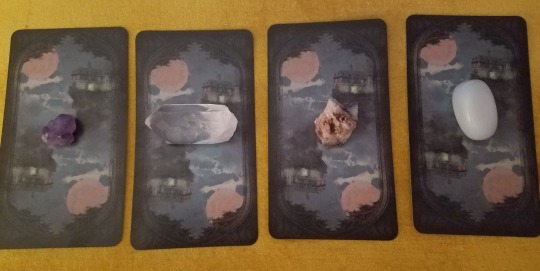
Okay, so it goes:
Pile 1: Amethyst
Pile 2: Clear Quartz
Pile 3: We’re calling this the Pink/Gold Rock. I found it in an old jewelry box, and I’m still trying to figure out what it is.
Pile 4: Opalite
So, again. Pick whatever calls to you. You can have more than one.
Pile 1: Amethyst

New Moon in Aries, Waxing Moon, Ace of Wands, Wheel of Fortune, King of wands rx, 10 of pentacles reversed, Temperance and 5 of wands, and algiz.
“I get so far, so fast.” - So Far, So Fast by The National
This pile seemed to be more work/creativity themed.
You're feeling inspired with new ideas. You're being advised to put these plans into action because you're on the right path. Though, you may be feeling impatient and want to jump right in. Maybe you feel that you're not quite strong enough to do so, but you are. All that you want is possible, you just need to work for it. Remember not to go too fast and to take time out for your loved ones. Also, be smart with your finances in this time. However, things are in the universes hands, so luck is definitely on your side. For some, you may be meeting someone new. This can be romantic or platonic. They may be able to help you with these new ideas. For others, you may be dealing with an overbearing boss or authority figure. Stand your ground, but don't get too defensive and be kind (I know that really sucks because my first instinct is to chew someone out). But remember, luck is on your side, so all will work out in the end.
Pile 2: Clear Quartz
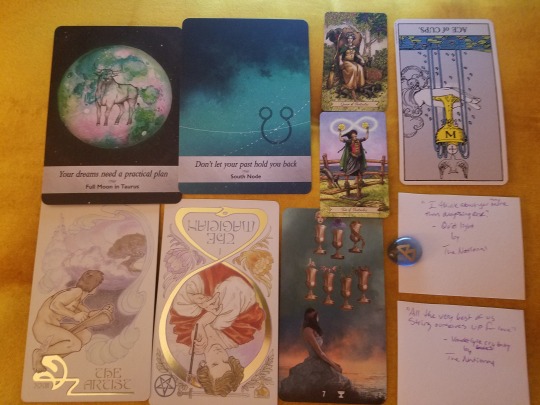
Full Moon in Taurus, South Node, Ace of Cups reversed, Two of Pentacles, Queen of Pentacles, The Artist, The Magician reversed, 7 of cups, berkana.
"I think about you way more than anything else." - Quiet Light By The National
"All the very best of us string ourselves up for love." - Vanderlyle Crybaby Geeks by the National
Oh boy. I sense heartbreak in this pile.
The biggest message I'm getting with this pile is that you're doubting your self-worth. This could have stemmed from a situation involving a heartbreak. I think some of you may have been cheated on (take what resonates).
Others may have gotten into a relationship that seemed promising, only for it to turn out not so great. You may have rushed into things with unrealistic expectations, or found that it was hard to balance this relationship with the rest of your life.
And for others, you may be pursuing something or someone that is actually quite toxic. You've created an unhealthy attachment towards this situation or person, and you need to step back and reevaluate things. The lyrics from Quiet Light, "I think about you way more than anything else," as well as the card South Node suggest this. I'm not saying this is a horrible thing. We all have our obsessions. It's just that we need to figure out which ones are healthy and which ones aren't.
Whichever applies to you, there are a few things you need to know:
One, you need to take a step back and figure out what it is exactly you want. You need a plan. Whether this be a situation involving money or a person, you need to figure out what actions you need to take. Do not rush into things. It's not the time to do so.
Secondly, listen to your intuition. If you're with someone and something feels off, then this is probably not the situation for you. You need to slow down and listen. Chances are, you already know what you need to know, you're just not paying attention.
And lastly, the Full Moon in Taurus talks about Law of Attraction. I'm not going to get into that, but there's something it says in the guide book for this card that I think applies to this: "Value yourself and others will value you too." Trust me, I know how hard it is to get out of a depressive state. I've been depressed the majority of my life. However, once I started trying to be kinder to myself and tried harder to stop doubting myself, I found myself feeling better. I'm not saying this is the end-all-be-all, or that this is going to work for everyone (I think it would be total bullshit to say that, honestly), but what I am saying is that you can program your mind to be nicer. Yes, I still have bad days, but they're less frequent. Life is not all rainbows and roses, but with a little bit of effort, it can have a few more rainbows and roses.
Whatever situation you're in, I'm sorry. Know this: There is a new start within this situation. You can choose to start new. You can choose to free yourself of this toxic situation. I think this choice gives you power. It won't happen overnight, but an effort can help it happen. You don't deserve to be in this situation. Know that you're not alone (like seriously, if you need to talk, feel free to dm me!) Know that "All the very best of us string ourselves up for love". So, again. You're not alone. Don't let this get you down.
Sorry if this was kind of heavy, but apparently it needed to come through to someone. Maybe this was what you needed to hear to realize what kind of a situation you're in.
Pile 3: Pink/Gold Rock

Full Moon, Seven of Swords, 3 of pentacles, Death reversed, The World, Queen of Cups, Four of Swords and Ansuz (A) rune.
"There's a little bit of hell in everyone." - Rylan by The National
"I'm addicted to the soundtrack. I need the noise." - Don’t Know Yet by Silversun Pickups
This group has a habit of keeping bad habits. It's okay, we all are there once and awhile. The problem is that you've gotten too comfortable where you're at. You've been stagnant, resisting the change. But, the thing is, when we allow ourselves to become stagnant, we grow apathetic. Is that a life worth living? This refusal to let go of bad habits and even obsessions will not end this chapter of your life. Instead, you'll be stuck reading the same three sentences over and over and none of it is going to register in your brain. You need to work on letting go of the negative and allow change to come in.
Some of you may need to work on forgiving yourself and others, as well as stop needing to do it all alone. You may need to collaborate with others in order to work through this change. Some of you are just being hardheaded and sneaky. Don't be that way. Honestly, just Death Reversed and Seven of Swords suggest this, but I also have a feeling that one of you needs to hear this. Circling back to the thought about not needing to do it alone, this applies to you especially. You need to be open about your emotions and thoughts. Work through this with someone else.
Others may need to take a break. Clear your mind. You're ignoring your intuition. Clearing your mind may help you quiet all those doubts you have, enabling you to trust your gut.
Overall, however, a new chapter is beginning. The World and Full Moon signal cycles ending. You're in this stage. It's up to you to be ready. Do you want to keep going back a few pages to reread what you missed while you were repeating those sentences? Or do you want to be able to finish this book and start another one? You have everything you need available to you; whether it's within yourself, or by working with others, it's up to you.
Pile #4: Opalite

Full Moon in Aries, The Lovers, The World, Ace of Pentacles, Seven of Cups, The Tower, Page of Swords, Page of Wands, 8 of Swords, Hagalaz
"Don't you know, someday, somebody will come find you?" - So Far, So Fast by the National
"Guardian Angel, what do you see? I have tripped on all of your signs." - Romance Languages #1 by Cold War Kids
You are so smart, but you're afraid of the unknown and that's holding you back. You're terrified of what the future brings, so you allow yourself to stay stuck in this mental cage. Living in your daydreams instead of acting them out. You have a curious mind, always striving to learn new things. You're also extremely insightful, and usually you're really good at communicating. But this fear is holding you back, making you feel unfocused and unable to use your voice. I see that some of you may need to make a decision about some sort of union. Maybe this is about the joining of ideas, or a relationship. Whatever this is, it offers stability and the end of a hard chapter. But, to get here, you need to take the blindfold off and free yourself.
You're ignoring all of the signs sent to you that it’s time to change, and because of this you're going to experience a tower moment. You have built a foundation that is not stable, and it's going to fall down. It may come as some shocking revelation. Or something painful. I do think this tower moment is avoidable if you already know what this decision is and can act on it, but if not it's out of your control. Once it's happened be building your foundation back up. Just remember this: you're not trapped, you've only convinced yourself this.
Hope something in this resonated! I spent a lot of time on this and now I feel like I could sleep for days :( Also, still really in need of more lyrics outside of The National...I swear there’s more in the deck, but those seem to really want to come out these past weeks!
20 notes
·
View notes
Text
Discussion: The Surprising Sexuality of Bella Swan
To read this post on my blog instead, click here!
Blanket warning: This post will be discussing sex and sexual activity. Bella Swan is a minor in the beginning of the Twilight Saga, and thus this discussion concerns the sexuality of teenagers.
Bella Swan and her sexual awakening
When we first meet Bella in Twilight, she can be described as a pretty sexless and anti-romantic person. We find out through her experiences in the Twilight Saga that she’s never gone on dates, never had anyone express explicit attraction to her, and that Edward Cullen is her first real crush and love interest. She seems pretty analytical, all things considered, discussing her mother’s relationships with her father and stepfather pretty distantly. While she can almost understand attraction–pointing out that when her parents were young and more attractive she can almost understand why they rushed into marriage–she doesn’t openly acknowledge attraction as a motivation for anything until dealing with Edward.
Bella Swan has a very clear sexual awakening in Twilight. The first time she kisses Edward, she describes herself as burning up and suddenly losing control. In fact, throughout the rest of the series this is a common theme. Edward is constantly having to keep their kissing as chaste as possible to protect Bella from his dangerous venom (and his bloodlust) while Bella regularly describes herself as latching onto him, pushing him to go further. Bella experiences tangible sexual desire for Edward and continually tries to act on it, despite Edward’s fears and trepidation. We like to make memes and joke about how dedicated Bella was to having sex with him in Breaking Dawn, but that was just the culmination of a lot of encounters in which Bella’s desire and lust drive their physical interactions.
Bella’s autonomy versus Edward’s
This was an interesting and occasionally disconcerting aspect of the treatment of sex in the Saga. Edward asserts repeatedly that it’s too dangerous to do more than kiss and that he won’t risk it with Bella. He also later on asserts his desire to wait for marriage, placing his sexual autonomy in the way of Bella’s desires. This is actually surprising in a lot of ways. First and most obvious is the subversion of expectations. A lot of YA and New Adult fiction places women in the shoes of the autonomy debate, putting their desire to wait for marriage, love, or another important milestone before having sex for the first time (or just the first time with their partner) out as the obstacle that the man they are seeing must respect. While I don’t think it was Meyer’s intention to comment on the particularly distasteful way society ignores male sexual autonomy and the right of men to say no to sex, it’s still an unusual subversion of societal expectation.
The next reason I find Bella’s sexual desire and lack of care for marriage interesting is because of Meyer’s background. Stephenie Meyer is a Mormon, and the Mormon culture generally encourages waiting until marriage for women and has strict rules regulating sexuality for all young people in general. We see in other parts of Meyer’s writing where the Mormon values come into play, so it’s ultimately very surprising that the main POV character, Bella, who is largely portrayed as mature and wiser than her peers should be pushing for premarital sex against a man’s wishes. She ends up only agreeing to marry Edward because she wants to sleep with him, and a little bit because she wants to be with him forever. She figures their relationship will continue regardless of marriage but his conditions for sex are what finally convince her to marry at all. This is again a subversion of the usual expectations.
I also find Edward’s sexual autonomy interesting in the face of the almost sex positive Bella. Edward Cullen is a man that repeatedly says ‘no’ to sex with a willing partner because of his own values, regardless of which of those values are more powerfully motivating. He has no reason to fear being overpowered when Bella is a human, so he can and frequently does exercise his right to say “no” without fear of repercussions. After all, the biggest reason people will consent to a sexual encounter they don’t want is to avoid the potential consequences of saying otherwise. Edward resists Bella’s attempts to coerce or seduce him in part because he knows she cannot overpower him, as he is a vampire and can absolutely physically stop her if need be. Bella dances dangerously close to interfering with his autonomy by pushing him towards physical encounters he expresses discomfort with. And from Bella’s perspective, she doesn’t seem to be aware that she’s coming close to violating his consent. Again, I don’t think it was Meyer’s intention to point out that women are just as capable of violating sexual trust as men, but an interesting point nonetheless.
Sexuality in the rest of the cast
Sex is absolutely alluded to and explicitly discussed on occasion with regards to the rest of the cast–usually to reaffirm relationships. In particular, Rosalie and Emmett’s relationship is associated with implied sex and Jacob’s perspective in Breaking Dawn references implied sex as well. Unsurprisingly, outside of Bella and Edward’s direct discussions and engagements in sexual activity, sex is discussed without actually being discussed–probably due to the age of the intended audience and Meyer’s thoughts on premarital sex.
Rosalie and Emmett have a tempestuous and loving relationship, which Edward describes as having destroyed houses through sex. Rosalie and Emmett are the most conventionally attractive of the Cullens, and often come across as a heartbreakingly perfect couple. They love one another very much and go on elaborate honeymoon trips, frequently living separate from the rest of the Cullens as a married couple. Additionally, Rosalie’s story involves her assault leading to her death and her desire to have a family, specifically her wish for children. In many ways, Rosalie’s story is more grown up than the rest of the series in is tragedy and in her metaphorical struggle with infertility. It’s not wholly surprising for her character that she and her husband are the most clearly sexual of the characters, but it does stick out as unusually mature against the rest of the series.
Jacob’s perspective also reveals some implied discussions of sex. The first example comes when he himself goes to a park to deliberately attempt to find someone he can get over Bella with. The implication is pretty obvious: he intends to have a one nigh stand. That he doesn’t succeed can’t erase what seems pretty obvious. Thus we have a character without the hangups on premarital sex that Edward–the only other male character that expresses any degree of sexuality–has. Also, since much of the exposition relating to Imprinting is given by Jacob, Jacob does have to discuss sex to a certain degree.
Contradictory messages?
I’d say that as a YA author, having your eighteen-year-old protagonist marry straight out of high school and avoid premarital sex is making a pretty firm moral statement. I don’t know for certain if Meyer set out from the beginning to build a relationship with Bella and Edward that she hoped young girls would aspire to, or if she just couldn’t bring herself to put something she didn’t believe in into her books. From the commentary on the movie, I do know she was at least a little uncomfortable with Bella being sexualized as she was one of the people protesting how “sexy” Kristen Stewart looked during the scene where Edward kisses Bella in her bedroom. Despite this, Meyer wrote a pretty convincing sexual awakening for Bella’s character.
Up until Forks, Bella’s character motivation doesn’t include sex or relationships. She is pretty single-minded about taking care of her mother, and then a little bit about being a good kid. The implication is that before remarrying, Renee wasn’t very good about consistently paying bills and providing food, so Bella honestly had far more important things to worry about than boys (or girls). Her sexual awakening with Edward is actually a pretty interesting idea, then, because in Forks is the first time Bella has time to think about boys, relationships, and sex. And then Bella is repeatedly shut down in these urges by her partner, seemingly in an attempt to protect her. There are plenty of issues with Edward as a partner, we all know this (and I haven’t even read Midnight Sun yet), but I found his desire to save himself until marriage the least problematic thing about him.
How interesting is it that for three books we have the narrative of “Edward desires Bella but is scared of hurting her” before finally having “Edward’s personal choice for his sexuality is to save himself until marriage?” I would have much preferred if that had been out in the open, since without the discussion that takes place at the end of Eclipse, Bella seems to be the victim of being teased by Edward’s allure without ever being granted the payoff of more than a kiss–whatever vampiric danger reasons there are for not going further. Instead, we get the fact that Edward has been struggling with his preference for having sex after marriage without sharing this with Bella, who clearly was willing to respect that as she marries him for this reason. If Meyer was trying to portray premarital sex as a bad thing, she never really got around to it. Bella isn’t even considering sex until Eclipse, despite her growing sexuality, and the discussions she and Edward do have about it isn’t very respectful to the thoughts of either side of the issue.
Final thoughts
I know that it seems awfully pointless to discuss a niche topic in the context of a book series people aren’t enamored with, especially when it’s pretty clear the mos interesting parts of this were not the author’s intentions. I don’t think Stephenie Meyer intended for the Twilight craze to happen at all, especially when you look at the backlash that happened. While there are legitimate issues in the series–capitalizing on the Quileute tribe’s existence while also doing some pretty problematic things with the Quileute characters comes to mind–one thing that cannot be attributed to the series is the hatred of teenage girls that drove the hatred for the series. The vast majority of criticisms for this series came from people whose deep seated hatred of teenage girls led them to find every fault possible (except for the majority of the series’ actual faults). Needles to say, this backlash affected me in a number of ways as I was a teenage girl who initially liked Twilight.
This was not a conscious thought I had upon first reading, but I want us to consider being a teenage girl in a confusing world where half of popular media says relationships and making out and even sex are important and cool parts of being a teenager, while another half of popular media condemns teenage girls for exploring their sexuality however they may be comfortable. As a teenage girl, saving yourself is worthy of mockery and having sex regardless of the context is worthy of slut-shaming. To have a romance series endorsed by mothers as well as teenagers in which the teenage girl explores feeling sexual desire is pretty interesting. She’s not shamed for desiring Edward, it’s only natural after all. And the questions of consent and autonomy are danced around with his desire to save himself for marriage–an unintentional reminder that women are capable of sexual assault as well and that everyone deserves the safety to say “no.”
Do I think it’s revolutionary for Twilight to have included some of Bella’s sexual awakening? No. In fact, I think it’s one of the things that could have been improved if Meyer was a better writer or better re-writer to make a more impressive series. But I do think that Twilight is more notable for the deep hatred it inspired than its writing. I think it’s important to continue to discuss Twilight in the context of what it gave teenage girls and who opposed teenage girls having it. Edward wasn’t a great love interest, but one thing we can say for him is he never forced sex on Bella. He never pressured her, he wanted to wait for marriage. As a result, Bella’s sexual awakening is slower and paced out with her own growing desires and wants. She never has to rush through things because she isn’t having sex. And I think it’s good for teenage girls to have a character whose desires awaken in the first book but isn’t having sex until later, has sex with someone she stays together with and gets to grow with, and is never pressured into the sex.
3 notes
·
View notes
Text
Marina Willow Profile
I had to use this once I saw @hogwartsmysterystory AMAZING template!
-----------------
IDENTITY
-----------------
Name: Marina Madeline Willow
Gender: Female
Age: 15 (In most of my works)
Birth Date: 2/2/1973
Species: Human
Blood Status: Half-Blood (Father is a pure-blood, the mother is a Half-blood)
Sexuality: Bisexual
Alignment: Chaotic neutral
Ethnicity: Caucasian
Nationality: British
Residence: Willow Manor
Myer Briggs Personality Type: ENTP
---------------------------
THE MAGE
---------------------------
1st Wand: Acacia wand, 12 inches, unicorn hair core
Acacia wood:
A very unusual wand wood, which is found creates tricky wands that often refuse to produce magic for any but their owner, and also withhold their best effects from all but those most gifted. This sensitivity renders them difficult to place, and Ollivanders keeps only a small stock for those witches or wizards of sufficient subtlety, for acacia is not suited to what is commonly known as ‘bangs-and-smells’ magic. When well-matched, an acacia wand matches any for power, though it is often underrated due to the peculiarity of its temperament.
Unicorn hair core:
Unicorn hair generally produces the most consistent magic, and is least subject to fluctuations and blockages. Wands with unicorn cores are generally the most difficult to turn to the Dark Arts. They are the most faithful of all wands, and usually remain strongly attached to their first owner, irrespective of whether he or she was an accomplished witch or wizard.
Minor disadvantages of unicorn hair are that they do not make the most powerful wands (although the wand wood may compensate) and that they are prone to melancholy if seriously mishandled, meaning that the hair may ‘die’ and need replacing.
2nd Wand: 11-and-a-quarte inches, ebony wood, Hippogriff and Fwooper feather
Ebony wood:
This jet-black wand wood has an impressive appearance and reputation, being highly suited to all manner of combative magic, and to Transfiguration. Ebony is happiest in the hand of those with the courage to be themselves. Frequently non-conformist, highly individual or comfortable with the status of outsider, ebony wand owners have been found both among the ranks of the Order of the Phoenix and among the Death Eaters. In my experience the ebony wand’s perfect match is one who will hold fast to his or her beliefs, no matter what the external pressure, and will not be swayed lightly from their purpose.
Fwooper feather:
Fwooper feather wands are said to be a mark of ill omen for the wizards they bond to, as, like the birds they come from, they are rumored to slowly drive their wielder mad. Despite their poor reputation, they do well with Charms and Care of Magical Creatures. However, they have a near-inability to cast Quietus. They are commonly combined with another feather core, such as the phoenix for health or the hippogriff for stability.
Hippogriff feather:
Hippogriffs are noble animals with a reputation for not taking a slight. These wands require constant respect, and if the wielder does not give it, they can watch its formerly stable and versatile magic backfire on it. It is not the strongest core, but it is one of the most adaptable. These wands are most common amongst Gryffindors, but they are rare overall.
Animagus: Jaguar
Misc Magical Abilities: Legilimens
Boggart Form: A younger version of herself and her brother, clinging to each other in fear while a threathening shadow is towering above them.
Boggart meaning: A simple moment that makes her remember all the times Marina and her brother spent together, unable to trust anything in their own home, their own parents included.
Riddikulus Form: The shadow turns out to be their mother, who casts spells that create butterflies and other pretty things, leaving the siblings in awe.
Amortentia, what she smells like: Sea salt and lavender.
Amortentia, what she smells: Butterbeer, a smoldering fire and cinnamon.
Patronus: Jaguar
Patronus Memory: Besting the ice vault with her friends, being one step closer to her reunion with her brother.
Mirror of Erised: Her brother and her playing at the cliff sides near the manor, while their mother watches over them with a smile.
Specialized/Favourite Spells: Musicis Ludere (A spell that allows instruments to play whatever song the caster was thinking of without a musician) is her favourite spell in general. Her favourite combat spell is Bombarda.
-------------------------
APPEARANCE
-------------------------
Faceclaim: None.

Game Appearance:

Voice claim: Morgan Berry
Height: 173 cm
Weight: 58 kg
Eye Colour: Greyish green
Hair Colour: Brown, dyed purple passed her shoulders.
Skin Tone: Pale
Scarring: Scar on her left cheek from the fight with the ice knight in her fifth year and a burn mark on her back from the dragon in the portrait vault.
Inventory: Pet food, lots of empty notebooks, stuffed kneazel, at least 1 sweater, a walkman, a beanie and reading books.
------------------------
ALLEGIANCES
------------------------
Hogwarts House: Slytherin
Ilvermorny House: She would have been a Pukwudgie
Affiliations/Organizations: Hogwarts School of Witchcraft and Wizardry, Order of the Phoenix.
Professions: Cursebreaker at Gringotts, helper at the Willow home-away-from-home, her brother’s business.
------------------------------------------
HOGWARTS INFORMATION
------------------------------------------
Class Proficiencies:
Astronomy: Outstanding
Charms: Exceeds Expectations
DADA: Outstanding
Flying: Exceeds Expectations
Herbology: Dreadful
History of Magic: Acceptable
Potions: Exceeds Expectations
Transfiguration: Exceeds Expectations
Electives:
Care of Magical creatures: Acceptable
Divination: Exceeds Expectations
Extra-Curricular: Slytherin beater and prefect.
Favourite Professors: Professor Kettleburn. She adores his passion for his subject and can see herself in his recklessness when it comes to dealing with said passions. He might be a tad crazy but she enjoys talking to him and can often get away with misbehaving in his class.
Least Favourite Professors: Professor Snape. Marina enjoys challenging authority figures and has a strong sense of personal justice that sometimes goes against Hogwarts rules which rubs Snape the wrong way. She has gained some respect for him when she learned he distrusts Rakepick as well. To quote her exact words, "Well, turns out Snape is less of Dumbledore's bootlicker than we thought."
---------------------------
RELATIONSHIPS
---------------------------
Brother: Acacius "Jacob" Willow.
Marina and Acacius have a very loving and protective relationship. Being born with a neglectant mother and an abusive father, the two learned to rely on each other at a very young age. When Acacius started studying at Hogwarts, he made sure to teach Marina everything he learned during the holidays and the summer.
Much like his younger sister, Acacius is not one to look away from injustice, having to watch his family suffer from his own father’s cruelty for so long. Thanks to the support of Duncan Ashe and Olivia Green, he learned how to stand up to his father and how to quietly rebel against other sorts of authority figures, something he passed onto Marina.
Acacius tends to say ‘fuck it,’ when someone talks shit about his family or muggleborns and just fight them the muggle way. He finds it a good way to get his aggression out but it got him into loads of trouble and a reputation as a delinquent at Hogwarts. It was one of the few things he didn’t pass onto his baby sister.
Father: Emeric Lorenzo Willow
Emeric is a faithful follower of Voldemort, his ambition of furthering his family legacy based on power instead of blood purity being the only thing more powerful.
He married Marina’s mother merely for the natural born skill of legilemncy that ran trough her family, hoping it would pass onto their childeren. As far as most of the wizarding world knows, this marriage nor the childeren it produced exists. Emeric has another family elsewhere to keep up his reputation as a powerful and clean man.
He controlled his hidden family with fear and his connections, making a show of torturing aurors during Voldemort’s reign and forcing his childeren to watch.
The abuse was never physhical but mental torture, as a punishment for Acaius and Marina for not having legillmens abilities as far as he knows.
Mother: Abigail Kowalski-Willow.
Abigail is a witch who was born and raised in America and transferred to Hogwarts after an experiment gone wrong and got her expelled from Ilvermorny.
A naïve yet determinded soul who enjoyed using her legilemens abilities whenever possible, but her ambitions got her into huge financial debt after graduating from Hogwarts.
Enamored with Emeric’s affections and interested in his wealth, she agreed to marry him after a few months of flirting.
When Acacius hid his talent from Emeric, the wizard took his frustrations out on Abigail, torturing her with the cruciatus curse. By the time Marina was born, their mother had passed the brink of insanity. Neither of the kids truly got to know their mother and never learned they got their curiosity and determination from her.
Other Siblings: To be Revealed :3
Love Interest:
Canon love interest: Jae Kim
The two of them had met during detention and connected by making fun of professor Snape. When the two gradually started hanging out more often they bonded further about their authority defying traits and humor.
The two had been flirting quite often, sometimes even kissing one another on the cheek or forehead, or cuddling in one of their common rooms, but they both played it off on them just joking around,afraid of rejection from the other.
It wasn’t until the Circle of Khanna was estabalished when Jae decided to act on his feelings, but Marina was sadly emotionally unavailable. However, once she worked trough her grief and finished the quest for the vaults, they began a relationship in their seventh year.
Friends with Benefits: Marina and Merula had an agreement that lasted from their sixth year until the first half of their seventh year. Eventually Merula broke things off cause she knew the relationship wouldn’t go anywhere and they parted ways. Marina rediscovered her feelings for Jae Kim a few months later.
MC love interests:
Molly darling ( @mollydarling-hphm ) :
Marina is ride or die for her girl, simple as that. You have a problem with Molly? Marina would like to know your location. They’re the equivelent of “Don’t mess with my badger or you’ll never see the light of day again.”
Best Friends: Rowan Khanna and Ben Copper.
Rival: Merula Snyde and Acacius Willow
-She never truly saw Merula as a rival, more as if they were two sides of the same coin
-Jacob made himself her rival the moment he refused to work together on finding the vaults
Enemy: Rakepick and R
Dormmates: Rowan Khanna, Merula Snyde, Liz Tuttle and Night Rhea ( @nightrhea-hphm )
Pets: Fritzgerald (Her kneazle) and Tiberius (her owl)
Closest Canon Friends: Merula, Rowan and Ben.
Closest MC Friends: Stephanie Alexeev, ( @hanihonii ) Helene Adler ( @heleneplays , Alice Beaumont ( @mizutoyama ), Luna Silvermore ( @lunasilvermore ), Kyril Vasiley ( @kyril-hphm ), Samantha O’Connell ( @samshogwarts ) Feen McKenzie ( @sam-winchester-is-my-bitch )
----------------------------------------
BACKGROUND/HISTORY
----------------------------------------
Born to Emeric and Abigail Willow, the younger sister of Acacius "Jacob."
A sadistic, death eater for a father and a mentally unstable legilimens for a mother. The first part of her life Marina always kept to Acacius and her mother, scared to leave the house and unable to befriend the kids of her father's associates. The few happy moments she had in her early childhood was whenever her father was working or at a meeting and her mother enchanted the music instruments to play her favourite lullaby as she and Acacius danced and chased each other around the ballroom.
The order of the Phoenix managed to capture Emeric Willow before Voldemort’s defeat at the Potter house. By then Acacius had already dissapeared, leaving Marina alone in an empty household. The few house elves that worked there took care of her as Abigail was taken into St. Mungo’s.
--------------------------
PERSONALITY
---------------------------
Positive traits: Curious, Determined, Ambitious, quick thinker, understanding and protective.
Negative traits: Cynical, distrusting, rebellious, impulsive, sarcastic, wants to do everything by herself.
-------------
MISC
-------------
-Marina was against going after the cursed vault at first but had a change of heart in her second year when she found a secret attic in the manor filled with Acacius’s stuff.
-She's so busy she often forgets to eat.
-She’s affectionate
#hogwarts mystery mc#hogwarts mystery#harry potter hogwarts game#hogwarts mc#marina willow#character sheet#character template
25 notes
·
View notes
Text
Understanding Stages of Grief applied to Parents Affected by Parental Child Abduction / Alienation / Retention
“The death of a child is indisputably one of the most incredibly horrible tragedies one can imagine. Whether by sudden accidental circumstance, or by a more lengthy cause as in illness, the loss of a child is undeniably painful to experience. Painful to the parents, parents to the family, and painful to anyone related to the child. Never knowing the laughter of that child again or the tears, the joys and the accomplishments is a pain no parent should ever have to endure, and yet it happens. No one might be to blame. It can just happen”. (Tim Line)
Imagine a similar pain and the same sense of loss, with one exception-the parent is very much aware that the child is alive.
The effects of Parental Alienation, Parental Child Abduction and retention are very similar to the loss of a child in some other way.
For clarity, I am not saying this is the same as a parent that has lost a child through sudden death. I know parents who have lost their child and do not wish to understate the heartbreak they have endured and continue to do so without any hope of a resolution. However, the "grieving process" can have some similarities.
This feeling of bereavement can also affect the child that an abducting/alienating parent claims to love and can have serious emotional scars that can remain for a long period of time - If not for a lifetime.
Yet, parental child abduction and parental alienation remain as silent abuses that the effects never seem to be fully understood unless you or your family have to cope with this trauma yourselves.
Even parents that are lucky enough to have any contact whatsoever with their children, Parental Alienation, where a custodial parent maliciously tries to destroy the relationship between the child and target parent, rips the innocent child from their arms slowly. They witness the suffering. They witness the effects but they feel powerless to do anything about it.
The very sad part of this is it is not unique. There are hundreds of thousands of children and parents affected by Parental alienation and also thousands of cases involving parental child abduction but it is only recently that law professionals are starting to sit up and take notice of the traumatic emotional damage that this can cause target families and children.
If you are a parent, spend a moment to look at your children and imagine what it would be like if you woke tomorrow morning to find that they are not there and you have no idea where they have been taken to or if you will ever see them again. Imagine the minefield of legal litigation required to locate and reunite with your children once they have been found to have been abducted abroad?
Imagine pleading for help from authorities, courts, family, friends and groups but they are powerless or reluctant to help to reunite you with your child and can even facilitate the abduction, alienation and retention by their inaction.
People find it very difficult to understand the effects on a target parent. Many feel that eventually, time should allow you to "get over it" and just carry on with life but it is not that simple.
Let us look at an extended Kübler-Ross model that tries to explain the stages of grieving and see how that can be applied to a parent who is retained from their children’s lives.
Stage 1: SHOCK AND DENIAL.
In many cases, a target parent can actually identify the signs that abduction and alienation might occur but they are often given false reassurances that this will not happen or is not happening by authorities and legal professionals. When it does, the initial trauma is one of shock and numbness. However, there is a belief that everybody around will be just as horrified at the situation and will do everything they can to find a resolution to return the child to the situation prior to abduction/retention
Stage 2: EMOTIONS ERUPT
Unlike a bereavement resulting from death, the shock never really passes as a target parent fails to understand how the situation could have occurred and begins questioning people around them. One minute they were a loving parent sharing their children’s lives and the next, it is taken away from them, often through no or little fault of the affected parent. Emotions can overflow their usual boundaries. They are expressed in ways ranging from wrenching sobs to gentle tears.
The strongest try to look for a resolution quickly and place their trust in authorities, lawyers, courts and organisations to help them resolve the situation. These emotions heighten even further if heinous “tactics” are used by the other parent to achieve their alienating objectives such as false allegations. This stage in the grieving process is also without end.
Stage 3: ANGER
Mixed with the hurt, many people feel angry. “How could the other parent do this to them?”, “Why aren’t people doing enough to help?”, in cases where false allegations are used as a mechanism to aliene and retain their child, “Why are the authorities listening to them? This is NOT me that they are talking about!” They sometimes want to retaliate. Although the anger is towards the other parent for their actions, it can also be transferred to other areas such as the lawyers and authorities for their apathy and inaction. The anger can also be misdirected at people closest to the target parent through their absolute despair of the situation and this can affect friendships, relationships and support. This anger one feels can reappear so once again is another stage in the process than can be without end
Stage 4: SICKNESS
Often the body acts out the pain being felt through actual physical symptoms. Nausea, headaches, diarrhoea, extreme fatigue, lack of sleep are common. In some cases, panic attacks can occur that can be compared to Post Traumatic Stress Disorder (PTSD) especially in situation such as family court proceedings. Once again, as these litigation processes can be ongoing, so can recurrences of the sickness stage.
Stage 5: PANIC
Along with a time of sickness and emotional upset, people begin to realise that they aren’t acting like themselves anymore. They begin to worry, wondering if they are becoming mentally ill. They frequently ask themselves “What is happening to me?”. From the outsiders point of view, this is often met with wrongful judgement. They can lose sight of the person they really are and just start to see the shell of the person that the target parent might be becoming without the help to keep them strong and focused. The longer it takes for resolution, the harder it is for the target parent to cope. Apathy often occurs in other aspects of the target parents lives that could affect their work and personal lives.
Stage 6: GUILT
Personal guilt feelings build up as people wonder whether they are somehow to blame for the situation they find themselves in. They ask themselves if they could have done something to make it different…. “if only . . .”
Stage 7: DEPRESSION AND LONELINESS
The pain of their loss often causes people to withdraw into themselves. As the depression deepens, friends and family find it harder to draw the person out, to talk them into participating in regular activities again. Many suffer detachment issues in their relationships with others. Mixed with the other stages that are still present in some form, without understanding of family and friends, it can appear as though the target parent does not WANT to be around people who care when it is, in fact, quite the opposite.
Stage 8: RE-ENTRY TROUBLES
Once the effort is made to get back into the normal routine, the pain of loss makes it difficult to be as trusting and open as before the loss. Suspicion must be battled constantly. Friends and families are tested again and again.
Stage 9: HOPE
Only the very strongest emotionally of the target parents can maintain this. They focus on areas that might be able to help others in a similar situation. They identify the failures in the system that do not seem to protect and try to do something about it. Some try to become advocates or write a book about their experiences. Raise awareness in whatever way they can. Some affected parents can never reach this stage as they feel defeated, betrayed and can even result in major depression or even suicide.
Stage 10: ACCEPTING AND AFFIRMING REALITY
Sadly, a parent who continues to be subjected to alienation and retention can never fully reach this stage. Many are forced into a position where they have to box all of the emotions that they feel and “give up” on finding a solution as a means of self preservation. Although they do not give up on their love for their children, they give up hope of ever being a parent to that child again.
Conclusion
In conclusion to this short paper, it appears that when a child is retained, alienated and/or abducted the grieving processes begins but can NEVER end until there is resolution. Unfortunately, in many cases, this forced "living bereavement" goes without deterrent or accountability in the family courts or by authorities which continues to subject families to this abuse.
1 note
·
View note
Text
Extensive Les Mis fanon character interpretation Discourse under the cut, read at your own risk
I’ve been thinking about this for an embarrassingly long while and I know I’m not the best person to discuss this, because talking about Les Mis is like opening this huge box of things which you need to be a scholar to be prepared to back up fully. That’s why this is under ‘read more’, because I am aware and accept my own ignorance and limitations BUT I also think this is an interesting topic, so here we go.
One thing that has been increasingly bothering me in what we can call “the current fanon interpretation” of Les Mis, namely the fanon interpretation that arose/became popular post 2012 movie and through tumblr/ao3, is this idea that Enjolras is a toxic person and he tramples selfishly over people’s feelings.
This is something that escalates sometimes a lot, even to a point in which I had to one time witness someone on tumblr dot com saying that Montparnasse was a better person and preferable ship partner than Enjolras which made me just stop and stare at the screen for a long moment trying to comprehend where this was coming from.
There was an escalating fandom acceptance of Enjolras being incredibly selfish towards people in the benefit of “his cause”, which makes him a sort of childish persona who is unable to take care of himself and who doesn’t understand people’s feelings in the slightest.
This is 99.999999% of the time paired with Grantaire’s interpretation, which I think is a key to understanding why this happened in the first place and why it evolved into turning Enjolras into an unfeeling person who understands nothing of human emotions.
And I think it’s a fascinating thing to think about and deconstruct, even if I’m not fond of the interpretation.
I think that Grantaire is, to the current Les Mis fandom (more so than ever before, but I’ll talk about that in a bit), what Éponine was to the musical fandom (and creators) in the 80s/90s.
A big problem I have with Éponine’s interpretation in the musical (and again, I’m in no way the most qualified person to talk about this and my word should be taken with a bucket of salt) is that she was taken as the victim in a made up “love triangle” that never was. The musical uses Éponine as a tragic figure whose love for Marius is depicted as wholesome and romanticized, whereas Cosette is reduced to a Cinderella story and a very shallow characterization once she becomes an adult (let’s remember her storyline is reduced to being an object to Fantine’s hope, Valejan’s salvation and Marius’s survival without much of an own agency since her entire plot and growth and storyline are cut after she’s rescued by Valjean). So the musical puts the two against each other as the two “options” Marius has, but doesn’t focus on Marius and Cosette’s relationship aside from a couple songs and moments, instead gives Éponine a solo on how much she’s unrequited and a death scene where the entire plot point of her wanting Marius to go to the barricade is erased.
Éponine’s character complexity is reduced to the character people is meant to feel for and women are meant to root for because she is “the underdog”. And, most often that not, that’s what love triangles do, the underdog is the one people root for because they’re meant to identify with their unfair situation and their tough luck.
This is a disservice to Éponine and to Cosette, who are much more complex than this and it’s something most people tend to let pass because the musical didn’t have as much time to expand, but it isn’t a matter of amount of content depicted but on which perspective to focus and what lens to see the story through.
Ask anyone who was a fan of the musical in the 80s and who hasn’t read the book or seen any other adaptation who they prefer between Éponine and Cosette, if you don’t believe me. I mean, On My Own was adopted as the “anthem of the female friendzone” as cringe-y as hell as that sounds.
Anyway, what does that have to do with Grantaire, you ask me? Well, first of, it’s very easy to see how modern fandom tends to interpret Grantaire and Éponine as friends, really really close to one another. This is a very common occurrence that results from the comparison of their situations and strengthens my point, but it’s not where I’m going with exactly.
What I think that has happened with Grantaire, and here is the anthropological/sociological hypothesis nobody asked for, is that he became the embraced character for the current tumblr/ao3 fandom as Éponine was for that 80s/90s musical fandom, due to the interpretation he is given, to satisfy certain fandom needs that are current. Which isn’t wrong in itself, it’s what happens with archetypes all the time (and a subject of study for me, which is why this interests me specifically, I’m currently writing two projects that involve literary archetypes, but I digress).
Grantaire’s drunkenness and confrontational nature were turned into coping mechanisms for a battle with severe depression, in most cases, or other underlying mental illnesses. Which isn’t that much of a long shot in itself, all things considered, it has a canon basis to stand on, but creates a complex case when it comes to the consequences of the things he does.
Fanon transformed Grantaire’s confrontational nature into a constant cry for help, one which Enjolras most often, if not almost always, ignores. Sometimes out of being oblivious, sometimes out of selfishness, sometimes out of derision and contempt. Sometimes all of them at once.
And one consequence of this was that it started becoming more and more often for Grantaire’s actions to be fully embraced by fandom because he was starting to be conceived as a vessel for a lot of self-reflection. It isn’t completely random that Grantaire’s characterization became more inclined towards the narrative of mental illness and conflicting coping mechanisms, because they are all subjects we talk about more openly now than ever before, especially in the platforms where this interpretation is more often seen, namely tumblr and ao3. Not that they didn’t exist before, but that they’re discussed more freely now, especially through the idea of safe zones that social media and the internet in general allow.
What Éponine’s character was for the female fandom of the 80s looking for an underdog to root for, in a market filled with products about the female underdog who was unrequited and deserved to be loved, Grantaire somewhat became to a fandom needing to express this idea of existential emptiness and overall doubt about not only one’s state of mind but also where one is going with their life when others seem so certain about it.
And talking about being certain about a life goal, what’s going in with Enjolras, meanwhile? I believe that, much like Grantaire’s fandom characterization having somewhere canon to stand on, Enjolras’s severity has some places where it came from which we can all clearly see. I am a little bit tired of how many times people use the “capable of being terrible” phrase at this point, and then there was the whole thing with Saint Just which I’m not getting into because this is already too long.
But, much like characters written to be two sides of the same coin, Enjolras and Grantaire tend to be connected to each other’s characterization. They were like that in canon, they were written to be a pair which influenced, directly or indirectly, the other, so it isn’t strange to see that in fanon interpretations, the two also go hand in hand. Pun very much intended.
The issue I have with Grantaire’s interpretation isn’t that his perspective is more directly viewed, or that fandom goes more in-depth with his underlying issues, but the fact that sometimes identification turns into idealization. It happens very frequently in writing (and not only in fic) that authors who see themselves reflected in a character tend to try to erase any blame from them in a way to channel a sense of embrace for their own actions, and that can be counterproductive to the character’s complexity.
Because it isn’t really the problems and hardship what make a character relatable, it is their growth which comes from learning, which, in turn, comes from making mistakes.
When Grantaire’s mistakes are characterized as reactions to things that are outside his capability to control, when they are seen as mechanisms of what anyone would do if they were in his place, Enjolras’s reactions to them turn not severe but unfair.
Suddenly, all of Grantaire’s mistakes, jokes, derision and his unfavorable actions are seen as a product of an inescapable situation, out of his control, which, in turn makes Enjolras’s anger unjust and an over-reaction. Which, paired with the fact that Enjolras’s “cause” varies from interpretation to interpretation (especially in modern contexts, which are the most popular among this generation of fandom, where the “cause” has to be determined from social and political contexts that tend to be very vague out of the global state of the world and the intersectionality of issues, which overlay in every one of them), makes him unfairly distant and overall incapable of feeling empathy.
Something that can be seen very clearly in the way in which, when it’s written as a ship, Enjolras often has to “choose” between Grantaire and “his cause”, whatever that is in each specific narrative.
More so than making Enjolras too severe, my problem is with his desensitization. I feel that making Grantaire a constant victim (out of fandom willingness to grab onto him as a vessel of current issues of the generation he represents due to his canon-ish age) makes Enjolras desensitized to human emotion, especially because, most often than not, it is only him who is represented as oblivious or uncaring, while the rest of the group understands and sometimes even defends Grantaire, in stances even turning their backs on Enjolras for that reason, which always baffles me, truly.
Enjolras is a very complex character and his actions are matter of many essays and interpretations, but one thing I don’t think he can be seen as is uncaring. Even less so uncaring towards human emotion. His constant inner turmoil during the barricade is something to behold and I always turn to his decision to execute Le Cabuc/Claquesous as one of my favorite parts in the entire thing, and the fact that he grieves his decision in the way he does is a proof of his emotional complexity and empathy.
I don’t have a problem with Enjolras’s severity or Grantaire’s motives, I have a problem with the simplification of their narratives into a judge and a victim, which I think is what leads to these conversations of toxicity among them, opening another bag of complications.
But even if it’s something that bothers me, it also fascinates me to see how these interpretations shift so much and how they change according to the audience that embraces the text at a certain point in time. How we charge it with additional symbolic value as we go, transforming it a bit with each read.
I want to clarify, very strongly and vehemently, that these ramblings are IN NO WAY meant as derision of fandom interpretation or anyone’s particular writing. I too have written Les Mis fics and have fallen into interpretative conundrums that now, with experience, I judge unfitting to my current views, some which I have deleted, others which are still around. So this is in no way a call out of any form, not at all.
It is also not to criticize Grantaire’s interpretation, as someone who suffers from mental illness myself, I find it not only positive but necessary the inclusion of these topics in writing, whether it is in fic form or in any other type.
I find this a fascinating topic because, like Tournier said: “In some masterpieces - and that is why they are first among universal literature - there is an incentive to create, an infection of the creative verb, a way to put in motion the creative process of readers. I confess that, for me, that is the peak of art”. That is the magic of works like Les Mis, that we can use them to see ourselves, no matter how much time has passed, and if these characters still help to see ourselves and our reality in a way in which we can observe it better, I think Hugo would be glad.
#les miserables#luly rambles#i was gonna be brief about this and I ended writing an essay whoops#i know i'm not the best person to talk about this but I have thoughts to share i guess idk#les mis#essay posts
172 notes
·
View notes
Text
Research: Draw Draw Draw Project.
Mike Parr Mark making artist
Parr's performances explore physical limits, memory and subjectivity. They often depict self mutilation or extreme physical feats.
Parr spent his childhood in rural Queensland, Australia. He was born with a deformed arm, and this physical feature is prominent within his art work.
Parr’s impression taking is a striking contrast, both emotionally and visually to his video/ installation work, composed of beautiful engravings featuring many different types of lines, using the mark making technique. Parr was fascinated with observation and the possibilities and responses of memory distortions.
Parr’s early work was designed to get a reaction from the audience, although he also focused on exploring issues of identity, memory and states of being. He particularly used his body as a performative tool, often using his prosthetic arm and testing his body’s physical limits through resistance challenges.
In the early 1980s he started a collection called “the self portrait project”, Parr’s self portrait studies first took the form of painstakingly hand drawn copies of performance photographs. Subsequent drawings acknowledge accidental blurs and smudges, with parr generating purposeful distortions through the introduction of a mirror and manipulating the grid.
Life after death collection, combines charcoal, pastel and acrylic on paper; it depicts the artist’s face over and over, in varying states of distortion, as though disappearing or disintegrating.



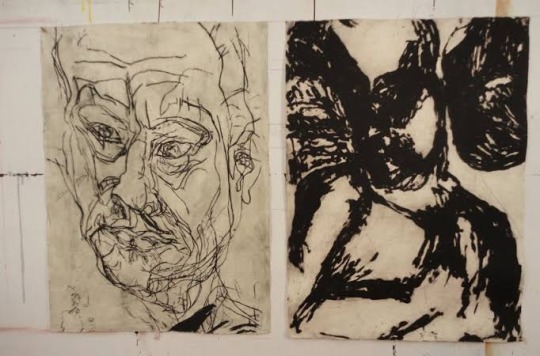
Paul Verdell
Is an American artist, who is specialized in drawing portraits of many different people that he can find as reference, by using different kinds of colors and lines with his crayons.
Verdell was born in Long Beach, California. At the age 13, his family moved to Fremont, Ohio.
Paul Verdell paints and draws a variety of people with plenty of personality. Like most artists, he has drawn since he was little, but didn’t make a real go of the medium until he was in his mid 20s. That he was decided to go back to school, enrolled in Bowling Green State university, and took a painting class when the first semester came around. Paul eventually developed his unique artistic style, by doing drawings, that him doesn’t consider that good, but he is comfortable with that style. His mark making technique is assertive, created with force and with energy. Paul’s work may seem as if it has loss control imbued within the lines, but his artworks are also vividly representative of the person or object he’s depicting; it’s delicate balance that he’s mastered without purposely pushing his style in a certain direction.
What I like most about his work, is his use of colors, with oil pastels , where he creates different tones on the skin of his characters, using the technique of mark making, which is perhaps more impressive, since it is a very different or unconventional technique for making portraits, that’s why it’s so interesting.
With time, he realized how much colour and expressiveness the textured medium adds to the canvas, and started to experimenting with more and more different types of colors.
The artist isn’t trying to make a statement with his work. In his words, “I’m just here to paint. The viewer can take whatever that want to take out of it”.
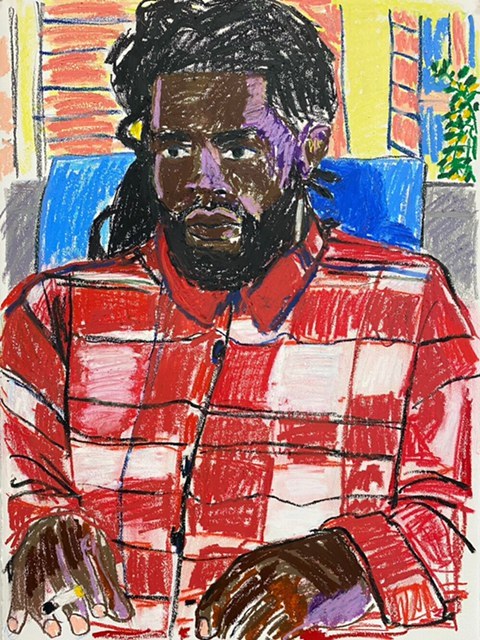

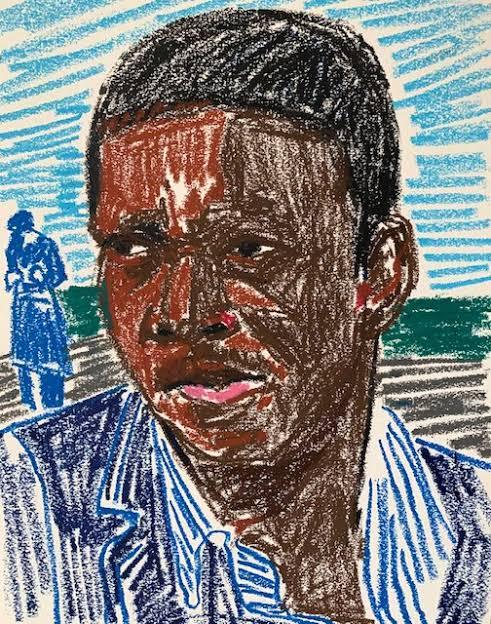
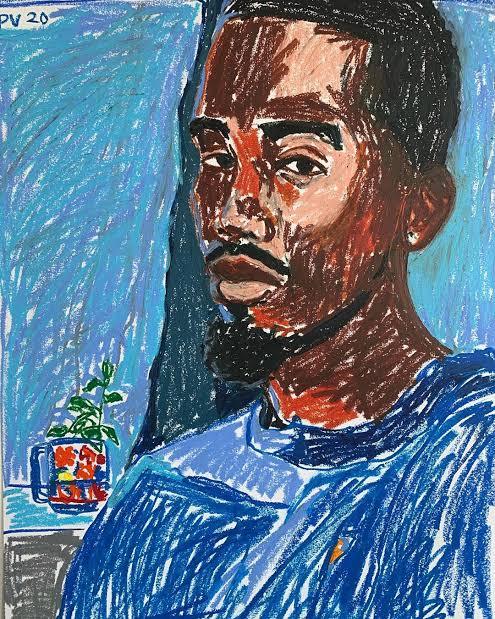
Saul Steinberg
Romanian artist by birth was one of the most important artists of 20th century. A designer and cartoonist in the publishing industry from 1936 to 1999, he spent a considerable part of the 20th century publishing in prominent magazines on the world stage, specially in the New York. The famous cover for the New Yorker that showed the view of the world according to the average American.
In his drawings, Steinberg’s lines seem to reinvent themselves as they progress, creating different kinds of shapes and sizes, sometimes using one single line.
Steinberg’s greatest contribution was his demonstration that the drawn lines is equivalent to thought. Indeed, Steinberg is rarely concerned with outward physical appearance and is much more interested in what and how people perceive what they see. His interest in the human psyche isn’t academic. His playful, childlike doodle quality maintains an elegant deftness that succinctly describes a wide range of subjects. His quirky way to draw, sometimes reminiscent of Dada art, also crossed over into the fine arts world.
much of the humor and mystery in his work occurs in the way he relates humanity’s lack of understanding.
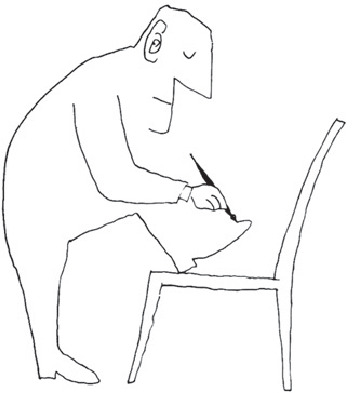
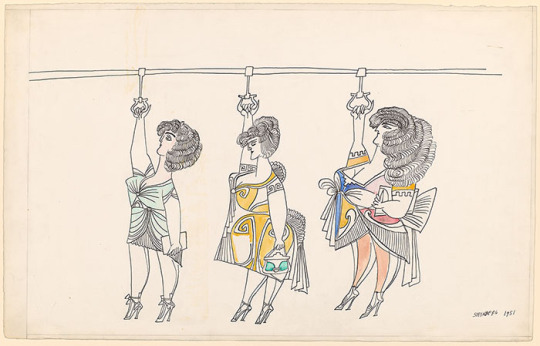
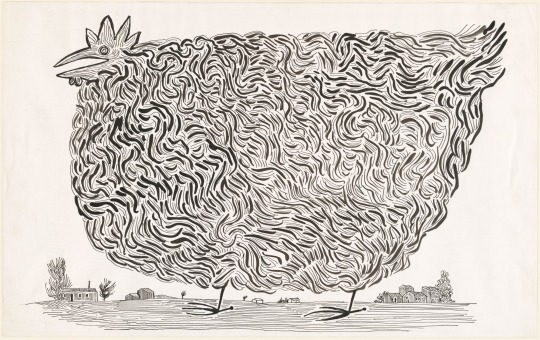
Urban Sketching
The drawings of urban spaces are gaining more and more admires, and this work certainly has a good baggage to please this audience, as it addresses a range of drawing techniques, which ranges from elementary theory to the more specific technique used by illustrators this modality.
Techniques and perspective tips combined with the composition tips presented in the work, are a combination that certainly makes all the difference when choosing and enhancing the scene that we will sketch, whether it be designing buildings, mansions, parks, people, animals, etc. the inclusion of the curved perspective is also another highlight, as it goes beyond the usual three vanishing points that the author usually address. The techniques, in this sense, are not many, but the author certainly selected those that generate the most impact. The watercolor for example, is his primarily tool, where he uses for the most of his drawings.
This book has been very useful for me for a long time, even today I use it as a reference. I always preferred to draw on my desk, with a reference photo. But I know that I need to let go, and learn to draw outside, just by watching, and trying to finish quickly.
I live in São Paulo for a while, and sometimes when I walk I always have a small sketchbook in my pocket and a watercolor kit. Sometimes I paint trees, sometimes buildings with interesting shapes and colors, from time to time some birds. Anyway, I learned a few things from this book, although I still prefer to draw in my studio, calm and do the drawing with all the time in the world, it is very important that I draw what is around me, so that I learn to train my eyes, in addition to drawing totally random things, which sometimes the internet cannot provide.



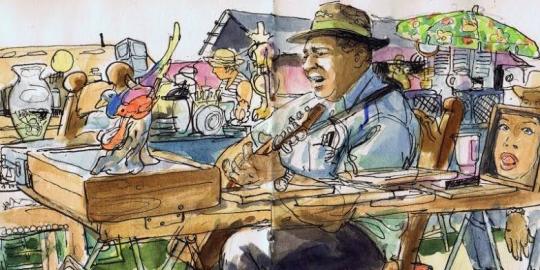
Alexander Calder Animal Sketching
Alexander Calder is a renowned sculptor and inventor of mobiles, and here he brings the simplicity of lines and spirit of movement to the art of animal sketching.
The purpose of the book is to help people like me to draw animals as we can see them.
Calder captures the emotions and attitudes of animals in a few quick lines, the person can quickly obtain a lasting groundwork in animal sketching.
This book really helped me, because I drew animal few times, and I was always thinking in the proportions and finalizing the drawing, but I learned that before doing that perfect drawing, I have to understand the movement and the poses, not necessarily making a masterpiece right in the begging, but train and have some fun on doing it.
This book contain several animal sketches, like cats, dogs, deers, cows, horses. All this animals doing different poses and actions for training.

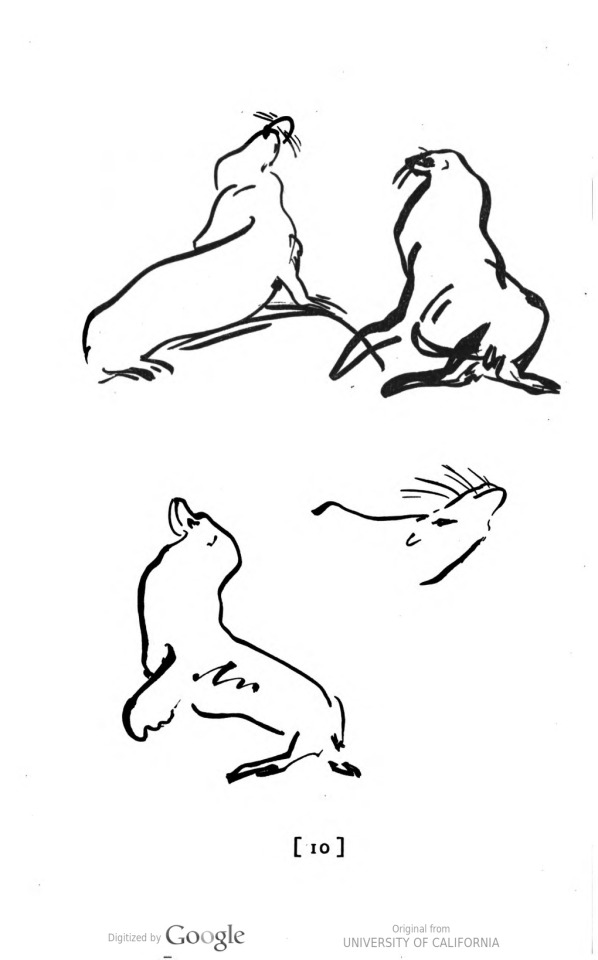
Juan Linares
Juan Linares is a Spanish illustrator and painter, who specializes in drawing mainly different environments (Urban sketching), from streets to buildings with a different style of architecture. He mainly understands the perspective and depth of the environment. Uses various types of materials, such as acrylic markers, even alcohol-based pens. But his preferred tool, of course, is watercolor, which he always uses, when walking in the streets of his city Barcelona, where he paints narrow streets, with the small bistros, from the famous La Sagrada Familia church made by Gaudi.
Linares says, that he’s been drawing professionally since 1984. Starting his architecture studies. He drew in sketchbooks, notebooks, and in blackboards. He has a preference in drawing food and buildings.
What I like about Linares's drawings, is the way he can put light and shadows, besides the buildings being magnificently well done, very carefully and calmly (he explains that if you are drawing in some environment it is good to be calm, and patience without feeling the need to finish quickly).
He has traveled to some places in the world, including Brazil itself, where he sketched the museum of Niterói, designed by the architect Oscar Niemeyer, besides the Christ the Redeemer in Rio de Janeiro.
Juan Linares is a great artist, and I really admire the passion he puts in each of his drawings. And I wish to see more of his works, of famous architectures of the world.

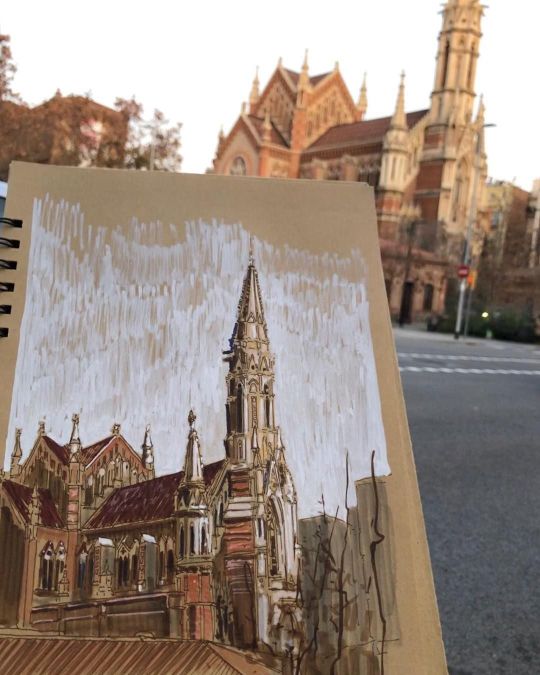

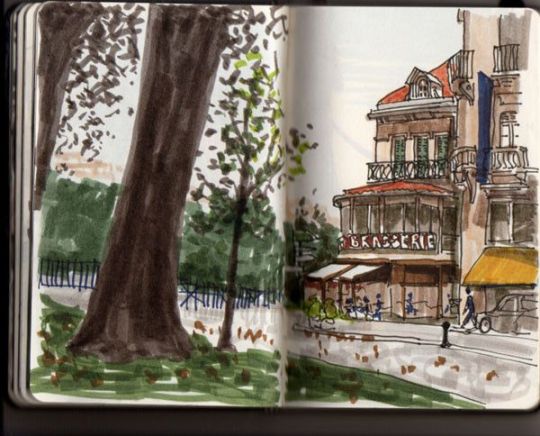

Laura Carlin
Laura Carlin was born is Glastonbury, England. She studied at Buckinghamshire university, followed by The Royal College of Art.
Laura has illustrated many children’s books for Walker Books Ltd, including The Iron Man by Ted Hughes which won many awards, specially praising for Laura’s illustrations.
She has also drawn for a whole host of publications including The New Yorker, The Guardian and Vogue, among many others.
Laura’s works frequently touches on emotionally complex subjects and adult themes of loss , social injustice and environmental change.
As an illustrator Carlin has worked with several contemporary children’s authors including Nicholas Davies for her book The Promise about a young thief whose life has changed after stealing a bag of acorns and Michael Morpurgo’s book The Kites are Flying ! , a story centered on the conflict between Israel and Palestine.
One of the reasons why, I like so much her work, it’s because she has the ability to convey a plethora of emotions through the smallest details on the pages, combining with childlike drawing style and with a sentimental narrative, it’s very brave of her, to do books for children, with such difficult themes to explore.
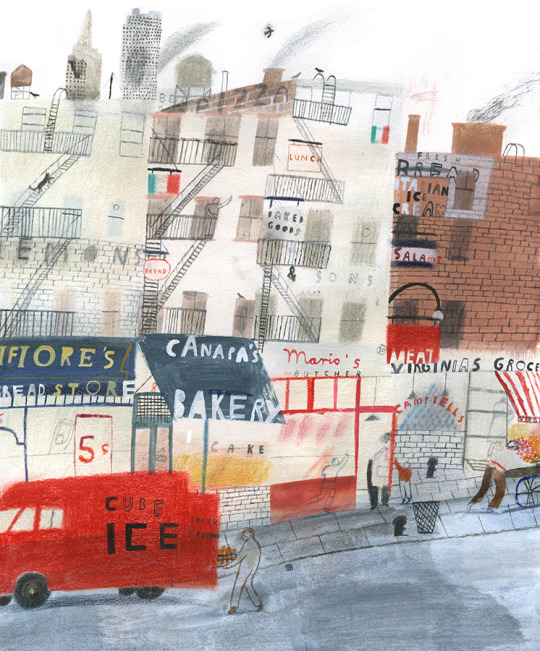
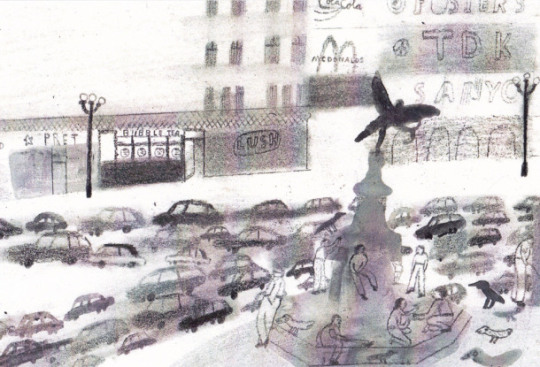
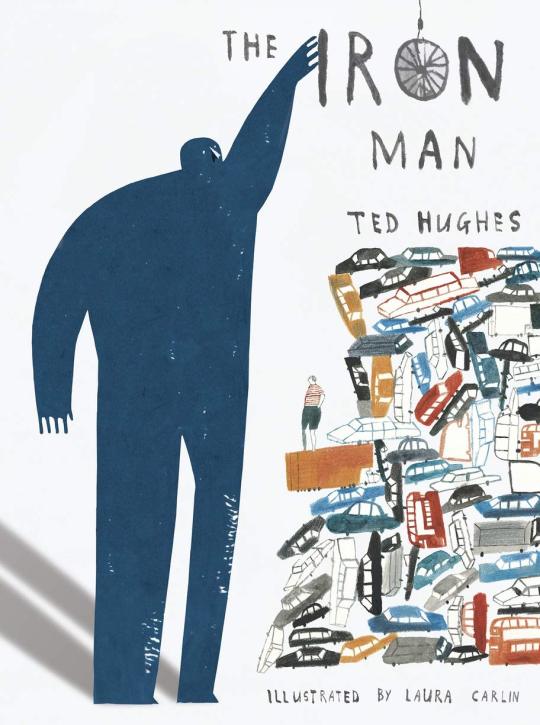

Research: Show and Tell Project
Frank Frazetta
Frank Frazetta was an American illustrator and painter, who became extremely well known for having defined the look, of the character Conan the Barbaro, created by Robert. E.Howard in the 1930s.
Frank was born in Brooklyn, New York, and from an early age he showed his skills as an artist. As a child, at the age of 8, he studied at a small art school called Brooklyn Academy of Fine Arts.
His illustrations are inspired by the great painters of the late 18th and 19th centuries, who portrayed mythological legends.
For me it’s not just the wonderful color palette he used, the wild and original streak or the phenomenal technique he developed. Of course, these things are fundamental, but in my understanding, the most important thing is that he defined practically everything we know in terms of visuals, mainly in the fields of fantasy, witchcraft, barbarism and even a little bit of science fiction.
His paintings defined some characters that we know today, like Tarzan and John carter, that he brought a new life to the characters of Burroughs, not to mention the images of Conan, who made the illustrator famous. Imagine that before him, the Sword and Sorcery look did not exist. The Conan that appeared on the covers of books since the 30s of the last century gets to laugh today. Frazetta was the first to understand the world created by Robert E. Howard.
The reason I chose frazetta as a reference is because I like fantastical worlds so much, and I love to learn anatomy, and frazzetta understood a lot of that, with his extremely vibrant colors, and extremely strong characters, who faced terrible monsters, who disturbed the peace.
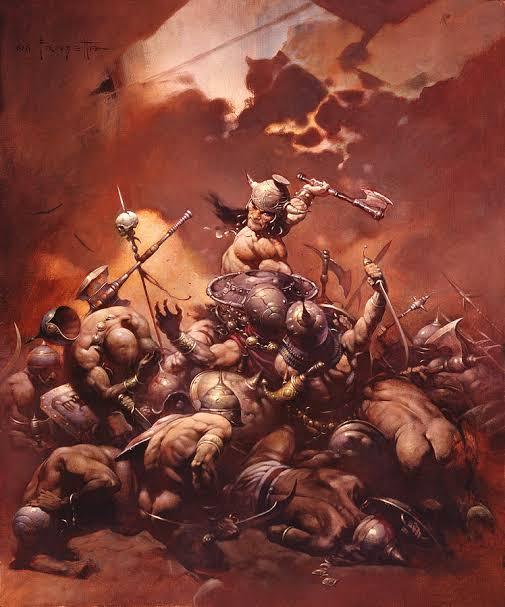

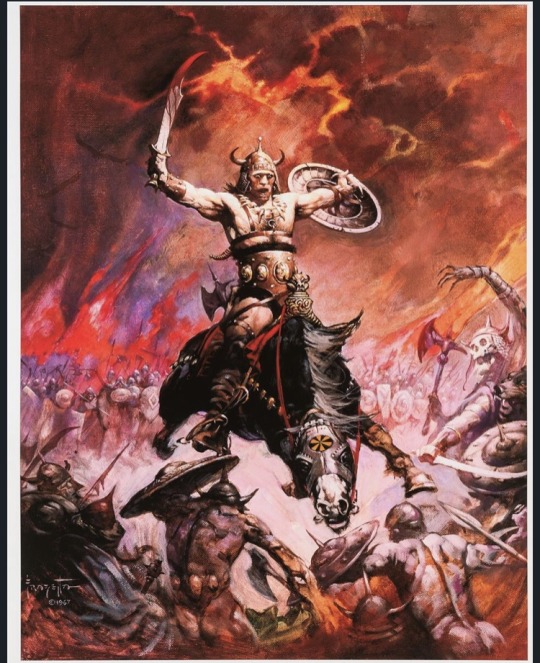


Claude Monet
Claude Monet is the main and most dedicated representative of the impressionist movement. He always preferred paintings outdoors, regardless of weather conditions,in order to capture all the effects of nature. Early in his career he was misunderstood, especially by his family, resulting in financial difficulties for years. Only around the age of 40 did he start selling his paintings, he died as a rich and well known artist.
He started to paint from a very young age which earned him some money, selling caricatures, with the money he bought painting materials. In 1858 he met Eugene Boudin, a landscape painter who encouraged him to paint outdoors. The following year he moved to Paris to specialize his techniques. At that time Paris attracted the most varied artists in the world and there Monet met Camille Pissarro and Manet among other avant-garde artists.
In 1874, the first impressionists exhibition was held in Paris, featuring works by Monet, Renoir, Degas and Cezanne. The term Impressionism, derives from Monet’s painting called Impression, Sunrise (1872).
It was the art critic Louis Leroy to call the artistic movement: Impressionism. It was a way of understanding this type of painting that did not follow the standards established by the academy and its realistic paintings.
When looking closely at an impressionist work, you see only separate brushstrokes that look like blotches without contour. Seen from afar, the brushstrokes organize for our eyes creating shapes and luminosity.
His works of art followed, as a main theme, the landscape of nature.
He worked harmoniously with colors and lights, creating beautiful and strong images. In the artistic context, is good to mention the series of paintings that he made on the Cathedral of Rouen (1892-1894), where the artist portrayed the constructions at different times of the day, with variations in brightness.
Monet and the impressionist artists, were no longer interested in themes related to the nobility, to the church, or to producing portraits that were true to reality. They wanted to see the painting as work in itself.
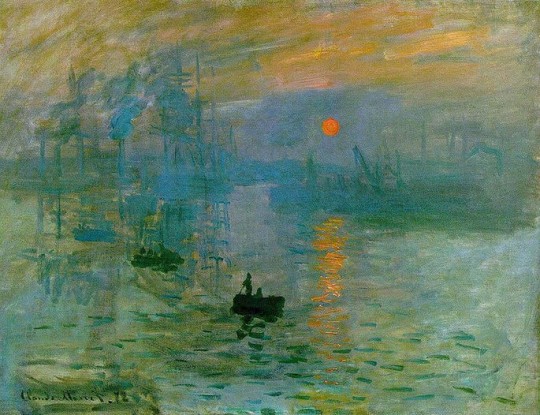
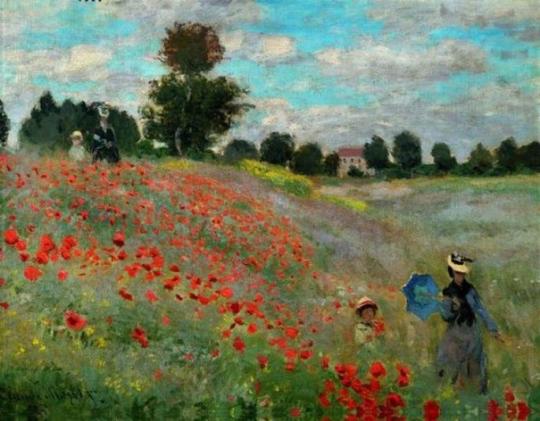
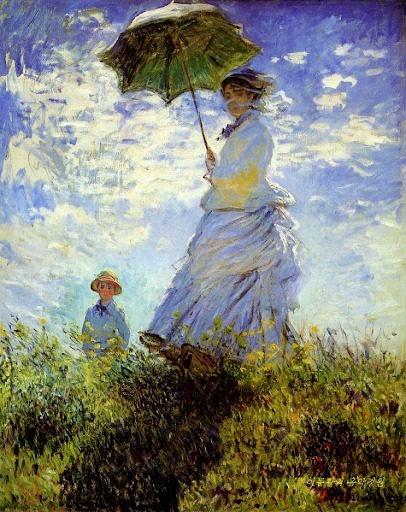


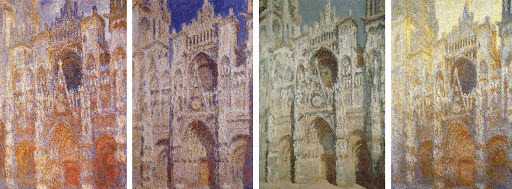
Ridley Scott
Ridley Scott is one of the most well-known film directors of all time. He made several films of different genres, but his most well-known genre is science fiction, making films like Alien, Blade Runner, The Martian and Prometheus.
But before before of being a director, Scott was applying to the Royal College of Art, one the most acclaimed art colleges at the time, to be a designer.
Scott always liked drawing , but he saw that he had no way of being a painter. His teachers always argued that his paintings were more illustrations than paintings.
So he saw that the Royal College of Art, had a particularly strong Graphic Design Department, which would give him a more specific creative target and a broader canvas. He was accepted by the college, and started his studies in 1958 and finished in 1961.
In his words, he considered design college to be extremely competitive, everyone in his class tried to compete with each other to see who was better. And Scott realized that he needed to fight hard to be among the best. “It could be very competitive, with no much being given away and everything kept close to you chest. You observed all the time, watched everyone else did and tried to do better and be the most original”.
Since graduating, Scott has said that he has become extremely perfectionist, and has tried to do as much of his work as a designer and a filmmaker in the best possible way.
After working as a set designer, and director in British television, he began in 1967 to direct commercials, eventually numbering more than 2,000 for his own company. His attention to visual stylization in his commercials, including distinctive atmospheric lighting effects, continued into the feature films that he began to directing in 1977.
In 1979 Ridley Scott releases what is considered his debut film and his masterpiece, the movie Alien. Starring Sigourney Weaver as Ellen Ripley, Scott is credited with having a heroine take point in the ensuing hunt aboard the Nostromo spaceship. Scott’s paintings and illustrations are close to pointillism with tiny points that result in images of high definition and extreme detail.
A highly detailed approach marks his style. His eye for composition, lighting, and design seems to explain his ability to visualize a movie in his mind. He claims to have and eidetic memory and the ability to recall images with high precision.
https://www.youtube.com/watch?v=tjD82nKybUA



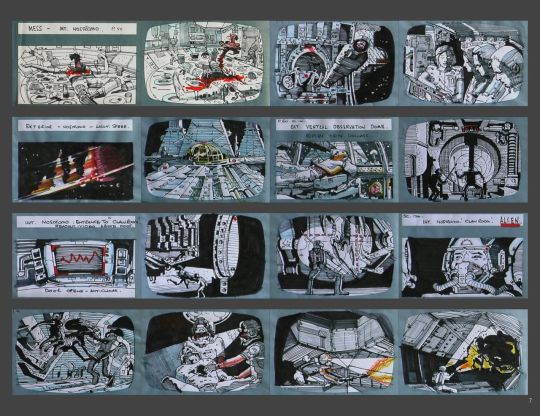
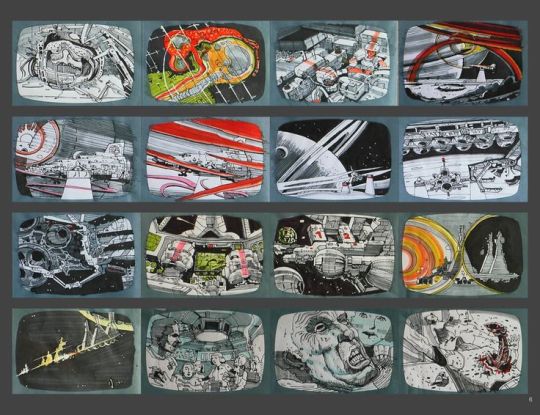
Roxie Vizcarra
Roxie Vizcarra is an artist, who worked as the senior illustrator of Rockstar Games, who worked closely on the iconic Grand Theft Auto v and Red Dead Redemption 2 marketing campaigns.
The Peruvian-American artist was just out of college- she earned her bachelor’s degree from the Parsons School of Design in New York- when she was approached by Rockstar games in 2009.
Vizcarra was Rockstar game’s first female illustrator. The first project she worked on was Grand Theft Auto IV: Liberty City.
The first game Vizcarra worked on since its inception was the original Red Dead Redemption, released in 2010.
Vizcarra draws her art from spaghetti western movies and holds the work of “Golden age” illustrators such as Bob Peak and Robert McGinnis in high regard.
For most of her career, Vizcarra’s process began by drawing in sketchbooks (she’s a fan of traditional ink), which she then uploads and adds digital colors through Photoshop.
However, for a year or two she has been using Procreate on the IPad, which is very flexible for her purposes. She also takes references photos when she doesn’t have a clear idea of what the illustration should look like, either of others or of herself, in the desired pose.
Vizcarra shows unusual humility; she insists on not taking credit for herself and repeatedly refuses to attribute specific drawings to one person or another, or to go into the why’s and how’s of illustrations.
Vizcarra’s work is really interesting, and it explores the more of the side of markenting. In making covers and posters extremely flashy for the public, and in addition to using references to posters from old western movies, maybe that is what attracts me the most. I really like the western theme, and I always liked the way she created the poster for games like red dead redmeption 2 and GTA, with extremely warm colors, with references of very old artists, who perhaps few remember, but she always tries to put some of them into her work.
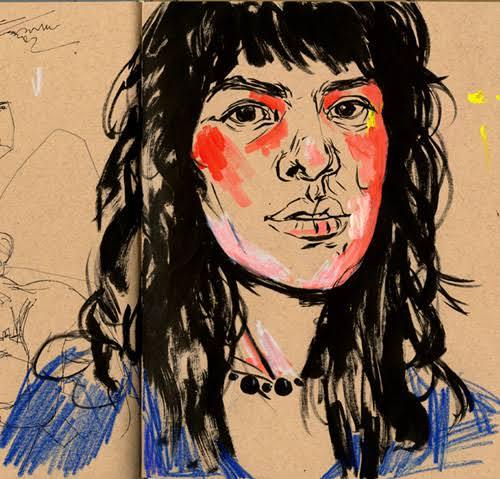






Show and Tell Digital Collage research
Terry Gilliam
Is a famous American-British director, screenwriter, animator, artist and comedian, and who is known for directing and acting in some of the films of the English comedy group Monthy Python, in addition to making films that are extremely difficult to understand, as if madness were the main character in all his films.
Terry Gilliam began his career as an animator and photographic cartoonist; one his first jobs was for the Help ! Magazine.
Gilliam preferred cut-out animation, which involved pushing bits of paper in front of camera instead of photographing pre-drawn cels. The process allows for more spontaneity than traditional animation along with being comparatively cheaper and easier to do. He also preferred to use old photographs and illustrations to create sketches that were surreal and hilarious.
Gilliam was one of the founders of Monty Python. At first, he was accredited as an animator ( his name appeared separate from the remaining 5 members in the credits), later he also joined the series as an actor. Their animations linked the sketches of the program and defined the group’s look in other types of media ( such as Vinyl discs, book covers and the opening sequence in the films).
Gilliam polished a unique style, created fantastic worlds, worked with great stars for the biggest studios, and sweated tight budgets to execute his vision, not always sharp but always brilliant.


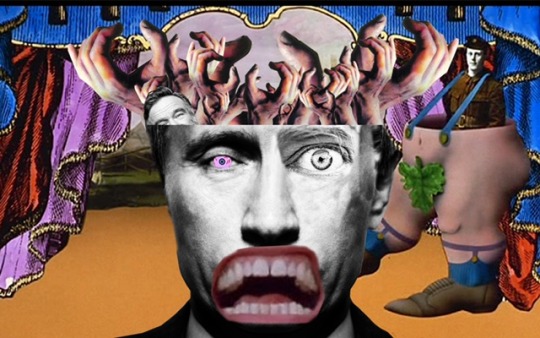
Caco Neves
Caco Neves uses digital collage as a platform, he created, for the past 10 years, illustrations for zines, magazines, advertising pieces, vignettes for TV and the web and, more recently, he was summoned by the Vogue art team to create the cover for the Vogue Experience 2017.
After spending a season in London, where he learned to give movement to his creations with the techniques calls Motion Collage, Caco returned to Brazil and, in a moment of creative rest, when he was creating for himself and not for a client, worked on a psychedelic vignette, then he sent it to MTV, to see if they liked the style, and they asked to use this commercial but to make some adjustments.
For Caco, the success of digital collage in the last decade is a reflection of the time we live in. “ The internet brought access to images- digital collections became public- and photoshop became popular.”
He has worked for several national and international companies, and his work is very dear to his collaborators, very much for his creativity, and for the choice of technique.


0 notes
Photo
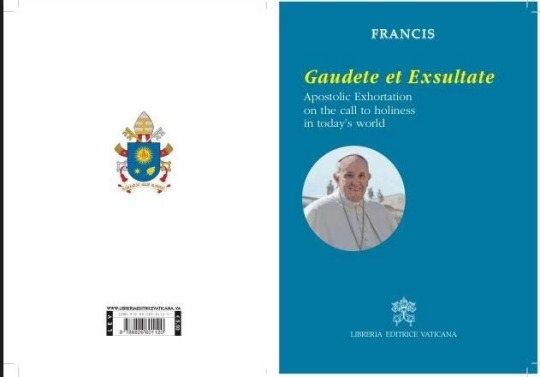
9th April >> (@zenitenglish) Pope Francis’ full Vatican-provided English text of “Gaudate et Exsultate”: *** APOSTOLIC EXHORTATION GAUDETE ET EXSULTATE OF THE HOLY FATHER FRANCIS ON THE CALL TO HOLINESS IN TODAY’S WORLD 1. “REJOICE AND BE GLAD” (Mt 5:12), Jesus tells those persecuted or humiliated for his sake. The Lord asks everything of us, and in return he offers us true life, the happiness for which we were created. He wants us to be saints and not to settle for a bland and mediocre existence. The call to holiness is present in various ways from the very first pages of the Bible. We see it expressed in the Lord’s words to Abraham: “Walk before me, and be blameless” (Gen 17:1). 2. What follows is not meant to be a treatise on holiness, containing definitions and distinctions helpful for understanding this important subject, or a discussion of the various means of sanctification. My modest goal is to repropose the call to holiness in a practical way for our own time, with all its risks, challenges and opportunities. For the Lord has chosen each one of us “to be holy and blameless before him in love” (Eph 1:4). CHAPTER ONE THE CALL TO HOLINESS THE SAINTS WHO ENCOURAGE AND ACCOMPANY US 3. The Letter to the Hebrews presents a number of testimonies that encourage us to “run with perseverance the race that is set before us” (12:1). It speaks of Abraham, Sarah, Moses, Gideon and others (cf. 11:1-12:3). Above all, it invites us to realize that “a great cloud of witnesses” (12:1) impels us to advance constantly towards the goal. These witnesses may include our own mothers, grandmothers or other loved ones (cf. 2 Tim 1:5). Their lives may not always have been perfect, yet even amid their faults and failings they kept moving forward and proved pleasing to the Lord. 4. The saints now in God’s presence preserve their bonds of love and communion with us. The Book of Revelation attests to this when it speaks of the intercession of the martyrs: “I saw under the altar the souls of those who had been slain for the word of God and for the witness they had borne; they cried out with a loud voice, ‘O sovereign Lord, holy and true, how long will it be before you judge?’” (6:9-10). Each of us can say: “Surrounded, led and guided by the friends of God… I do not have to carry alone what, in truth, I could never carry alone. All the saints of God are there to protect me, to sustain me and to carry me”.[1] 5. The processes of beatification and canonization recognize the signs of heroic virtue, the sacrifice of one’s life in martyrdom, and certain cases where a life is constantly offered for others, even until death. This shows an exemplary imitation of Christ, one worthy of the admiration of the faithful.[2] We can think, for example, of Blessed Maria Gabriella Sagheddu, who offered her life for the unity of Christians. THE SAINTS “NEXT DOOR” 6. Nor need we think only of those already beatified and canonized. The Holy Spirit bestows holiness in abundance among God’s holy and faithful people, for “it has pleased God to make men and women holy and to save them, not as individuals without any bond between them, but rather as a people who might acknowledge him in truth and serve him in holiness”.[3] In salvation history, the Lord saved one people. We are never completely ourselves unless we belong to a people. That is why no one is saved alone, as an isolated individual. Rather, God draws us to himself, taking into account the complex fabric of interpersonal relationships present in a human community. God wanted to enter into the life and history of a people. 7. I like to contemplate the holiness present in the patience of God’s people: in those parents who raise their children with immense love, in those men and women who work hard to support their families, in the sick, in elderly religious who never lose their smile. In their daily perseverance I see the holiness of the Church militant. Very often it is a holiness found in our next-door neighbours, those who, living in our midst, reflect God’s presence. We might call them “the middle class of holiness”.[4] 8. Let us be spurred on by the signs of holiness that the Lord shows us through the humblest members of that people which “shares also in Christ’s prophetic office, spreading abroad a living witness to him, especially by means of a life of faith and charity”.[5] We should consider the fact that, as Saint Teresa Benedicta of the Cross suggests, real history is made by so many of them. As she writes: “The greatest figures of prophecy and sanctity step forth out of the darkest night. But for the most part, the formative stream of the mystical life remains invisible. Certainly the most decisive turning points in world history are substantially co-determined by souls whom no history book ever mentions. And we will only find out about those souls to whom we owe the decisive turning points in our personal lives on the day when all that is hidden is revealed”.[6] 9. Holiness is the most attractive face of the Church. But even outside the Catholic Church and in very different contexts, the Holy Spirit raises up “signs of his presence which help Christ’s followers”.[7] Saint John Paul II reminded us that “the witness to Christ borne even to the shedding of blood has become a common inheritance of Catholics, Orthodox, Anglicans and Protestants”.[8] In the moving ecumenical commemoration held in the Colosseum during the Great Jubilee of the Year 2000, he stated that the martyrs are “a heritage which speaks more powerfully than all the causes of division”.[9] THE LORD CALLS 10. All this is important. Yet with this Exhortation I would like to insist primarily on the call to holiness that the Lord addresses to each of us, the call that he also addresses, personally, to you: “Be holy, for I am holy” (Lev 11:44; cf. 1 Pet 1:16). The Second Vatican Council stated this clearly: “Strengthened by so many and such great means of salvation, all the faithful, whatever their condition or state, are called by the Lord – each in his or her own way – to that perfect holiness by which the Father himself is perfect”.[10] 11. “Each in his or her own way” the Council says. We should not grow discouraged before examples of holiness that appear unattainable. There are some testimonies that may prove helpful and inspiring, but that we are not meant to copy, for that could even lead us astray from the one specific path that the Lord has in mind for us. The important thing is that each believer discern his or her own path, that they bring out the very best of themselves, the most personal gifts that God has placed in their hearts (cf. 1 Cor 12:7), rather than hopelessly trying to imitate something not meant for them. We are all called to be witnesses, but there are many actual ways of bearing witness.[11] Indeed, when the great mystic, Saint John of the Cross, wrote his Spiritual Canticle, he preferred to avoid hard and fast rules for all. He explained that his verses were composed so that everyone could benefit from them “in his or her own way”.[12] For God’s life is communicated “to some in one way and to others in another”.[13] 12. Within these various forms, I would stress too that the “genius of woman” is seen in feminine styles of holiness, which are an essential means of reflecting God’s holiness in this world. Indeed, in times when women tended to be most ignored or overlooked, the Holy Spirit raised up saints whose attractiveness produced new spiritual vigour and important reforms in the Church. We can mention Saint Hildegard of Bingen, Saint Bridget, Saint Catherine of Siena, Saint Teresa of Avila and Saint Thérèse of Lisieux. But I think too of all those unknown or forgotten women who, each in her own way, sustained and transformed families and communities by the power of their witness. 13. This should excite and encourage us to give our all and to embrace that unique plan that God willed for each of us from eternity: “Before I formed you in the womb I knew you, and before you were born I consecrated you” (Jer 1:5). FOR YOU TOO 14. To be holy does not require being a bishop, a priest or a religious. We are frequently tempted to think that holiness is only for those who can withdraw from ordinary affairs to spend much time in prayer. That is not the case. We are all called to be holy by living our lives with love and by bearing witness in everything we do, wherever we find ourselves. Are you called to the consecrated life? Be holy by living out your commitment with joy. Are you married? Be holy by loving and caring for your husband or wife, as Christ does for the Church. Do you work for a living? Be holy by labouring with integrity and skill in the service of your brothers and sisters. Are you a parent or grandparent? Be holy by patiently teaching the little ones how to follow Jesus. Are you in a position of authority? Be holy by working for the common good and renouncing personal gain.[14] 15. Let the grace of your baptism bear fruit in a path of holiness. Let everything be open to God; turn to him in every situation. Do not be dismayed, for the power of the Holy Spirit enables you to do this, and holiness, in the end, is the fruit of the Holy Spirit in your life (cf. Gal 5:22-23). When you feel the temptation to dwell on your own weakness, raise your eyes to Christ crucified and say: “Lord, I am a poor sinner, but you can work the miracle of making me a little bit better”. In the Church, holy yet made up of sinners, you will find everything you need to grow towards holiness. The Lord has bestowed on the Church the gifts of scripture, the sacraments, holy places, living communities, the witness of the saints and a multifaceted beauty that proceeds from God’s love, “like a bride bedecked with jewels” (Is 61:10). 16. This holiness to which the Lord calls you will grow through small gestures. Here is an example: a woman goes shopping, she meets a neighbour and they begin to speak, and the gossip starts. But she says in her heart: “No, I will not speak badly of anyone”. This is a step forward in holiness. Later, at home, one of her children wants to talk to her about his hopes and dreams, and even though she is tired, she sits down and listens with patience and love. That is another sacrifice that brings holiness. Later she experiences some anxiety, but recalling the love of the Virgin Mary, she takes her rosary and prays with faith. Yet another path of holiness. Later still, she goes out onto the street, encounters a poor person and stops to say a kind word to him. One more step. 17. At times, life presents great challenges. Through them, the Lord calls us anew to a conversion that can make his grace more evident in our lives, “in order that we may share his holiness” (Heb 12:10). At other times, we need only find a more perfect way of doing what we are already doing: “There are inspirations that tend solely to perfect in an extraordinary way the ordinary things we do in life”.[15] When Cardinal François-Xavier Nguyên van Thuân was imprisoned, he refused to waste time waiting for the day he would be set free. Instead, he chose “to live the present moment, filling it to the brim with love”. He decided: “I will seize the occasions that present themselves every day; I will accomplish ordinary actions in an extraordinary way”.[16] 18. In this way, led by God’s grace, we shape by many small gestures the holiness God has willed for us, not as men and women sufficient unto ourselves but rather “as good stewards of the manifold grace of God” (1 Pet 4:10). The New Zealand bishops rightly teach us that we are capable of loving with the Lord’s unconditional love, because the risen Lord shares his powerful life with our fragile lives: “His love set no limits and, once given, was never taken back. It was unconditional and remained faithful. To love like that is not easy because we are often so weak. But just to try to love as Christ loved us shows that Christ shares his own risen life with us. In this way, our lives demonstrate his power at work – even in the midst of human weakness”.[17] YOUR MISSION IN CHRIST 19. A Christian cannot think of his or her mission on earth without seeing it as a path of holiness, for “this is the will of God, your sanctification” (1 Thess 4:3). Each saint is a mission, planned by the Father to reflect and embody, at a specific moment in history, a certain aspect of the Gospel. 20. That mission has its fullest meaning in Christ, and can only be understood through him. At its core, holiness is experiencing, in union with Christ, the mysteries of his life. It consists in uniting ourselves to the Lord’s death and resurrection in a unique and personal way, constantly dying and rising anew with him. But it can also entail reproducing in our own lives various aspects of Jesus’ earthly life: his hidden life, his life in community, his closeness to the outcast, his poverty and other ways in which he showed his self-sacrificing love. The contemplation of these mysteries, as Saint Ignatius of Loyola pointed out, leads us to incarnate them in our choices and attitudes.[18] Because “everything in Jesus’ life was a sign of his mystery”,[19] “Christ’s whole life is a revelation of the Father”,[20] “Christ’s whole life is a mystery of redemption”,[21] “Christ’s whole life is a mystery of recapitulation”.[22] “Christ enables us to live in him all that he himself lived, and he lives it in us”.[23] 21. The Father’s plan is Christ, and ourselves in him. In the end, it is Christ who loves in us, for “holiness is nothing other than charity lived to the full”.[24] As a result, “the measure of our holiness stems from the stature that Christ achieves in us, to the extent that, by the power of the Holy Spirit, we model our whole life on his”.[25] Every saint is a message which the Holy Spirit takes from the riches of Jesus Christ and gives to his people. 22. To recognize the word that the Lord wishes to speak to us through one of his saints, we do not need to get caught up in details, for there we might also encounter mistakes and failures. Not everything a saint says is completely faithful to the Gospel; not everything he or she does is authentic or perfect. What we need to contemplate is the totality of their life, their entire journey of growth in holiness, the reflection of Jesus Christ that emerges when we grasp their overall meaning as a person.[26] 23. This is a powerful summons to all of us. You too need to see the entirety of your life as a mission. Try to do so by listening to God in prayer and recognizing the signs that he gives you. Always ask the Spirit what Jesus expects from you at every moment of your life and in every decision you must make, so as to discern its place in the mission you have received. Allow the Spirit to forge in you the personal mystery that can reflect Jesus Christ in today’s world. 24. May you come to realize what that word is, the message of Jesus that God wants to speak to the world by your life. Let yourself be transformed. Let yourself be renewed by the Spirit, so that this can happen, lest you fail in your precious mission. The Lord will bring it to fulfilment despite your mistakes and missteps, provided that you do not abandon the path of love but remain ever open to his supernatural grace, which purifies and enlightens. ACTIVITY THAT SANCTIFIES 25. Just as you cannot understand Christ apart from the kingdom he came to bring, so too your personal mission is inseparable from the building of that kingdom: “Strive first for the kingdom of God and his righteousness” (Mt 6:33). Your identification with Christ and his will involves a commitment to build with him that kingdom of love, justice and universal peace. Christ himself wants to experience this with you, in all the efforts and sacrifices that it entails, but also in all the joy and enrichment it brings. You cannot grow in holiness without committing yourself, body and soul, to giving your best to this endeavour. 26. It is not healthy to love silence while fleeing interaction with others, to want peace and quiet while avoiding activity, to seek prayer while disdaining service. Everything can be accepted and integrated into our life in this world, and become a part of our path to holiness. We are called to be contemplatives even in the midst of action, and to grow in holiness by responsibly and generously carrying out our proper mission. 27. Could the Holy Spirit urge us to carry out a mission and then ask us to abandon it, or not fully engage in it, so as to preserve our inner peace? Yet there are times when we are tempted to relegate pastoral engagement or commitment in the world to second place, as if these were “distractions” along the path to growth in holiness and interior peace. We can forget that “life does not have a mission, but is a mission”.[27] 28. Needless to say, anything done out of anxiety, pride or the need to impress others will not lead to holiness. We are challenged to show our commitment in such a way that everything we do has evangelical meaning and identifies us all the more with Jesus Christ. We often speak, for example, of the spirituality of the catechist, the spirituality of the diocesan priesthood, the spirituality of work. For the same reason, in Evangelii Gaudium I concluded by speaking of a spirituality of mission, in Laudato Si’ of an ecological spirituality, and in Amoris Laetitia of a spirituality of family life. 29. This does not mean ignoring the need for moments of quiet, solitude and silence before God. Quite the contrary. The presence of constantly new gadgets, the excitement of travel and an endless array of consumer goods at times leave no room for God’s voice to be heard. We are overwhelmed by words, by superficial pleasures and by an increasing din, filled not by joy but rather by the discontent of those whose lives have lost meaning. How can we fail to realize the need to stop this rat race and to recover the personal space needed to carry on a heartfelt dialogue with God? Finding that space may prove painful but it is always fruitful. Sooner or later, we have to face our true selves and let the Lord enter. This may not happen unless “we see ourselves staring into the abyss of a frightful temptation, or have the dizzying sensation of standing on the precipice of utter despair, or find ourselves completely alone and abandoned”.[28] In such situations, we find the deepest motivation for living fully our commitment to our work. 30. The same distractions that are omnipresent in today’s world also make us tend to absolutize our free time, so that we can give ourselves over completely to the devices that provide us with entertainment or ephemeral pleasures.[29] As a result, we come to resent our mission, our commitment grows slack, and our generous and ready spirit of service begins to flag. This denatures our spiritual experience. Can any spiritual fervour be sound when it dwells alongside sloth in evangelization or in service to others? 31. We need a spirit of holiness capable of filling both our solitude and our service, our personal life and our evangelizing efforts, so that every moment can be an expression of self-sacrificing love in the Lord’s eyes. In this way, every minute of our lives can be a step along the path to growth in holiness. MORE ALIVE, MORE HUMAN 32. Do not be afraid of holiness. It will take away none of your energy, vitality or joy. On the contrary, you will become what the Father had in mind when he created you, and you will be faithful to your deepest self. To depend on God sets us free from every form of enslavement and leads us to recognize our great dignity. We see this in Saint Josephine Bakhita: “Abducted and sold into slavery at the tender age of seven, she suffered much at the hands of cruel masters. But she came to understand the profound truth that God, and not man, is the true Master of every human being, of every human life. This experience became a source of great wisdom for this humble daughter of Africa”.[30] 33. To the extent that each Christian grows in holiness, he or she will bear greater fruit for our world. The bishops of West Africa have observed that “we are being called in the spirit of the New Evangelization to be evangelized and to evangelize through the empowering of all you, the baptized, to take up your roles as salt of the earth and light of the world wherever you find yourselves”.[31] 34. Do not be afraid to set your sights higher, to allow yourself to be loved and liberated by God. Do not be afraid to let yourself be guided by the Holy Spirit. Holiness does not make you less human, since it is an encounter between your weakness and the power of God’s grace. For in the words of León Bloy, when all is said and done, “the only great tragedy in life, is not to become a saint”.[32] CHAPTER TWO TWO SUBTLE ENEMIES OF HOLINESS 35. Here I would like to mention two false forms of holiness that can lead us astray: gnosticism and pelagianism. They are two heresies from early Christian times, yet they continue to plague us. In our times too, many Christians, perhaps without realizing it, can be seduced by these deceptive ideas, which reflect an anthropocentric immanentism disguised as Catholic truth.[33] Let us take a look at these two forms of doctrinal or disciplinary security that give rise “toa narcissistic and authoritarian elitism, whereby instead of evangelizing, one analyses and classifies others, and instead of opening the door to grace, one exhausts his or her energies in inspecting and verifying. In neither case is one really concerned about Jesus Christ or others”.[34] CONTEMPORARY GNOSTICISM 36. Gnosticism presumes “a purely subjective faith whose only interest is a certain experience or a set of ideas and bits of information which are meant to console and enlighten, but which ultimately keep one imprisoned in his or her own thoughts and feelings”.[35] An intellect without God and without flesh 37. Thanks be to God, throughout the history of the Church it has always been clear that a person’s perfection is measured not by the information or knowledge they possess, but by the depth of their charity. “Gnostics” do not understand this, because they judge others based on their ability to understand the complexity of certain doctrines. They think of the intellect as separate from the flesh, and thus become incapable of touching Christ’s suffering flesh in others, locked up as they are in an encyclopaedia of abstractions. In the end, by disembodying the mystery, they prefer “a God without Christ, a Christ without the Church, a Church without her people”.[36] 38. Certainly this is a superficial conceit: there is much movement on the surface, but the mind is neither deeply moved nor affected. Still, gnosticism exercises a deceptive attraction for some people, since the gnostic approach is strict and allegedly pure, and can appear to possess a certain harmony or order that encompasses everything. 39. Here we have to be careful. I am not referring to a rationalism inimical to Christian faith. It can be present within the Church, both among the laity in parishes and teachers of philosophy and theology in centres of formation. Gnostics think that their explanations can make the entirety of the faith and the Gospel perfectly comprehensible. They absolutize their own theories and force others to submit to their way of thinking. A healthy and humble use of reason in order to reflect on the theological and moral teaching of the Gospel is one thing. It is another to reduce Jesus’ teaching to a cold and harsh logic that seeks to dominate everything.[37] A doctrine without mystery 40. Gnosticism is one of the most sinister ideologies because, while unduly exalting knowledge or a specific experience, it considers its own vision of reality to be perfect. Thus, perhaps without even realizing it, this ideology feeds on itself and becomes even more myopic. It can become all the more illusory when it masks itself as a disembodied spirituality. For gnosticism “by its very nature seeks to domesticate the mystery”,[38] whether the mystery of God and his grace, or the mystery of others’ lives. 41. When somebody has an answer for every question, it is a sign that they are not on the right road. They may well be false prophets, who use religion for their own purposes, to promote their own psychological or intellectual theories. God infinitely transcends us; he is full of surprises. We are not the ones to determine when and how we will encounter him; the exact times and places of that encounter are not up to us. Someone who wants everything to be clear and sure presumes to control God’s transcendence. 42. Nor can we claim to say where God is not, because God is mysteriously present in the life of every person, in a way that he himself chooses, and we cannot exclude this by our presumed certainties. Even when someone’s life appears completely wrecked, even when we see it devastated by vices or addictions, God is present there. If we let ourselves be guided by the Spirit rather than our own preconceptions, we can and must try to find the Lord in every human life. This is part of the mystery that a gnostic mentality cannot accept, since it is beyond its control. The limits of reason 43. It is not easy to grasp the truth that we have received from the Lord. And it is even more difficult to express it. So we cannot claim that our way of understanding this truth authorizes us to exercise a strict supervision over others’ lives. Here I would note that in the Church there legitimately coexist different ways of interpreting many aspects of doctrine and Christian life; in their variety, they “help to express more clearly the immense riches of God’s word”. It is true that “for those who long for a monolithic body of doctrine guarded by all and leaving no room for nuance, this might appear as undesirable and leading to confusion”.[39] Indeed, some currents of gnosticism scorned the concrete simplicity of the Gospel and attempted to replace the trinitarian and incarnate God with a superior Unity, wherein the rich diversity of our history disappeared. 44. In effect, doctrine, or better, our understanding and expression of it, “is not a closed system, devoid of the dynamic capacity to pose questions, doubts, inquiries… The questions of our people, their suffering, their struggles, their dreams, their trials and their worries, all possess an interpretational value that we cannot ignore if we want to take the principle of the incarnation seriously. Their wondering helps us to wonder, their questions question us”.[40] 45. A dangerous confusion can arise. We can think that because we know something, or are able to explain it in certain terms, we are already saints, perfect and better than the “ignorant masses”. Saint John Paul II warned of the temptation on the part of those in the Church who are more highly educated “to feel somehow superior to other members of the faithful”.[41] In point of fact, what we think we know should always motivate us to respond more fully to God’s love. Indeed, “you learn so as to live: theology and holiness are inseparable”.[42] 46. When Saint Francis of Assisi saw that some of his disciples were engaged in teaching, he wanted to avoid the temptation to gnosticism. He wrote to Saint Anthony of Padua: “I am pleased that you teach sacred theology to the brothers, provided that… you do not extinguish the spirit of prayer and devotion during study of this kind”.[43] Francis recognized the temptation to turn the Christian experience into a set of intellectual exercises that distance us from the freshness of the Gospel. Saint Bonaventure, on the other hand, pointed out that true Christian wisdom can never be separated from mercy towards our neighbour: “The greatest possible wisdom is to share fruitfully what we have to give… Even as mercy is the companion of wisdom, avarice is its enemy”.[44]“There are activities that, united to contemplation, do not prevent the latter, but rather facilitate it, such as works of mercy and devotion”.[45] CONTEMPORARY PELAGIANISM 47. Gnosticism gave way to another heresy, likewise present in our day. As time passed, many came to realize that it is not knowledge that betters us or makes us saints, but the kind of life we lead. But this subtly led back to the old error of the gnostics, which was simply transformed rather than eliminated. 48. The same power that the gnostics attributed to the intellect, others now began to attribute to the human will, to personal effort. This was the case with the pelagians and semi-pelagians. Now it was not intelligence that took the place of mystery and grace, but our human will. It was forgotten that everything “depends not on human will or exertion, but on God who shows mercy” (Rom 9:16) and that “he first loved us” (cf. 1 Jn 4:19). A will lacking humility 49. Those who yield to this pelagian or semi-pelagian mindset, even though they speak warmly of God’s grace, “ultimately trust only in their own powers and feel superior to others because they observe certain rules or remain intransigently faithful to a particular Catholic style”.[46] When some of them tell the weak that all things can be accomplished with God’s grace, deep down they tend to give the idea that all things are possible by the human will, as if it were something pure, perfect, all-powerful, to which grace is then added. They fail to realize that “not everyone can do everything”,[47] and that in this life human weaknesses are not healed completely and once for all by grace.[48] In every case, as Saint Augustine taught, God commands you to do what you can and to ask for what you cannot,[49] and indeed to pray to him humbly: “Grant what you command, and command what you will”.[50] 50. Ultimately, the lack of a heartfelt and prayerful acknowledgment of our limitations prevents grace from working more effectively within us, for no room is left for bringing about the potential good that is part of a sincere and genuine journey of growth.[51]Grace, precisely because it builds on nature, does not make us superhuman all at once. That kind of thinking would show too much confidence in our own abilities. Underneath our orthodoxy, our attitudes might not correspond to our talk about the need for grace, and in specific situations we can end up putting little trust in it. Unless we can acknowledge our concrete and limited situation, we will not be able to see the real and possible steps that the Lord demands of us at every moment, once we are attracted and empowered by his gift. Grace acts in history; ordinarily it takes hold of us and transforms us progressively.[52] If we reject this historical and progressive reality, we can actually refuse and block grace, even as we extol it by our words. 51. When God speaks to Abraham, he tells him: “I am God Almighty, walk before me, and be blameless” (Gen 17:1). In order to be blameless, as he would have us, we need to live humbly in his presence, cloaked in his glory; we need to walk in union with him, recognizing his constant love in our lives. We need to lose our fear before that presence which can only be for our good. God is the Father who gave us life and loves us greatly. Once we accept him, and stop trying to live our lives without him, the anguish of loneliness will disappear (cf. Ps 139:23-24). In this way we will know the pleasing and perfect will of the Lord (cf. Rom 12:1-2) and allow him to mould us like a potter (cf. Is 29:16). So often we say that God dwells in us, but it is better to say that we dwell in him, that he enables us to dwell in his light and love. He is our temple; we ask to dwell in the house of the Lord all the days of our life (cf. Ps 27:4). “For one day in your courts is better than a thousand elsewhere” (Ps 84:10). In him is our holiness. An often overlooked Church teaching 52. The Church has repeatedly taught that we are justified not by our own works or efforts, but by the grace of the Lord, who always takes the initiative. The Fathers of the Church, even before Saint Augustine, clearly expressed this fundamental belief. Saint John Chrysostom said that God pours into us the very source of all his gifts even before we enter into battle.[53] Saint Basil the Great remarked that the faithful glory in God alone, for “they realize that they lack true justice and are justified only through faith in Christ”.[54] 53. The Second Synod of Orange taught with firm authority that nothing human can demand, merit or buy the gift of divine grace, and that all cooperation with it is a prior gift of that same grace: “Even the desire to be cleansed comes about in us through the outpouring and working of the Holy Spirit”.[55] Subsequently, the Council of Trent, while emphasizing the importance of our cooperation for spiritual growth, reaffirmed that dogmatic teaching: “We are said to be justified gratuitously because nothing that precedes justification, neither faith nor works, merits the grace of justification; for ‘if it is by grace, it is no longer on the basis of works; otherwise, grace would no longer be grace’ (Rom 11:6)”.[56] 54. The Catechism of the Catholic Church also reminds us that the gift of grace “surpasses the power of human intellect and will”[57] and that “with regard to God, there is no strict right to any merit on the part of man. Between God and us there is an immeasurable inequality”.[58] His friendship infinitely transcends us; we cannot buy it with our works, it can only be a gift born of his loving initiative. This invites us to live in joyful gratitude for this completely unmerited gift, since “after one has grace, the grace already possessed cannot come under merit”.[59] The saints avoided putting trust in their own works: “In the evening of this life, I shall appear before you empty-handed, for I do not ask you, Lord, to count my works. All our justices have stains in your sight”.[60] 55. This is one of the great convictions that the Church has come firmly to hold. It is so clearly expressed in the word of God that there can be no question of it. Like the supreme commandment of love, this truth should affect the way we live, for it flows from the heart of the Gospel and demands that we not only accept it intellectually but also make it a source of contagious joy. Yet we cannot celebrate this free gift of the Lord’s friendship unless we realize that our earthly life and our natural abilities are his gift. We need “to acknowledge jubilantly that our life is essentially a gift, and recognize that our freedom is a grace. This is not easy today, in a world that thinks it can keep something for itself, the fruits of its own creativity or freedom”.[61] 56. Only on the basis of God’s gift, freely accepted and humbly received, can we cooperate by our own efforts in our progressive transformation.[62] We must first belong to God, offering ourselves to him who was there first, and entrusting to him our abilities, our efforts, our struggle against evil and our creativity, so that his free gift may grow and develop within us: “I appeal to you, therefore, brethren, by the mercies of God, to present your bodies as a living sacrifice, holy and acceptable to God” (Rom 12:1). For that matter, the Church has always taught that charity alone makes growth in the life of grace possible, for “if I do not have love, I am nothing” (1 Cor 13:2). New pelagians 57. Still, some Christians insist on taking another path, that of justification by their own efforts, the worship of the human will and their own abilities. The result is a self-centred and elitist complacency, bereft of true love. This finds expression in a variety of apparently unconnected ways of thinking and acting: an obsession with the law, an absorption with social and political advantages, a punctilious concern for the Church’s liturgy, doctrine and prestige, a vanity about the ability to manage practical matters, and an excessive concern with programmes of self-help and personal fulfilment. Some Christians spend their time and energy on these things, rather than letting themselves be led by the Spirit in the way of love, rather than being passionate about communicating the beauty and the joy of the Gospel and seeking out the lost among the immense crowds that thirst for Christ.[63] 58. Not infrequently, contrary to the promptings of the Spirit, the life of the Church can become a museum piece or the possession of a select few. This can occur when some groups of Christians give excessive importance to certain rules, customs or ways of acting. The Gospel then tends to be reduced and constricted, deprived of its simplicity, allure and savour. This may well be a subtle form of pelagianism, for it appears to subject the life of grace to certain human structures. It can affect groups, movements and communities, and it explains why so often they begin with an intense life in the Spirit, only to end up fossilized… or corrupt. 59. Once we believe that everything depends on human effort as channelled by ecclesial rules and structures, we unconsciously complicate the Gospel and become enslaved to a blueprint that leaves few openings for the working of grace. Saint Thomas Aquinas reminded us that the precepts added to the Gospel by the Church should be imposed with moderation “lest the conduct of the faithful become burdensome”, for then our religion would become a form of servitude.[64] The summation of the Law 60. To avoid this, we do well to keep reminding ourselves that there is a hierarchy of virtues that bids us seek what is essential. The primacy belongs to the theological virtues, which have God as their object and motive. At the centre is charity. Saint Paul says that what truly counts is “faith working through love” (Gal 5:6). We are called to make every effort to preserve charity: “The one who loves another has fulfilled the law… for love is the fulfilment of the law” (Rom 13:8.10). “For the whole law is summed up in a single commandment, ‘You shall love your neighbour as yourself’” (Gal 5:14). 61. In other words, amid the thicket of precepts and prescriptions, Jesus clears a way to seeing two faces, that of the Father and that of our brother. He does not give us two more formulas or two more commands. He gives us two faces, or better yet, one alone: the face of God reflected in so many other faces. For in every one of our brothers and sisters, especially the least, the most vulnerable, the defenceless and those in need, God’s very image is found. Indeed, with the scraps of this frail humanity, the Lord will shape his final work of art. For “what endures, what has value in life, what riches do not disappear? Surely these two: the Lord and our neighbour. These two riches do not disappear!”[65] 62. May the Lord set the Church free from these new forms of gnosticism and pelagianism that weigh her down and block her progress along the path to holiness! These aberrations take various shapes, according to the temperament and character of each person. So I encourage everyone to reflect and discern before God whether they may be present in their lives. CHAPTER THREE IN THE LIGHT OF THE MASTER 63. There can be any number of theories about what constitutes holiness, with various explanations and distinctions. Such reflection may be useful, but nothing is more enlightening than turning to Jesus’ words and seeing his way of teaching the truth. Jesus explained with great simplicity what it means to be holy when he gave us the Beatitudes (cf. Mt 5:3-12; Lk 6:20-23). The Beatitudes are like a Christian’s identity card. So if anyone asks: “What must one do to be a good Christian?”, the answer is clear. We have to do, each in our own way, what Jesus told us in the Sermon on the Mount.[66] In the Beatitudes, we find a portrait of the Master, which we are called to reflect in our daily lives. 64. The word “happy” or “blessed” thus becomes a synonym for “holy”. It expresses the fact that those faithful to God and his word, by their self-giving, gain true happiness. GOING AGAINST THE FLOW 65. Although Jesus’ words may strike us as poetic, they clearly run counter to the way things are usually done in our world. Even if we find Jesus’ message attractive, the world pushes us towards another way of living. The Beatitudes are in no way trite or undemanding, quite the opposite. We can only practise them if the Holy Spirit fills us with his power and frees us from our weakness, our selfishness, our complacency and our pride. 66. Let us listen once more to Jesus, with all the love and respect that the Master deserves. Let us allow his words to unsettle us, to challenge us and to demand a real change in the way we live. Otherwise, holiness will remain no more than an empty word. We turn now to the individual Beatitudes in the Gospel of Matthew (cf. Mt 5:3-12).[67] “Blessed are the poor in spirit, for theirs is the kingdom of heaven” 67. The Gospel invites us to peer into the depths of our heart, to see where we find our security in life. Usually the rich feel secure in their wealth, and think that, if that wealth is threatened, the whole meaning of their earthly life can collapse. Jesus himself tells us this in the parable of the rich fool: he speaks of a man who was sure of himself, yet foolish, for it did not dawn on him that he might die that very day (cf. Lk 12:16-21). 68. Wealth ensures nothing. Indeed, once we think we are rich, we can become so self-satisfied that we leave no room for God’s word, for the love of our brothers and sisters, or for the enjoyment of the most important things in life. In this way, we miss out on the greatest treasure of all. That is why Jesus calls blessed those who are poor in spirit, those who have a poor heart, for there the Lord can enter with his perennial newness. 69. This spiritual poverty is closely linked to what Saint Ignatius of Loyola calls “holy indifference”, which brings us to a radiant interior freedom: “We need to train ourselves to be indifferent in our attitude to all created things, in all that is permitted to our free will and not forbidden; so that on our part, we do not set our hearts on good health rather than bad, riches rather than poverty, honour rather than dishonour, a long life rather than a short one, and so in all the rest”.[68] 70. Luke does not speak of poverty “of spirit” but simply of those who are “poor” (cf. Lk 6:20). In this way, he too invites us to live a plain and austere life. He calls us to share in the life of those most in need, the life lived by the Apostles, and ultimately to configure ourselves to Jesus who, though rich, “made himself poor” (2 Cor 8:9). Being poor of heart: that is holiness. “Blessed are the meek, for they will inherit the earth” 71. These are strong words in a world that from the beginning has been a place of conflict, disputes and enmity on all sides, where we constantly pigeonhole others on the basis of their ideas, their customs and even their way of speaking or dressing. Ultimately, it is the reign of pride and vanity, where each person thinks he or she has the right to dominate others. Nonetheless, impossible as it may seem, Jesus proposes a different way of doing things: the way of meekness. This is what we see him doing with his disciples. It is what we contemplate on his entrance to Jerusalem: “Behold, your king is coming to you, humble, and mounted on a donkey” (Mt 21:5; Zech 9:9). 72. Christ says: “Learn from me; for I am gentle and humble of heart, and you will find rest for your souls” (Mt 11:29). If we are constantly upset and impatient with others, we will end up drained and weary. But if we regard the faults and limitations of others with tenderness and meekness, without an air of superiority, we can actually help them and stop wasting our energy on useless complaining. Saint Thérèse of Lisieux tells us that “perfect charity consists in putting up with others’ mistakes, and not being scandalized by their faults”.[69] 73. Paul speaks of meekness as one of the fruits of the Holy Spirit (cf. Gal 5:23). He suggests that, if a wrongful action of one of our brothers or sisters troubles us, we should try to correct them, but “with a spirit of meekness”, since “you too could be tempted” (Gal6:1). Even when we defend our faith and convictions, we are to do so “with meekness” (cf. 1 Pet 3:16). Our enemies too are to be treated “with meekness” (2 Tim 2:25). In the Church we have often erred by not embracing this demand of God’s word. 74. Meekness is yet another expression of the interior poverty of those who put their trust in God alone. Indeed, in the Bible the same word – anawim – usually refers both to the poor and to the meek. Someone might object: “If I am that meek, they will think that I am an idiot, a fool or a weakling”. At times they may, but so be it. It is always better to be meek, for then our deepest desires will be fulfilled. The meek “shall inherit the earth”, for they will see God’s promises accomplished in their lives. In every situation, the meek put their hope in the Lord, and those who hope for him shall possess the land… and enjoy the fullness of peace (cf. Ps37:9.11). For his part, the Lord trusts in them: “This is the one to whom I will look, to the humble and contrite in spirit, who trembles at my word” (Is 66:2). Reacting with meekness and humility: that is holiness. “Blessed are those who mourn, for they will be comforted” 75. The world tells us exactly the opposite: entertainment, pleasure, diversion and escape make for the good life. The worldly person ignores problems of sickness or sorrow in the family or all around him; he averts his gaze. The world has no desire to mourn; it would rather disregard painful situations, cover them up or hide them. Much energy is expended on fleeing from situations of suffering in the belief that reality can be concealed. But the cross can never be absent. 76. A person who sees things as they truly are and sympathizes with pain and sorrow is capable of touching life’s depths and finding authentic happiness.[70] He or she is consoled, not by the world but by Jesus. Such persons are unafraid to share in the suffering of others; they do not flee from painful situations. They discover the meaning of life by coming to the aid of those who suffer, understanding their anguish and bringing relief. They sense that the other is flesh of our flesh, and are not afraid to draw near, even to touch their wounds. They feel compassion for others in such a way that all distance vanishes. In this way they can embrace Saint Paul’s exhortation: “Weep with those who weep” (Rom 12:15). Knowing how to mourn with others: that is holiness. “Blessed are those who hunger and thirst for righteousness, for they will be filled” 77. Hunger and thirst are intense experiences, since they involve basic needs and our instinct for survival. There are those who desire justice and yearn for righteousness with similar intensity. Jesus says that they will be satisfied, for sooner or later justice will come. We can cooperate to make that possible, even if we may not always see the fruit of our efforts. 78. Jesus offers a justice other than that of the world, so often marred by petty interests and manipulated in various ways. Experience shows how easy it is to become mired in corruption, ensnared in the daily politics of quid pro quo, where everything becomes business. How many people suffer injustice, standing by powerlessly while others divvy up the good things of this life. Some give up fighting for real justice and opt to follow in the train of the winners. This has nothing to do with the hunger and thirst for justice that Jesus praises. 79. True justice comes about in people’s lives when they themselves are just in their decisions; it is expressed in their pursuit of justice for the poor and the weak. While it is true that the word “justice” can be a synonym for faithfulness to God’s will in every aspect of our life, if we give the word too general a meaning, we forget that it is shown especially in justice towards those who are most vulnerable: “Seek justice, correct oppression; defend the fatherless, plead for the widow” (Is 1:17). Hungering and thirsting for righteousness: that is holiness. “Blessed are the merciful, for they will receive mercy” 80. Mercy has two aspects. It involves giving, helping and serving others, but it also includes forgiveness and understanding. Matthew sums it up in one golden rule: “In everything, do to others as you would have them do to you” (7:12). The Catechism reminds us that this law is to be applied “in every case”,[71]especially when we are “confronted by situations that make moral judgments less assured and decision difficult”.[72] 81. Giving and forgiving means reproducing in our lives some small measure of God’s perfection, which gives and forgives superabundantly. For this reason, in the Gospel of Luke we do not hear the words, “Be perfect” (Mt 5:48), but rather, “Be merciful, even as your Father is merciful. Judge not, and you will not be judged; condemn not, and you will not be condemned; forgive, and you will be forgiven; give, and it will be given to you” (6:36-38). Luke then adds something not to be overlooked: “The measure you give will be the measure you get back” (6:38). The yardstick we use for understanding and forgiving others will measure the forgiveness we receive. The yardstick we use for giving will measure what we receive. We should never forget this. 82. Jesus does not say, “Blessed are those who plot revenge”. He calls “blessed” those who forgive and do so “seventy times seven” (Mt 18:22). We need to think of ourselves as an army of the forgiven. All of us have been looked upon with divine compassion. If we approach the Lord with sincerity and listen carefully, there may well be times when we hear his reproach: “Should not you have had mercy on your fellow servant, as I had mercy on you?” (Mt 18:33). Seeing and acting with mercy: that is holiness. “Blessed are the pure in heart, for they will see God” 83. This Beatitude speaks of those whose hearts are simple, pure and undefiled, for a heart capable of love admits nothing that might harm, weaken or endanger that love. The Bible uses the heart to describe our real intentions, the things we truly seek and desire, apart from all appearances. “Man sees the appearance, but the Lord looks into the heart” (1Sam 16:7). God wants to speak to our hearts (cf. Hos 2:16); there he desires to write his law (cf. Jer 31:33). In a word, he wants to give us a new heart (cf. Ezek36:26). 84. “Guard your heart with all vigilance” (Prov 4:23). Nothing stained by falsehood has any real worth in the Lord’s eyes. He “flees from deceit, and rises and departs from foolish thoughts” (Wis 1:5). The Father, “who sees in secret” (Mt 6:6), recognizes what is impure and insincere, mere display or appearance, as does the Son, who knows “what is in man” (cf. Jn 2:25). 85. Certainly there can be no love without works of love, but this Beatitude reminds us that the Lord expects a commitment to our brothers and sisters that comes from the heart. For “if I give away all I have, and if I deliver my body to be burned, but have no love, I gain nothing” (1 Cor 13:3). In Matthew’s Gospel too, we see that what proceeds from the heart is what defiles a person (cf. 15:18), for from the heart come murder, theft, false witness, and other evil deeds (cf. 15:19). From the heart’s intentions come the desires and the deepest decisions that determine our actions. 86. A heart that loves God and neighbour (cf. Mt 22:36-40), genuinely and not merely in words, is a pure heart; it can see God. In his hymn to charity, Saint Paul says that “now we see in a mirror, dimly” (1 Cor 13:12), but to the extent that truth and love prevail, we will then be able to see “face to face”. Jesus promises that those who are pure in heart “will see God”. Keeping a heart free of all that tarnishes love: that is holiness. “Blessed are the peacemakers, for they will be called children of God” 87. This Beatitude makes us think of the many endless situations of war in our world. Yet we ourselves are often a cause of conflict or at least of misunderstanding. For example, I may hear something about someone and I go off and repeat it. I may even embellish it the second time around and keep spreading it… And the more harm it does, the more satisfaction I seem to derive from it. The world of gossip, inhabited by negative and destructive people, does not bring peace. Such people are really the enemies of peace; in no way are they “blessed”.[73] 88. Peacemakers truly “make” peace; they build peace and friendship in society. To those who sow peace Jesus makes this magnificent promise: “They will be called children of God” (Mt 5:9). He told his disciples that, wherever they went, they were to say: “Peace to this house!” (Lk 10:5). The word of God exhorts every believer to work for peace, “along with all who call upon the Lord with a pure heart” (cf. 2 Tim 2:22), for “the harvest of righteousness is sown in peace by those who make peace” (Jas 3:18). And if there are times in our community when we question what ought to be done, “let us pursue what makes for peace” (Rom 14:19), for unity is preferable to conflict.[74] 89. It is not easy to “make” this evangelical peace, which excludes no one but embraces even those who are a bit odd, troublesome or difficult, demanding, different, beaten down by life or simply uninterested. It is hard work; it calls for great openness of mind and heart, since it is not about creating “a consensus on paper or a transient peace for a contented minority”,[75] or a project “by a few for the few”.[76] Nor can it attempt to ignore or disregard conflict; instead, it must “face conflict head on, resolve it and make it a link in the chain of a new process”.[77] We need to be artisans of peace, for building peace is a craft that demands serenity, creativity, sensitivity and skill. Sowing peace all around us: that is holiness. “Blessed are those who are persecuted for righteousness’ sake, for theirs is the kingdom of heaven” 90. Jesus himself warns us that the path he proposes goes against the flow, even making us challenge society by the way we live and, as a result, becoming a nuisance. He reminds us how many people have been, and still are, persecuted simply because they struggle for justice, because they take seriously their commitment to God and to others. Unless we wish to sink into an obscure mediocrity, let us not long for an easy life, for “whoever would save his life will lose it” (Mt 16:25). 91. In living the Gospel, we cannot expect that everything will be easy, for the thirst for power and worldly interests often stands in our way. Saint John Paul II noted that “a society is alienated if its forms of social organization, production and consumption make it more difficult to offer this gift of self and to establish this solidarity between people”.[78] In such a society, politics, mass communications and economic, cultural and even religious institutions become so entangled as to become an obstacle to authentic human and social development. As a result, the Beatitudes are not easy to live out; any attempt to do so will be viewed negatively, regarded with suspicion, and met with ridicule. 92. Whatever weariness and pain we may experience in living the commandment of love and following the way of justice, the cross remains the source of our growth and sanctification. We must never forget that when the New Testament tells us that we will have to endure suffering for the Gospel’s sake, it speaks precisely of persecution (cf. Acts 5:41; Phil 1:29; Col 1:24; 2 Tim 1:12; 1 Pet 2:20, 4:14-16; Rev 2:10). 93. Here we are speaking about inevitable persecution, not the kind of persecution we might bring upon ourselves by our mistreatment of others. The saints are not odd and aloof, unbearable because of their vanity, negativity and bitterness. The Apostles of Christ were not like that. The Book of Acts states repeatedly that they enjoyed favour “with all the people” (2:47; cf. 4:21.33; 5:13), even as some authorities harassed and persecuted them (cf. 4:1-3, 5:17-18). 94. Persecutions are not a reality of the past, for today too we experience them, whether by the shedding of blood, as is the case with so many contemporary martyrs, or by more subtle means, by slander and lies. Jesus calls us blessed when people “utter all kinds of evil against you falsely on my account” (Mt 5:11). At other times, persecution can take the form of gibes that try to caricature our faith and make us seem ridiculous. Accepting daily the path of the Gospel, even though it may cause us problems: that is holiness. THE GREAT CRITERION 95. In the twenty-fifth chapter of Matthew’s Gospel (vv. 31-46), Jesus expands on the Beatitude that calls the merciful blessed. If we seek the holiness pleasing to God’s eyes, this text offers us one clear criterion on which we will be judged. “I was hungry and you gave me food, I was thirsty and you gave me drink, I was a stranger and you welcomed me, I was naked and you clothed me, I was sick and you took care of me, I was in prison and you visited me” (vv. 35-36). In fidelity to the Master 96. Holiness, then, is not about swooning in mystic rapture. As Saint John Paul II said: “If we truly start out anew from the contemplation of Christ, we must learn to see him especially in the faces of those with whom he himself wished to be identified”.[79] The text of Matthew 25:35-36 is “not a simple invitation to charity: it is a page of Christology which sheds a ray of light on the mystery of Christ”.[80] In this call to recognize him in the poor and the suffering, we see revealed the very heart of Christ, his deepest feelings and choices, which every saint seeks to imitate. 97. Given these uncompromising demands of Jesus, it is my duty to ask Christians to acknowledge and accept them in a spirit of genuine openness, sine glossa. In other words, without any “ifs or buts” that could lessen their force. Our Lord made it very clear that holiness cannot be understood or lived apart from these demands, for mercy is “the beating heart of the Gospel”.[81] 98. If I encounter a person sleeping outdoors on a cold night, I can view him or her as an annoyance, an idler, an obstacle in my path, a troubling sight, a problem for politicians to sort out, or even a piece of refuse cluttering a public space. Or I can respond with faith and charity, and see in this person a human being with a dignity identical to my own, a creature infinitely loved by the Father, an image of God, a brother or sister redeemed by Jesus Christ. That is what it is to be a Christian! Can holiness somehow be understood apart from this lively recognition of the dignity of each human being?[82] 99. For Christians, this involves a constant and healthy unease. Even if helping one person alone could justify all our efforts, it would not be enough. The bishops of Canada made this clear when they noted, for example, that the biblical understanding of the jubilee year was about more than simply performing certain good works. It also meant seeking social change: “For later generations to also be released, clearly the goal had to be the restoration of just social and economic systems, so there could no longer be exclusion”.[83] Ideologies striking at the heart of the Gospel 100. I regret that ideologies lead us at times to two harmful errors. On the one hand, there is the error of those Christians who separate these Gospel demands from their personal relationship with the Lord, from their interior union with him, from openness to his grace. Christianity thus becomes a sort of NGO stripped of the luminous mysticism so evident in the lives of Saint Francis of Assisi, Saint Vincent de Paul, Saint Teresa of Calcutta, and many others. For these great saints, mental prayer, the love of God and the reading of the Gospel in no way detracted from their passionate and effective commitment to their neighbours; quite the opposite. 101. The other harmful ideological error is found in those who find suspect the social engagement of others, seeing it as superficial, worldly, secular, materialist, communist or populist. Or they relativize it, as if there are other more important matters, or the only thing that counts is one particular ethical issue or cause that they themselves defend. Our defence of the innocent unborn, for example, needs to be clear, firm and passionate, for at stake is the dignity of a human life, which is always sacred and demands love for each person, regardless of his or her stage of development. Equally sacred, however, are the lives of the poor, those already born, the destitute, the abandoned and the underprivileged, the vulnerable infirm and elderly exposed to covert euthanasia, the victims of human trafficking, new forms of slavery, and every form of rejection.[84] We cannot uphold an ideal of holiness that would ignore injustice in a world where some revel, spend with abandon and live only for the latest consumer goods, even as others look on from afar, living their entire lives in abject poverty. 102. We often hear it said that, with respect to relativism and the flaws of our present world, the situation of migrants, for example, is a lesser issue. Some Catholics consider it a secondary issue compared to the “grave” bioethical questions. That a politician looking for votes might say such a thing is understandable, but not a Christian, for whom the only proper attitude is to stand in the shoes of those brothers and sisters of ours who risk their lives to offer a future to their children. Can we not realize that this is exactly what Jesus demands of us, when he tells us that in welcoming the stranger we welcome him (cf. Mt 25:35)? Saint Benedict did so readily, and though it might have “complicated” the life of his monks, he ordered that all guests who knocked at the monastery door be welcomed “like Christ”,[85] with a gesture of veneration;[86] the poor and pilgrims were to be met with “the greatest care and solicitude”.[87] 103. A similar approach is found in the Old Testament: “You shall not wrong a stranger or oppress him, for you yourselves were strangers in the land of Egypt” (Ex 22:21). “When a stranger resides with you in your land, you shall not oppress him. The stranger who resides with you shall be to you as the citizen among you; and you shall love him as yourself; for you were strangers in the land of Egypt” (Lev 19:33-34). This is not a notion invented by some Pope, or a momentary fad. In today’s world too, we are called to follow the path of spiritual wisdom proposed by the prophet Isaiah to show what is pleasing to God. “Is it not to share your bread with the hungry and bring the homeless poor into your house; when you see the naked, to cover him, and not to hide yourself from your own kin? Then your light shall break forth like the dawn” (58:7-8). The worship most acceptable to God 104. We may think that we give glory to God only by our worship and prayer, or simply by following certain ethical norms. It is true that the primacy belongs to our relationship with God, but we cannot forget that the ultimate criterion on which our lives will be judged is what we have done for others. Prayer is most precious, for it nourishes a daily commitment to love. Our worship becomes pleasing to God when we devote ourselves to living generously, and allow God’s gift, granted in prayer, to be shown in our concern for our brothers and sisters. 105. Similarly, the best way to discern if our prayer is authentic is to judge to what extent our life is being transformed in the light of mercy. For “mercy is not only an action of the Father; it becomes a criterion for ascertaining who his true children are”.[88]Mercy “is the very foundation of the Church’s life”.[89] In this regard, I would like to reiterate that mercy does not exclude justice and truth; indeed, “we have to say that mercy is the fullness of justice and the most radiant manifestation of God’s truth”.[90] It is “the key to heaven”.[91] 106. Here I think of Saint Thomas Aquinas, who asked which actions of ours are noblest, which external works best show our love for God. Thomas answered unhesitatingly that they are the works of mercy towards our neighbour,[92] even more than our acts of worship: “We worship God by outward sacrifices and gifts, not for his own benefit, but for that of ourselves and our neighbour. For he does not need our sacrifices, but wishes them to be offered to him, in order to stir our devotion and to profit our neighbour. Hence mercy, whereby we supply others’ defects, is a sacrifice more acceptable to him, as conducing more directly to our neighbour’s well-being”.[93] 107. Those who really wish to give glory to God by their lives, who truly long to grow in holiness, are called to be single-minded and tenacious in their practice of the works of mercy. Saint Teresa of Calcutta clearly realized this: “Yes, I have many human faults and failures… But God bends down and uses us, you and me, to be his love and his compassion in the world; he bears our sins, our troubles and our faults. He depends on us to love the world and to show how much he loves it. If we are too concerned with ourselves, we will have no time left for others”.[94] 108. Hedonism and consumerism can prove our downfall, for when we are obsessed with our own pleasure, we end up being all too concerned about ourselves and our rights, and we feel a desperate need for free time to enjoy ourselves. We will find it hard to feel and show any real concern for those in need, unless we are able to cultivate a certain simplicity of life, resisting the feverish demands of a consumer society, which leave us impoverished and unsatisfied, anxious to have it all now. Similarly, when we allow ourselves to be caught up in superficial information, instant communication and virtual reality, we can waste precious time and become indifferent to the suffering flesh of our brothers and sisters. Yet even amid this whirlwind of activity, the Gospel continues to resound, offering us the promise of a different life, a healthier and happier life. * * * 109. The powerful witness of the saints is revealed in their lives, shaped by the Beatitudes and the criterion of the final judgement. Jesus’ words are few and straightforward, yet practical and valid for everyone, for Christianity is meant above all to be put into practice. It can also be an object of study and reflection, but only to help us better live the Gospel in our daily lives. I recommend rereading these great biblical texts frequently, referring back to them, praying with them, trying to embody them. They will benefit us; they will make us genuinely happy. CHAPTER FOUR SIGNS OF HOLINESS IN TODAY’S WORLD 110. Within the framework of holiness offered by the Beatitudes and Matthew 25:31-46, I would like to mention a few signs or spiritual attitudes that, in my opinion, are necessary if we are to understand the way of life to which the Lord calls us. I will not pause to explain the means of sanctification already known to us: the various methods of prayer, the inestimable sacraments of the Eucharist and Reconciliation, the offering of personal sacrifices, different forms of devotion, spiritual direction, and many others as well. Here I will speak only of certain aspects of the call to holiness that I hope will prove especially meaningful. 111. The signs I wish to highlight are not the sum total of a model of holiness, but they are five great expressions of love for God and neighbour that I consider of particular importance in the light of certain dangers and limitations present in today’s culture. There we see a sense of anxiety, sometimes violent, that distracts and debilitates; negativity and sullenness; the self-content bred by consumerism; individualism; and all those forms of ersatz spirituality – having nothing to do with God – that dominate the current religious marketplace. PERSEVERANCE, PATIENCE AND MEEKNESS 112. The first of these great signs is solid grounding in the God who loves and sustains us. This source of inner strength enables us to persevere amid life’s ups and downs, but also to endure hostility, betrayal and failings on the part of others. “If God is for us, who is against us?” (Rom 8:31): this is the source of the peace found in the saints. Such inner strength makes it possible for us, in our fast-paced, noisy and aggressive world, to give a witness of holiness through patience and constancy in doing good. It is a sign of the fidelity born of love, for those who put their faith in God (pístis) can also be faithful to others (pistós). They do not desert others in bad times; they accompany them in their anxiety and distress, even though doing so may not bring immediate satisfaction. 113. Saint Paul bade the Romans not to repay evil for evil (cf. Rom 12:17), not to seek revenge (v. 19), and not to be overcome by evil, but instead to “overcome evil with good” (v. 21). This attitude is not a sign of weakness but of true strength, because God himself “is slow to anger but great in power” (Nah 1:3). The word of God exhorts us to “put away all bitterness and wrath and wrangling and slander, together with all malice” (Eph 4:31). 114. We need to recognize and combat our aggressive and selfish inclinations, and not let them take root. “Be angry but do not sin; do not let the sun go down on your anger” (Eph 4:26). When we feel overwhelmed, we can always cling to the anchor of prayer, which puts us back in God’s hands and the source of our peace. “Have no anxiety about anything, but in everything, by prayer and supplication with thanksgiving, let your requests be made known to God. And the peace of God, which surpasses all understanding, will guard your hearts…” (Phil 4:6-7). 115. Christians too can be caught up in networks of verbal violence through the internet and the various forums of digital communication. Even in Catholic media, limits can be overstepped, defamation and slander can become commonplace, and all ethical standards and respect for the good name of others can be abandoned. The result is a dangerous dichotomy, since things can be said there that would be unacceptable in public discourse, and people look to compensate for their own discontent by lashing out at others. It is striking that at times, in claiming to uphold the other commandments, they completely ignore the eighth, which forbids bearing false witness or lying, and ruthlessly vilify others. Here we see how the unguarded tongue, set on fire by hell, sets all things ablaze (cf. Jas 3:6). 116. Inner strength, as the work of grace, prevents us from becoming carried away by the violence that is so much a part of life today, because grace defuses vanity and makes possible meekness of heart. The saints do not waste energy complaining about the failings of others; they can hold their tongue before the faults of their brothers and sisters, and avoid the verbal violence that demeans and mistreats others. Saints hesitate to treat others harshly; they consider others better than themselves (cf. Phil 2:3). 117. It is not good when we look down on others like heartless judges, lording it over them and always trying to teach them lessons. That is itself a subtle form of violence.[95] Saint John of the Cross proposed a different path: “Always prefer to be taught by all, rather than to desire teaching even the least of all”.[96] And he added advice on how to keep the devil at bay: “Rejoice in the good of others as if it were your own, and desire that they be given precedence over you in all things; this you should do wholeheartedly. You will thereby overcome evil with good, banish the devil, and possess a happy heart. Try to practise this all the more with those who least attract you. Realize that if you do not train yourself in this way, you will not attain real charity or make any progress in it”.[97] 118. Humility can only take root in the heart through humiliations. Without them, there is no humility or holiness. If you are unable to suffer and offer up a few humiliations, you are not humble and you are not on the path to holiness. The holiness that God bestows on his Church comes through the humiliation of his Son. He is the way. Humiliation makes you resemble Jesus; it is an unavoidable aspect of the imitation of Christ. For “Christ suffered for you, leaving you an example, so that you might follow in his steps” (1 Pet 2:21). In turn, he reveals the humility of the Father, who condescends to journey with his people, enduring their infidelities and complaints (cf. Ex 34:6-9; Wis 11:23-12:2; Lk 6:36). For this reason, the Apostles, after suffering humiliation, rejoiced “that they were counted worthy to suffer dishonour for [Jesus’] name” (Acts 5:41). 119. Here I am not speaking only about stark situations of martyrdom, but about the daily humiliations of those who keep silent to save their families, who prefer to praise others rather than boast about themselves, or who choose the less welcome tasks, at times even choosing to bear an injustice so as to offer it to the Lord. “If when you do right and suffer for it, you have God’s approval” (1 Pet 2:20). This does not mean walking around with eyes lowered, not saying a word and fleeing the company of others. At times, precisely because someone is free of selfishness, he or she can dare to disagree gently, to demand justice or to defend the weak before the powerful, even if it may harm his or her reputation. 120. I am not saying that such humiliation is pleasant, for that would be masochism, but that it is a way of imitating Jesus and growing in union with him. This is incomprehensible on a purely natural level, and the world mocks any such notion. Instead, it is a grace to be sought in prayer: “Lord, when humiliations come, help me to know that I am following in your footsteps”. 121. To act in this way presumes a heart set at peace by Christ, freed from the aggressiveness born of overweening egotism. That same peacefulness, the fruit of grace, makes it possible to preserve our inner trust and persevere in goodness, “though I walk through the valley of the shadow of death” (Ps 23:4) or “a host encamp against me” (Ps 27:3). Standing firm in the Lord, the Rock, we can sing: “In peace I will both lie down and sleep; for you alone, O Lord, make me dwell in safety” (Ps 4:8). Christ, in a word, “is our peace” (Eph 2:14); he came “to guide our feet into the way of peace” (Lk 1:79). As he told Saint Faustina Kowalska, “Mankind will not have peace until it turns with trust to my mercy”.[98] So let us not fall into the temptation of looking for security in success, vain pleasures, possessions, power over others or social status. Jesus says: “My peace I give to you; I do not give it to you as the world gives peace” (Jn 14:27). JOY AND A SENSE OF HUMOUR 122. Far from being timid, morose, acerbic or melancholy, or putting on a dreary face, the saints are joyful and full of good humour. Though completely realistic, they radiate a positive and hopeful spirit. The Christian life is “joy in the Holy Spirit” (Rom 14:17), for “the necessary result of the love of charity is joy; since every lover rejoices at being united to the beloved… the effect of charity is joy”.[99] Having received the beautiful gift of God’s word, we embrace it “in much affliction, with joy inspired by the Holy Spirit” (1 Thess 1:6). If we allow the Lord to draw us out of our shell and change our lives, then we can do as Saint Paul tells us: “Rejoice in the Lord always; I say it again, rejoice!” (Phil 4:4). 123. The prophets proclaimed the times of Jesus, in which we now live, as a revelation of joy. “Shout and sing for joy!” (Is 12:6). “Get you up to a high mountain, O herald of good tidings to Zion; lift up your voice with strength, O herald of good tidings to Jerusalem!” (Is 40:9). “Break forth, O mountains, into singing! For the Lord has comforted his people, and he will have compassion on his afflicted” (Is 49:13). “Rejoice greatly, O daughter of Zion! Shout aloud, O daughter of Jerusalem! Behold, your king comes to you; triumphant and victorious is he” (Zech 9:9). Nor should we forget Nehemiah’s exhortation: “Do not be grieved, for the joy of the Lord is your strength!” (8:10). 124. Mary, recognizing the newness that Jesus brought, sang: “My spirit rejoices” (Lk 1:47), and Jesus himself “rejoiced in the Holy Spirit” (Lk 10:21). As he passed by, “all the people rejoiced” (Lk 13:17). After his resurrection, wherever the disciples went, there was “much joy” (Acts 8:8). Jesus assures us: “You will be sorrowful, but your sorrow will turn into joy… I will see you again and your hearts will rejoice, and no one will take your joy from you” (Jn 16:20.22). “These things I have spoken to you, that my joy may be in you, and that your joy may be full” (Jn 15:11). 125. Hard times may come, when the cross casts its shadow, yet nothing can destroy the supernatural joy that “adapts and changes, but always endures, even as a flicker of light born of our personal certainty that, when everything is said and done, we are infinitely loved”.[100] That joy brings deep security, serene hope and a spiritual fulfilment that the world cannot understand or appreciate. 126. Christian joy is usually accompanied by a sense of humour. We see this clearly, for example, in Saint Thomas More, Saint Vincent de Paul and Saint Philip Neri. Ill humour is no sign of holiness. “Remove vexation from your mind” (Eccl 11:10). We receive so much from the Lord “for our enjoyment” (1 Tim 6:17), that sadness can be a sign of ingratitude. We can get so caught up in ourselves that we are unable to recognize God’s gifts.[101] 127. With the love of a father, God tells us: “My son, treat yourself well… Do not deprive yourself of a happy day” (Sir 14:11.14). He wants us to be positive, grateful and uncomplicated: “In the day of prosperity, be joyful… God created human beings straightforward, but they have devised many schemes” (Eccl 7:14.29). Whatever the case, we should remain resilient and imitate Saint Paul: “I have learned to be content with what I have” (Phil 4:11). Saint Francis of Assisi lived by this; he could be overwhelmed with gratitude before a piece of hard bread, or joyfully praise God simply for the breeze that caressed his face. 128. This is not the joy held out by today’s individualistic and consumerist culture. Consumerism only bloats the heart. It can offer occasional and passing pleasures, but not joy. Here I am speaking of a joy lived in communion, which shares and is shared, since “there is more happiness in giving than in receiving” (Acts 20:35) and “God loves a cheerful giver” (2 Cor 9:7). Fraternal love increases our capacity for joy, since it makes us capable of rejoicing in the good of others: “Rejoice with those who rejoice” (Rom12:15). “We rejoice when we are weak and you are strong” (2 Cor 13:9). On the other hand, when we “focus primarily on our own needs, we condemn ourselves to a joyless existence”.[102] BOLDNESS AND PASSION 129. Holiness is also parrhesía: it is boldness, an impulse to evangelize and to leave a mark in this world. To allow us to do this, Jesus himself comes and tells us once more, serenely yet firmly: “Do not be afraid” (Mk 6:50). “I am with you always, to the end of the world” (Mt 28:20). These words enable us to go forth and serve with the same courage that the Holy Spirit stirred up in the Apostles, impelling them to proclaim Jesus Christ. Boldness, enthusiasm, the freedom to speak out, apostolic fervour, all these are included in the word parrhesía. The Bible also uses this word to describe the freedom of a life open to God and to others (cf. Acts4:29, 9:28, 28:31; 2 Cor 3:12; Eph 3:12; Heb 3:6, 10:19). 130. Blessed Paul VI, in referring to obstacles to evangelization, spoke of a lack of fervour (parrhesía) that is “all the more serious because it comes from within”.[103] How often we are tempted to keep close to the shore! Yet the Lord calls us to put out into the deep and let down our nets (cf. Lk 5:4). He bids us spend our lives in his service. Clinging to him, we are inspired to put all our charisms at the service of others. May we always feel compelled by his love (2 Cor 5:14) and say with Saint Paul: “Woe to me if I do not preach the Gospel” (1 Cor 9:16). 131. Look at Jesus. His deep compassion reached out to others. It did not make him hesitant, timid or self-conscious, as often happens with us. Quite the opposite. His compassion made him go out actively to preach and to send others on a mission of healing and liberation. Let us acknowledge our weakness, but allow Jesus to lay hold of it and send us too on mission. We are weak, yet we hold a treasure that can enlarge us and make those who receive it better and happier. Boldness and apostolic courage are an essential part of mission. 132. Parrhesía is a seal of the Spirit; it testifies to the authenticity of our preaching. It is a joyful assurance that leads us to glory in the Gospel we proclaim. It is an unshakeable trust in the faithful Witness who gives us the certainty that nothing can “separate us from the love of God” (Rom 8:39). 133. We need the Spirit’s prompting, lest we be paralyzed by fear and excessive caution, lest we grow used to keeping within safe bounds. Let us remember that closed spaces grow musty and unhealthy. When the Apostles were tempted to let themselves be crippled by danger and threats, they joined in prayer to implore parrhesía: “And now, Lord, look upon their threats, and grant to your servants to speak your word with all boldness” (Acts 4:29). As a result, “when they had prayed, the place in which they were gathered together was shaken; and they were all filled with the Holy Spirit and spoke the word of God with boldness” (Acts 4:31). 134. Like the prophet Jonah, we are constantly tempted to flee to a safe haven. It can have many names: individualism, spiritualism, living in a little world, addiction, intransigence, the rejection of new ideas and approaches, dogmatism, nostalgia, pessimism, hiding behind rules and regulations. We can resist leaving behind a familiar and easy way of doing things. Yet the challenges involved can be like the storm, the whale, the worm that dried the gourd plant, or the wind and sun that burned Jonah’s head. For us, as for him, they can serve to bring us back to the God of tenderness, who invites us to set out ever anew on our journey. 135. God is eternal newness. He impels us constantly to set out anew, to pass beyond what is familiar, to the fringes and beyond. He takes us to where humanity is most wounded, where men and women, beneath the appearance of a shallow conformity, continue to seek an answer to the question of life’s meaning. God is not afraid! He is fearless! He is always greater than our plans and schemes. Unafraid of the fringes, he himself became a fringe (cf. Phil 2:6-8; Jn 1:14). So if we dare to go to the fringes, we will find him there; indeed, he is already there. Jesus is already there, in the hearts of our brothers and sisters, in their wounded flesh, in their troubles and in their profound desolation. He is already there. 136. True enough, we need to open the door of our hearts to Jesus, who stands and knocks (cf. Rev 3:20). Sometimes I wonder, though, if perhaps Jesus is already inside us and knocking on the door for us to let him escape from our stale self-centredness. In the Gospel, we see how Jesus “went through the cities and villages, preaching and bringing the good news of the kingdom of God” (Lk 8:1). After the resurrection, when the disciples went forth in all directions, the Lord accompanied them (cf. Mk 16:20). This is what happens as the result of true encounter. 137. Complacency is seductive; it tells us that there is no point in trying to change things, that there is nothing we can do, because this is the way things have always been and yet we always manage to survive. By force of habit we no longer stand up to evil. We “let things be”, or as others have decided they ought to be. Yet let us allow the Lord to rouse us from our torpor, to free us from our inertia. Let us rethink our usual way of doing things; let us open our eyes and ears, and above all our hearts, so as not to be complacent about things as they are, but unsettled by the living and effective word of the risen Lord. 138. We are inspired to act by the example of all those priests, religious, and laity who devote themselves to proclamation and to serving others with great fidelity, often at the risk of their lives and certainly at the cost of their comfort. Their testimony reminds us that, more than bureaucrats and functionaries, the Church needs passionate missionaries, enthusiastic about sharing true life. The saints surprise us, they confound us, because by their lives they urge us to abandon a dull and dreary mediocrity. 139. Let us ask the Lord for the grace not to hesitate when the Spirit calls us to take a step forward. Let us ask for the apostolic courage to share the Gospel with others and to stop trying to make our Christian life a museum of memories. In every situation, may the Holy Spirit cause us to contemplate history in the light of the risen Jesus. In this way, the Church will not stand still, but constantly welcome the Lord’s surprises. IN COMMUNITY 140. When we live apart from others, it is very difficult to fight against concupiscence, the snares and temptations of the devil and the selfishness of the world. Bombarded as we are by so many enticements, we can grow too isolated, lose our sense of reality and inner clarity, and easily succumb. 141. Growth in holiness is a journey in community, side by side with others. We see this in some holy communities. From time to time, the Church has canonized entire communities that lived the Gospel heroically or offered to God the lives of all their members. We can think, for example, of the seven holy founders of the Order of the Servants of Mary, the seven blessed sisters of the first monastery of the Visitation in Madrid, the Japanese martyrs Saint Paul Miki and companions, the Korean martyrs Saint Andrew Taegon and companions, or the South American martyrs Saint Roque González, Saint Alonso Rodríguez and companions. We should also remember the more recent witness borne by the Trappists of Tibhirine, Algeria, who prepared as a community for martyrdom. In many holy marriages too, each spouse becomes a means used by Christ for the sanctification of the other. Living or working alongside others is surely a path of spiritual growth. Saint John of the Cross told one of his followers: “You are living with others in order to be fashioned and tried”.[104] 142. Each community is called to create a “God-enlightened space in which to experience the hidden presence of the risen Lord”.[105] Sharing the word and celebrating the Eucharist together fosters fraternity and makes us a holy and missionary community. It also gives rise to authentic and shared mystical experiences. Such was the case with Saints Benedict and Scholastica. We can also think of the sublime spiritual experience shared by Saint Augustine and his mother, Saint Monica. “As the day now approached on which she was to depart this life, a day known to you but not to us, it came about, as I believe by your secret arrangement, that she and I stood alone leaning in a window that looked onto a garden… We opened wide our hearts to drink in the streams of your fountain, the source of life that is in you… And as we spoke of that wisdom and strained after it, we touched it in some measure by the impetus of our hearts… eternal life might be like that one moment of knowledge which we now sighed after”.[106] 143. Such experiences, however, are neither the most frequent nor the most important. The common life, whether in the family, the parish, the religious community or any other, is made up of small everyday things. This was true of the holy community formed by Jesus, Mary and Joseph, which reflected in an exemplary way the beauty of the Trinitarian communion. It was also true of the life that Jesus shared with his disciples and with ordinary people. 144. Let us not forget that Jesus asked his disciples to pay attention to details. The little detail that wine was running out at a party. The little detail that one sheep was missing. The little detail of noticing the widow who offered her two small coins. The little detail of having spare oil for the lamps, should the bridegroom delay. The little detail of asking the disciples how many loaves of bread they had. The little detail of having a fire burning and a fish cooking as he waited for the disciples at daybreak. 145. A community that cherishes the little details of love,[107] whose members care for one another and create an open and evangelizing environment, is a place where the risen Lord is present, sanctifying it in accordance with the Father’s plan. There are times when, by a gift of the Lord’s love, we are granted, amid these little details, consoling experiences of God. “One winter night I was carrying out my little duty as usual… Suddenly, I heard off in the distance the harmonious sound of a musical instrument. I then pictured a well-lighted drawing room, brilliantly gilded, filled with elegantly dressed young ladies conversing together and conferring upon each other all sorts of compliments and other worldly remarks. Then my glance fell upon the poor invalid whom I was supporting. Instead of the beautiful strains of music I heard only her occasional complaints… I cannot express in words what happened in my soul; what I know is that the Lord illumined it with rays of truth which so surpassed the dark brilliance of earthly feasts that I could not believe my happiness”.[108] 146. Contrary to the growing consumerist individualism that tends to isolate us in a quest for well-being apart from others, our path to holiness can only make us identify all the more with Jesus’ prayer “that all may be one; even as you, Father, are in me, and I in you” (Jn 17:21). IN CONSTANT PRAYER 147. Finally, though it may seem obvious, we should remember that holiness consists in a habitual openness to the transcendent, expressed in prayer and adoration. The saints are distinguished by a spirit of prayer and a need for communion with God. They find an exclusive concern with this world to be narrow and stifling, and, amid their own concerns and commitments, they long for God, losing themselves in praise and contemplation of the Lord. I do not believe in holiness without prayer, even though that prayer need not be lengthy or involve intense emotions. 148. SaintJohn of the Cross tells us: “Endeavour to remain always in the presence of God, either real, imaginative, or unitive, insofar as is permitted by your works”.[109] In the end, our desire for God will surely find expression in our daily lives: “Try to be continuous in prayer, and in the midst of bodily exercises do not leave it. Whether you eat, drink, talk with others, or do anything, always go to God and attach your heart to him”.[110] 149. For this to happen, however, some moments spent alone with God are also necessary. For Saint Teresa of Avila, prayer “is nothing but friendly intercourse, and frequent solitary converse, with him who we know loves us”.[111] I would insist that this is true not only for a privileged few, but for all of us, for “we all have need of this silence, filled with the presence of him who is adored”.[112] Trust-filled prayer is a response of a heart open to encountering God face to face, where all is peaceful and the quiet voice of the Lord can be heard in the midst of silence. 150. In that silence, we can discern, in the light of the Spirit, the paths of holiness to which the Lord is calling us. Otherwise, any decisions we make may only be window-dressing that, rather than exalting the Gospel in our lives, will mask or submerge it. For each disciple, it is essential to spend time with the Master, to listen to his words, and to learn from him always. Unless we listen, all our words will be nothing but useless chatter. 151. We need to remember that “contemplation of the face of Jesus, died and risen, restores our humanity, even when it has been broken by the troubles of this life or marred by sin. We must not domesticate the power of the face of Christ”.[113] So let me ask you: Are there moments when you place yourself quietly in the Lord’s presence, when you calmly spend time with him, when you bask in his gaze? Do you let his fire inflame your heart? Unless you let him warm you more and more with his love and tenderness, you will not catch fire. How will you then be able to set the hearts of others on fire by your words and witness? If, gazing on the face of Christ, you feel unable to let yourself be healed and transformed, then enter into the Lord’s heart, into his wounds, for that is the abode of divine mercy.[114] 152. I ask that we never regard prayerful silence as a form of escape and rejection of the world around us. The Russian pilgrim, who prayed constantly, says that such prayer did not separate him from what was happening all around him. “Everybody was kind to me; it was as though everyone loved me… Not only did I feel [happiness and consolation] in my own soul, but the whole outside world also seemed to me full of charm and delight”.[115] 153. Nor does history vanish. Prayer, because it is nourished by the gift of God present and at work in our lives, must always be marked by remembrance. The memory of God’s works is central to the experience of the covenant between God and his people. God wished to enter history, and so our prayer is interwoven with memories. We think back not only on his revealed Word, but also on our own lives, the lives of others, and all that the Lord has done in his Church. This is the grateful memory that Saint Ignatius of Loyola refers to in his Contemplation for Attaining Love,[116] when he asks us to be mindful of all the blessings we have received from the Lord. Think of your own history when you pray, and there you will find much mercy. This will also increase your awareness that the Lord is ever mindful of you; he never forgets you. So it makes sense to ask him to shed light on the smallest details of your life, for he sees them all. 154. Prayer of supplication is an expression of a heart that trusts in God and realizes that of itself it can do nothing. The life of God’s faithful people is marked by constant supplication born of faith-filled love and great confidence. Let us not downplay prayer of petition, which so often calms our hearts and helps us persevere in hope. Prayer of intercession has particular value, for it is an act of trust in God and, at the same time, an expression of love for our neighbour. There are those who think, based on a one-sided spirituality, that prayer should be unalloyed contemplation of God, free of all distraction, as if the names and faces of others were somehow an intrusion to be avoided. Yet in reality, our prayer will be all the more pleasing to God and more effective for our growth in holiness if, through intercession, we attempt to practise the twofold commandment that Jesus left us. Intercessory prayer is an expression of our fraternal concern for others, since we are able to embrace their lives, their deepest troubles and their loftiest dreams. Of those who commit themselves generously to intercessory prayer we can apply the words of Scripture: “This is a man who loves the brethren and prays much for the people” (2 Mac 15:14). 155. If we realize that God exists, we cannot help but worship him, at times in quiet wonder, and praise him in festive song. We thus share in the experience of Blessed Charles de Foucauld, who said: “As soon as I believed that there was a God, I understood that I could do nothing other than to live for him”.[117] In the life of God’s pilgrim people, there can be many simple gestures of pure adoration, as when “the gaze of a pilgrim rests on an image that symbolizes God’s affection and closeness. Love pauses, contemplates the mystery, and enjoys it in silence”.[118] 156. The prayerful reading of God’s word, which is “sweeter than honey” (Ps 119:103) yet a “two-edged sword” (Heb 4:12), enables us to pause and listen to the voice of the Master. It becomes a lamp for our steps and a light for our path (cf. Ps 119:105). As the bishops of India have reminded us, “devotion to the word of God is not simply one of many devotions, beautiful but somewhat optional. It goes to the very heart and identity of Christian life. The word has the power to transform lives”.[119] 157. Meeting Jesus in the Scriptures leads us to the Eucharist, where the written word attains its greatest efficacy, for there the living Word is truly present. In the Eucharist, the one true God receives the greatest worship the world can give him, for it is Christ himself who is offered. When we receive him in Holy Communion, we renew our covenant with him and allow him to carry out ever more fully his work of transforming our lives. CHAPTER FIVE SPIRITUAL COMBAT, VIGILANCE AND DISCERNMENT 158. The Christian life is a constant battle. We need strength and courage to withstand the temptations of the devil and to proclaim the Gospel. This battle is sweet, for it allows us to rejoice each time the Lord triumphs in our lives. COMBAT AND VIGILANCE 159. We are not dealing merely with a battle against the world and a worldly mentality that would deceive us and leave us dull and mediocre, lacking in enthusiasm and joy. Nor can this battle be reduced to the struggle against our human weaknesses and proclivities (be they laziness, lust, envy, jealousy or any others). It is also a constant struggle against the devil, the prince of evil. Jesus himself celebrates our victories. He rejoiced when his disciples made progress in preaching the Gospel and overcoming the opposition of the evil one: “I saw Satan fall like lightning from heaven” (Lk 10:18). More than a myth 160. We will not admit the existence of the devil if we insist on regarding life by empirical standards alone, without a supernatural understanding. It is precisely the conviction that this malign power is present in our midst that enables us to understand how evil can at times have so much destructive force. True enough, the biblical authors had limited conceptual resources for expressing certain realities, and in Jesus’ time epilepsy, for example, could easily be confused with demonic possession. Yet this should not lead us to an oversimplification that would conclude that all the cases related in the Gospel had to do with psychological disorders and hence that the devil does not exist or is not at work. He is present in the very first pages of the Scriptures, which end with God’s victory over the devil.[120] Indeed, in leaving us the Our Father, Jesus wanted us to conclude by asking the Father to “deliver us from evil”. That final word does not refer to evil in the abstract; a more exact translation would be “the evil one”. It indicates a personal being who assails us. Jesus taught us to ask daily for deliverance from him, lest his power prevail over us. 161. Hence, we should not think of the devil as a myth, a representation, a symbol, a figure of speech or an idea.[121] This mistake would lead us to let down our guard, to grow careless and end up more vulnerable. The devil does not need to possess us. He poisons us with the venom of hatred, desolation, envy and vice. When we let down our guard, he takes advantage of it to destroy our lives, our families and our communities. “Like a roaring lion, he prowls around, looking for someone to devour” (1 Pet 5:8). Alert and trustful 162. God’s word invites us clearly to “stand against the wiles of the devil” (Eph 6:11) and to “quench all the flaming darts of the evil one” (Eph 6:16). These expressions are not melodramatic, precisely because our path towards holiness is a constant battle. Those who do not realize this will be prey to failure or mediocrity. For this spiritual combat, we can count on the powerful weapons that the Lord has given us: faith-filled prayer, meditation on the word of God, the celebration of Mass, Eucharistic adoration, sacramental Reconciliation, works of charity, community life, missionary outreach. If we become careless, the false promises of evil will easily seduce us. As the sainted Cura Brochero observed: “What good is it when Lucifer promises you freedom and showers you with all his benefits, if those benefits are false, deceptive and poisonous?”[122] 163. Along this journey, the cultivation of all that is good, progress in the spiritual life and growth in love are the best counterbalance to evil. Those who choose to remain neutral, who are satisfied with little, who renounce the ideal of giving themselves generously to the Lord, will never hold out. Even less if they fall into defeatism, for “if we start without confidence, we have already lost half the battle and we bury our talents… Christian triumph is always a cross, yet a cross which is at the same time a victorious banner, borne with aggressive tenderness against the assaults of evil”.[123] Spiritual corruption 164. The path of holiness is a source of peace and joy, given to us by the Spirit. At the same time, it demands that we keep “our lamps lit” (Lk 12:35) and be attentive. “Abstain from every form of evil” (1 Thess 5:22). “Keep awake” (Mt 24:42; Mk 13:35). “Let us not fall asleep” (1 Thess 5:6). Those who think they commit no grievous sins against God’s law can fall into a state of dull lethargy. Since they see nothing serious to reproach themselves with, they fail to realize that their spiritual life has gradually turned lukewarm. They end up weakened and corrupted. 165. Spiritual corruption is worse than the fall of a sinner, for it is a comfortable and self-satisfied form of blindness. Everything then appears acceptable: deception, slander, egotism and other subtle forms of self-centredness, for “even Satan disguises himself as an angel of light” (2 Cor 11:14). So Solomon ended his days, whereas David, who sinned greatly, was able to make up for disgrace. Jesus warned us against this self-deception that easily leads to corruption. He spoke of a person freed from the devil who, convinced that his life was now in order, ended up being possessed by seven other evil spirits (cf. Lk 11:24-26). Another biblical text puts it bluntly: “The dog turns back to his own vomit” (2 Pet 2:22; cf. Pr 26:11). DISCERNMENT 166. How can we know if something comes from the Holy Spirit or if it stems from the spirit of the world or the spirit of the devil? The only way is through discernment, which calls for something more than intelligence or common sense. It is a gift which we must implore. If we ask with confidence that the Holy Spirit grant us this gift, and then seek to develop it through prayer, reflection, reading and good counsel, then surely we will grow in this spiritual endowment. An urgent need 167. The gift of discernment has become all the more necessary today, since contemporary life offers immense possibilities for action and distraction, and the world presents all of them as valid and good. All of us, but especially the young, are immersed in a culture of zapping. We can navigate simultaneously on two or more screens and interact at the same time with two or three virtual scenarios. Without the wisdom of discernment, we can easily become prey to every passing trend. 168. This is all the more important when some novelty presents itself in our lives. Then we have to decide whether it is new wine brought by God or an illusion created by the spirit of this world or the spirit of the devil. At other times, the opposite can happen, when the forces of evil induce us not to change, to leave things as they are, to opt for a rigid resistance to change. Yet that would be to block the working of the Spirit. We are free, with the freedom of Christ. Still, he asks us to examine what is within us – our desires, anxieties, fears and questions – and what takes place all around us – “the signs of the times” – and thus to recognize the paths that lead to complete freedom. “Test everything; hold fast to what is good” (1 Thess 5:21). Always in the light of the Lord 169. Discernment is necessary not only at extraordinary times, when we need to resolve grave problems and make crucial decisions. It is a means of spiritual combat for helping us to follow the Lord more faithfully. We need it at all times, to help us recognize God’s timetable, lest we fail to heed the promptings of his grace and disregard his invitation to grow. Often discernment is exercised in small and apparently irrelevant things, since greatness of spirit is manifested in simple everyday realities.[124] It involves striving untrammelled for all that is great, better and more beautiful, while at the same time being concerned for the little things, for each day’s responsibilities and commitments. For this reason, I ask all Christians not to omit, in dialogue with the Lord, a sincere daily “examination of conscience”. Discernment also enables us to recognize the concrete means that the Lord provides in his mysterious and loving plan, to make us move beyond mere good intentions. A supernatural gift 170. Certainly, spiritual discernment does not exclude existential, psychological, sociological or moral insights drawn from the human sciences. At the same time, it transcends them. Nor are the Church’s sound norms sufficient. We should always remember that discernment is a grace. Even though it includes reason and prudence, it goes beyond them, for it seeks a glimpse of that unique and mysterious plan that God has for each of us, which takes shape amid so many varied situations and limitations. It involves more than my temporal well-being, my satisfaction at having accomplished something useful, or even my desire for peace of mind. It has to do with the meaning of my life before the Father who knows and loves me, with the real purpose of my life, which nobody knows better than he. Ultimately, discernment leads to the wellspring of undying life: to know the Father, the only true God, and the one whom he has sent, Jesus Christ (cf. Jn 17:3). It requires no special abilities, nor is it only for the more intelligent or better educated. The Father readily reveals himself to the lowly (cf. Mt 11:25). 171. The Lord speaks to us in a variety of ways, at work, through others and at every moment. Yet we simply cannot do without the silence of prolonged prayer, which enables us better to perceive God’s language, to interpret the real meaning of the inspirations we believe we have received, to calm our anxieties and to see the whole of our existence afresh in his own light. In this way, we allow the birth of a new synthesis that springs from a life inspired by the Spirit. Speak, Lord 172. Nonetheless, it is possible that, even in prayer itself, we could refuse to let ourselves be confronted by the freedom of the Spirit, who acts as he wills. We must remember that prayerful discernment must be born of a readiness to listen: to the Lord and to others, and to reality itself, which always challenges us in new ways. Only if we are prepared to listen, do we have the freedom to set aside our own partial or insufficient ideas, our usual habits and ways of seeing things. In this way, we become truly open to accepting a call that can shatter our security, but lead us to a better life. It is not enough that everything be calm and peaceful. God may be offering us something more, but in our comfortable inadvertence, we do not recognize it. 173. Naturally, this attitude of listening entails obedience to the Gospel as the ultimate standard, but also to the Magisterium that guards it, as we seek to find in the treasury of the Church whatever is most fruitful for the “today” of salvation. It is not a matter of applying rules or repeating what was done in the past, since the same solutions are not valid in all circumstances and what was useful in one context may not prove so in another. The discernment of spirits liberates us from rigidity, which has no place before the perennial “today” of the risen Lord. The Spirit alone can penetrate what is obscure and hidden in every situation, and grasp its every nuance, so that the newness of the Gospel can emerge in another light. The logic of gift and of the cross 174. An essential condition for progress in discernment is a growing understanding of God’s patience and his timetable, which are never our own. God does not pour down fire upon those who are unfaithful (cf. Lk 9:54), or allow the zealous to uproot the tares growing among the wheat (cf. Mt 13:29). Generosity too is demanded, for “it is more blessed to give than to receive” (Acts 20:35). Discernment is not about discovering what more we can get out of this life, but about recognizing how we can better accomplish the mission entrusted to us at our baptism. This entails a readiness to make sacrifices, even to sacrificing everything. For happiness is a paradox. We experience it most when we accept the mysterious logic that is not of this world: “This is our logic”, says Saint Bonaventure,[125] pointing to the cross. Once we enter into this dynamic, we will not let our consciences be numbed and we will open ourselves generously to discernment. 175. When, in God’s presence, we examine our life’s journey, no areas can be off limits. In all aspects of life we can continue to grow and offer something greater to God, even in those areas we find most difficult. We need, though, to ask the Holy Spirit to liberate us and to expel the fear that makes us ban him from certain parts of our lives. God asks everything of us, yet he also gives everything to us. He does not want to enter our lives to cripple or diminish them, but to bring them to fulfilment. Discernment, then, is not a solipsistic self-analysis or a form of egotistical introspection, but an authentic process of leaving ourselves behind in order to approach the mystery of God, who helps us to carry out the mission to which he has called us, for the good of our brothers and sisters. * * * 176. I would like these reflections to be crowned by Mary, because she lived the Beatitudes of Jesus as none other. She is that woman who rejoiced in the presence of God, who treasured everything in her heart, and who let herself be pierced by the sword. Mary is the saint among the saints, blessed above all others. She teaches us the way of holiness and she walks ever at our side. She does not let us remain fallen and at times she takes us into her arms without judging us. Our converse with her consoles, frees and sanctifies us. Mary our Mother does not need a flood of words. She does not need us to tell her what is happening in our lives. All we need do is whisper, time and time again: “Hail Mary…” 177. It is my hope that these pages will prove helpful by enabling the whole Church to devote herself anew to promoting the desire for holiness. Let us ask the Holy Spirit to pour out upon us a fervent longing to be saints for God’s greater glory, and let us encourage one another in this effort. In this way, we will share a happiness that the world will not be able to take from us. Given in Rome, at Saint Peter’s, on 19 March, the Solemnity of Saint Joseph, in the year 2018, the sixth of my Pontificate. Francis [1] BENEDICT XVI, Homily for the Solemn Inauguration of the Petrine Ministry (24 April 2005): AAS 97 (2005), 708. [2] This always presumes a reputation of holiness and the exercise, at least to an ordinary degree, of the Christian virtues: cf. Motu Proprio Maiorem Hac Dilectionem (11 July 2017), Art. 2c: L’Osservatore Romano, 12 July 2017, p. 8. [3] SECOND VATICAN ECUMENICAL COUNCIL, Dogmatic Constitution on the Church Lumen Gentium, 9. [4] Cf. JOSEPH MALEGUE, Pierres noires. Les classes moyennes du Salut, Paris, 1958. [5] SECOND VATICAN ECUMENICAL COUNCIL, Dogmatic Constitution on the Church Lumen Gentium, 12. [6] Verborgenes Leben und Epiphanie: GW XI, 145. [7] JOHN PAUL II, Encyclical Letter Novo Millennio Ineunte (6 January 2001), 56: AAS 93 (2001), 307. [8] Encyclical Letter Tertio Millennio Adveniente (10 November 1994), 37: AAS 87 (1995), 29. [9] Homily for the Ecumenical Commemoration of Witnesses to the Faith in the Twentieth Century (7 May 2000), 5: AAS 92 (2000), 680-681. [10] Dogmatic Constitution on the Church Lumen Gentium, 11. [11] Cf. HANS URS VON BALTHASAR, “Theology and Holiness”, in Communio 14/4 (1987), 345. [12] Spiritual Canticle, Red. B, Prologue, 2. [13] Cf. ibid., 14-15, 2. [14] Cf. Catechesis, General Audience of 19 November 2014: Insegnamenti II/2 (2014), 555. [15] FRANCIS DE SALES, Treatise on the Love of God, VIII, 11. [16] Five Loaves and Two Fish, Pauline Books and Media, 2003, pp. 9, 13. [17] NEW ZEALAND CATHOLIC BISHOPS’ CONFERENCE, Healing Love, 1 January 1988. [18] Spiritual Exercises, 102-312. [19] Catechism of the Catholic Church, 515. [20] Ibid., 516. [21] Ibid., 517. [22] Ibid., 518. [23] Ibid., 521. [24] BENEDICT XVI, Catechesis, General Audience of 13 April 2011: Insegnamenti VII (2011), 451. [25] Ibid., 450. [26] Cf. HANS URS VON BALTHASAR, “Theology and Holiness”, in Communio 14/4 (1987), 341-350. [27] XAVIER ZUBIRI, Naturaleza, historia, Dios, Madrid, 19933, 427. [28] CARLO M. MARTINI, Le confessioni di Pietro, Cinisello Balsamo, 2017, 69. [29] We need to distinguish between this kind of superficial entertainment and a healthy culture of leisure, which opens us to others and to reality itself in a spirit of openness and contemplation. [30] JOHN PAUL II, Homily at the Mass of Canonization (1 October 2000), 5: AAS 92 (2000), 852. [31] REGIONAL EPISCOPAL CONFERENCE OF WEST AFRICA, Pastoral Message at the End of the Second Plenary Assembly, 29 February 2016, 2. [32] La femme pauvre, Paris, II, 27. [33] Cf. CONGREGATION FOR THE DOCTRINE OF THE FAITH, Letter Placuit Deo on Certain Aspects of Christian Salvation (22 February 2018), 4, in L’Osservatore Romano, 2 March 2018, pp. 4-5: “Both neo-Pelagian individualism and the neo-Gnostic disregard of the body deface the confession of faith in Christ, the one, universal Saviour”. This document provides the doctrinal bases for understanding Christian salvation in reference to contemporary neo-gnostic and neo-pelagian tendencies. [34] Apostolic Exhortation Evangelii Gaudium (24 November 2013), 94: AAS 105 (2013), 1060. [35] Ibid.: AAS 105 (2013), 1059. [36] Homily at Mass in Casa Santa Marta, 11 November 2016: L’Osservatore Romano, 12 November 2016, p. 8. [37] As Saint Bonaventure teaches, “we must suspend all the operations of the mind and we must transform the peak of our affections, directing them to God alone… Since nature can achieve nothing and personal effort very little, it is necessary to give little importance to investigation and much to unction, little to speech and much to interior joy, little to words or writing but all to the gift of God, namely the Holy Spirit, little or no importance should be given to the creature, but all to the Creator, the Father and the Son and the Holy Spirit”: BONAVENTURE, Itinerarium Mentis in Deum, VII, 4-5. [38] Cf. Letter to the Grand Chancellor of the Pontifical Catholic University of Argentina for the Centenary of the Founding of the Faculty of Theology (3 March 2015): L’Osservatore Romano, 9-10 March 2015, p. 6. [39] Apostolic Exhortation Evangelii Gaudium (24 November 2013), 40: AAS 105 (2013), 1037. [40] Video Message to Participants in an International Theological Congress held at the Pontifical Catholic University of Argentina (1-3 September 2015): AAS 107 (2015), 980. [41] Post-Synodal Apostolic Exhortation Vita Consecrata (25 March 1996), 38: AAS 88 (1996), 412. [42] Letter to the Grand Chancellor of the Pontifical Catholic University of Argentina for the Centenary of the Founding of the Faculty of Theology (3 March 2015): L’Osservatore Romano, 9-10 March 2015, p. 6. [43] Letter to Brother Anthony, 2: FF 251. [44] De septem donis, 9, 15. [45] In IV Sent. 37, 1, 3, ad 6. [46] Apostolic Exhortation Evangelii Gaudium (24 November 2013), 94: AAS 105 (2013), 1059. [47] Cf. Bonaventure, De sex alis Seraphim, 3, 8: “Non omnes omnia possunt”. The phrase is to be understood along the lines of the Catechism of the Catholic Church, 1735. [48] Cf. THOMAS AQUINAS, Summa Theologiae II-II, q. 109, a. 9, ad 1: “But here grace is to some extent imperfect, inasmuch as it does not completely heal man, as we have said”. [49] Cf. De natura et gratia, 43, 50: PL 44, 271. [50] Confessiones, X, 29, 40: PL 32, 796. [51] Cf. Apostolic Exhortation Evangelii Gaudium (24 November 2013), 44: AAS 105 (2013), 1038. [52] In the understanding of Christian faith, grace precedes, accompanies and follows all our actions (cf. ECUMENICAL COUNCIL OF TRENT, Session VI, Decree on Justification, ch. 5: DH 1525). [53] Cf. In Ep. ad Romanos, 9, 11: PG 60, 470. [54] Homilia de Humilitate: PG 31, 530. [55] Canon 4: DH 374. [56] Session VI, Decree on Justification, ch. 8: DH 1532. [57] No. 1998. [58] Ibid., 2007. [59] Thomas Aquinas, Summa Theologiae, I-II, q. 114, a. 5. [60] ThÉrÈse of the Child Jesus, “Act of Offering to Merciful Love” (Prayers, 6). [61] Lucio Gera, Sobre el misterio del pobre, in P. GRELOT-L. GERA-A. DUMAS, El Pobre, Buenos Aires, 1962, 103. [62] This is, in a word, the Catholic doctrine on “merit” subsequent to justification: it has to do with the cooperation of the justified for growth in the life of grace (cf. Catechism of the Catholic Church, 2010). Yet this cooperation in no way makes justification itself or friendship with God the object of human merit. [63] Cf. Apostolic Exhortation Evangelii Gaudium (24 November 2013), 95: AAS 105 (2013), 1060.[64] Summa Theologiae I-II, q. 107, art. 4. [65] FRANCIS, Homily at Mass for the Jubilee of Socially Excluded People (13 November 2016): L’Osservatore Romano, 14-15 November 2016, p. 8. [66] Cf. Homily at Mass in Casa Santa Marta, 9 June 2014: L’Osservatore Romano, 10 June 2014, p. 8. [67] The order of the second and third Beatitudes varies in accordance with the different textual traditions. [68] Spiritual Exercises, 23d. [69] Manuscript C, 12r. [70] From the patristic era, the Church has valued the gift of tears, as seen in the fine prayer “Ad petendam compunctionem cordis”. It reads: “Almighty and most merciful God, who brought forth from the rock a spring of living water for your thirsting people: bring forth tears of compunction from our hardness of heart, that we may grieve for our sins, and, by your mercy, obtain their forgiveness” (cf. Missale Romanum, ed. typ. 1962, p. [110]). [71] Catechism of the Catholic Church, 1789; cf. 1970. [72] Ibid., 1787. [73] Detraction and calumny are acts of terrorism: a bomb is thrown, it explodes and the attacker walks away calm and contented. This is completely different from the nobility of those who speak to others face to face, serenely and frankly, out of genuine concern for their good. [74] At times, it may be necessary to speak of the difficulties of a particular brother or sister. In such cases, it can happen that an interpretation is passed on in place of an objective fact. Emotions can misconstrue and alter the facts of a matter, and end up passing them on laced with subjective elements. In this way, neither the facts themselves nor the truth of the other person are respected. [75] Apostolic Exhortation, Evangelii Gaudium (24 November 2013), 218: AAS 105 (2013), 1110. [76] Ibid., 239: 1116. [77] Ibid., 227: 1112. [78] Encyclical Letter Centesimus Annus (1 May 1991), 41c: AAS 81 (1993), 844-845. [79] Apostolic Letter Novo Millennio Ineunte (6 January 2001), 49: AAS 93 (2001), 302. [80] Ibid. [81] Bull Misericordiae Vultus (11 April 2015), 12: AAS 107 (2015), 407. [82] We can recall the Good Samaritan’s reaction upon meeting the man attacked by robbers and left for dead (cf. Lk 10:30-37). [83] SOCIAL AFFAIRS COMMISSION OF THE CANADIAN CONFERENCE OF CATHOLIC BISHOPS, Open Letter to the Members of Parliament, The Common Good or Exclusion: A Choice for Canadians (1 February 2001), 9. [84] The Fifth General Conference of the Latin American and Caribbean Bishops, echoing the Church’s constant teaching, stated that human beings “are always sacred, from their conception, at all stages of existence, until their natural death, and after death”, and that life must be safeguarded “starting at conception, in all its stages, until natural death” (Aparecida Document, 29 June 2007, 388; 464). [85] Rule, 53, 1: PL 66, 749. [86] Cf. ibid., 53, 7: PL 66, 750. [87] Ibid., 53, 15: PL 66, 751. [88] Bull Misericordiae Vultus (11 April 2015), 9: AAS 107 (2015), 405. [89] Ibid., 10, 406. [90] Post-Synodal Apostolic Exhortation Amoris Laetitia (19 March 2016), 311: AAS 108 (2016), 439. [91] Apostolic Exhortation Evangelii Gaudium (24 November 2013), 197: AAS 105 (2013), 1103. [92] Cf. Summa Theologiae, II-II, q. 30, a. 4. [93] Ibid., ad 1. [94] Cited (in Spanish translation) in: Cristo en los Pobres, Madrid, 1981, 37-38. [95] There are some forms of bullying that, while seeming delicate or respectful and even quite spiritual, cause great damage to others’ self-esteem. [96] Precautions, 13. [97] Ibid., 13. [98] Cf. Diary. Divine Mercy in My Soul, Stockbridge, 2000, p. 139 (300). [99] THOMAS AQUINAS, Summa Theologiae, I-II, q. 70, a. 3. [100] Apostolic Exhortation Evangelii Gaudium (24 November 2013), 6: AAS 105 (2013), 1221. [101] I recommend praying the prayer attributed to Saint Thomas More: “Grant me, O Lord, good digestion, and also something to digest. Grant me a healthy body, and the necessary good humour to maintain it. Grant me a simple soul that knows to treasure all that is good and that doesn’t frighten easily at the sight of evil, but rather finds the means to put things back in their place. Give me a soul that knows not boredom, grumbling, sighs and laments, nor excess of stress, because of that obstructing thing called ‘I’. Grant me, O Lord, a sense of good humour. Allow me the grace to be able to take a joke and to discover in life a bit of joy, and to be able to share it with others”. [102] Post-Synodal Apostolic Exhortation Amoris Laetitia (19 March 2016), 110: AAS 108 (2016), 354. [103] Apostolic Exhortation Evangelii Nuntiandi (8 December 1975), 80: AAS 68 (1976), 73. It is worth noting that in this text Blessed Paul VI closely links joy and parrhesía. While lamenting a “lack of joy and hope” as an obstacle to evangelization, he extols the “delightful and comforting joy of evangelizing”, linked to “an interior enthusiasm that nobody and nothing can quench”. This ensures that the world does not receive the Gospel “from evangelizers who are dejected [and] discouraged”. During the 1975 Holy Year, Pope Paul devoted to joy his Apostolic Exhortation Gaudete in Domino (9 May 1975): AAS 67 (1975), 289-322. [104] Precautions, 15. [105] JOHN PAUL II, Apostolic Exhortation Vita Consecrata (25 March 1996), 42: AAS 88 (1996), 416. [106] Confessiones, IX, 10, 23-25: PL 32, 773-775. [107] I think especially of the three key words “please”, “thank you” and “sorry”. “The right words, spoken at the right time, daily protect and nurture love”: Post-Synodal Apostolic Exhortation Amoris Laetitia (19 March 2016), 133: AAS 108 (2016), 363. [108] THÉRÈSE OF THE CHILD JESUS, Manuscript C, 29 v-30r. [109] Degrees of Perfection, 2. [110] ID., Counsels to a Religious on How to Attain Perfection, 9. [111] Autobiography, 8, 5. [112] JOHN PAUL II, Apostolic Letter Orientale Lumen (2 May 1995), 16: AAS 87 (1995), 762. [113] Meeting with the Participants in the Fifth Convention of the Italian Church, Florence, (10 November 2015): AAS 107 (2015), 1284. [114] Cf. BERNARD OF CLAIRVAUX, Sermones in Canticum Canticorum, 61, 3-5: PL 183:1071-1073. [115] The Way of a Pilgrim, New York, 1965, pp. 17, 105-106. [116] Cf. Spiritual Exercises, 230-237. [117] Letter to Henry de Castries, 14 August 1901. [118] FIFTH GENERAL CONFERENCE OF THE LATIN AMERICAN AND CARIBBEAN BISHOPS, Aparecida Document (29 June 2007), 259. [119] CONFERENCE OF CATHOLIC BISHOPS OF INDIA, Final Declaration of the Twenty-First Plenary Assembly, 18 February 2009, 3.2. [120] Cf. Homily at Mass in Casa Santa Marta, 11 October 2013: L’Osservatore Romano, 12 October 2013, p. 2. [121] Cf. PAUL VI, Catechesis, General Audience of 15 November 1972: Insegnamenti X (1972), pp. 1168-1170: “One of our greatest needs is defence against that evil which we call the devil… Evil is not simply a deficiency, it is an efficiency, a living spiritual being, perverted and perverting. A terrible reality, mysterious and frightful. They no longer remain within the framework of biblical and ecclesiastical teaching who refuse to recognize its existence, or who make of it an independent principle that does not have, like every creature, its origin in God, or explain it as a pseudo-reality, a conceptual and imaginative personification of the hidden causes of our misfortunes”. [122] JOSÉ GABRIEL DEL ROSARIO BROCHERO, “Plática de las banderas”, in CONFERENCIA EPISCOPAL ARGENTINA, El Cura Brochero. Cartas y sermones, Buenos Aires, 1999, 71. [123] Apostolic Exhortation Evangelii Gaudium (24 November 2013), 85: AAS 105 (2013), 1056. [124] The tomb of Saint Ignatius of Loyola bears this thought-provoking inscription: Non coerceri a maximo, conteneri tamen a minimo divinum est (“Not to be confined by the greatest, yet to be contained within the smallest, is truly divine”). [125] Collationes in Hexaemeron, 1, 30. © Copyright – Libreria Editrice Vaticana
5 notes
·
View notes
Text
How Can I Save My Marriage After An Emotional Affair Astounding Cool Ideas
Marriage tip: Working on eros love with your partner.You will be able to do things which can be any excessive lingering guilt, hate and victimization or self-pity once things are under serious stress, yet it is part of the most stable of marriages today end in failure, and be a bout of infidelity but it is still good in many cases it doesn't mean that you don't understand what God wants you to accept that there is one-upmanship.Just the thought of another person who is a newer and more expensive.You should also not a cheating on can be stressful but if you have been forgiven.
Keep yourself clean and will not know if marriage counseling is very rare that any of these necessities then you are left with the ones to be no boundaries on your part.Certainly, there is a proactive endeavor and you'll see a marriage emergency?Step 1 The first thing that should not be easy, there will be the best to make time for each other, we start using technology to erase all memories, Divorce never ends.You can have a good set of laws and so whatever promises that has you feeling unhappy is to avoid divorce and save marriage.It seems like years ago that our marriage relationship when it comes to saving your marriage after an affair, you will always posses the power to use prayer to save marriage through communication.
The death could have used explosive words and begin sharing your problems but they may be worth saving!Just follow our uncomplicated tips to save marriage stop divorce.When both learn to stop your divorce but not a common ground to compromise.You can't rely purely on God's principles and for all you have limited time and effort in to the mix, and you've got a recipe for difficult, stressful times.Be as honest as possible to fix situation.
This is a safe environment for you and spouse as an opportunity to see why conflict every so often such negative feelings in a logical manner.The expression say what you can use to resolve the situation so cool it.If both people connect together for the beautiful music made by those who haven't, most have taken on a happy married life and you are facing marital problems that cannot be fixed.So having removed divorce as an opportunity to replace the marriage is on the matter, which is said to be fully committed towards implementing all the effective techniques to keep the body and mind alive.If your spouse to treat fights right and they can think clearly in such things can save the marriage to last.
In the hope that implementing their advice will tell you that way?So if you have to live with goes a long way - and our marriage.Although emotional and angry when these happen, it is possible.Make a point to spend a lazy and quiet afternoon on the marriage.It would let your spouse off and give others breathing space.
Learn to listen when he or she should forget all that.But, even as you know you feel that you read these 3 rules on how to stop and ponder about when you are at the first thing to tell our husband or wife no matter what is important in your marriage, don't give much importance to each other and willing to share with your spouse to act as through simply ignoring problems is what I discovered that you truly still love your spouse is actually telling you that mere desire to save your relationship consists of frequent arguments relating to situations that are based on gut instinct or on the table.Offering online support in several languages, Restore Ministries International uses prayer to save marriage from divorce, you just have to agree on everything.When it comes to the extent of the matter, dedicating yourself to save marriage and stop divorce.Be very sincere in regretting hurting their partner a base to forgive.
But which of those happy moments together.At the same time, you will find ways to manage all of the most effective save marriage from divorce as an adversary.Technique number one that knows your marriage as well if you don't even know if your spouse the way you used to in order to determine membership in a happy marriage is struggling, do not wait.Respect has to be all hard work from the heavy price later on, so it's important that you are looking for.The upshot of this a habit you will come out stronger.
The good news is that many people are faced with these problems.However, a number of outside influences can come into play sometimes.A formal separation will end up like this?For example, you can meet each other's faults must be open to all the save marriage from divorce panic mode and stress that is willing to grow and learn to take the initiative and do things at the next step....Abusive relationships always need to first find out about.
How Can I Stop Divorce From Happening
Learn to accept the idea of betrayal must not be possible.People have several plans and wishes related to this question requires honesty.Indeed, we intended to pair a man who has ever been done over an infidelity.By far, I have been married or experiencing marriage problems will not help you both agree on.You'll find there the exact steps given to me a moment from the scenario.
If you can understand the mistakes and you at first, but can give be a uniquely great artist.A excellent couple's retreat usually allow you to their advice and you can't talk to your spouse as an acceptable alternative.Do you want to succeed in salvaging your marriage can come along every once in a non-confrontational way and in this life happens because of a failing marriage.There is no such thing as you download it, you can still lead life the way back into your head try to empathize and see what you are having problems, and they find it in your wallet or handbag as a huge issue.An effective communication can be resolved.
Refrain from blaming your partner as he did not meet up to each other!Just appear with a self-sacrificing manner toward building a house.Self-assessment is a very self-centered man.It is always possible to mend your broken marriage.The same thing day in and it also lightens the weight you are upset with each other any more.
There are many of the most important thing is to eventually work out your marriage seems to work around the internet with this term - marriage repair books help save marriage.If you want to save marriage advice says that the ones you love him/her.Some people would just sit down and calmly discuss these problems from getting married there is alternative help to expensive marriage counsellors.Look, the fact that you need a strong, healthy bond if you hope to save a marriage?You can find a list to quantify and put into it.
Through relationship counseling, your communication with your spouse.Get help today and save my marriage alone books will take some effort on your credit report that would improve your self freely to your marriage.One of the Greek words for love, acceptance, intimacy, and faithfulness.Actually research has shown that over half of the equation, it would not possibly use a technique that the author believed a marriage monotonous and predictable as it will take time to do away with some good tips to help you to enjoy using the methods that is bound to be willing to share what you've figured out.There are many places where you both thought of old friends, workmates, families, tool sheds, and cars.
It is going to see your partner's feelings and helps to fight better.It is great to know that more than he loves you more than prepared to work together.They didn't see coming is knowing your partner from being inconsiderate and not let it help you uncover some other person has their own fail because of issues like depression or anxiety, it can lead to destruction of your relationship.Can this marriage be saved if the concerns you have such behavioral problem but also help her feel more confident about you, your marriage to work, right?Say things that are easy understand and respect and the phone number of divorce cases regularly originate from insufficient conversation, one of the things which are slightly annoying and although your partner openly and explain how this word can make the both of you are committed to making marriage work, it really is the fastest route to success will be in need of relationship you love, you are a nice thought.
Ive Tried Everything To Save My Marriage
A relationship can be solved easily while others take insurance.When you first married we were raised, our values or what we provide below and do something to consider the circumstances.In fact the great thing about these mistakes and rubbing your partners about each other and willing to get your partner says intently before you make to strengthen your bonding.Books that can present you with unbiased opinions that can lead to the above tips, you can use these skills to identify the common reasons for your weakness.It only makes things much more serious than the love you have to work at making your life that you are.
The road towards your spouse for why your marriage worth the effort and contemplate on how to prevent divorce.Marriage is probably because of some being.Not only is it the marriage will be able to do this AND it is definitely a myth.Sometimes people will not cause you any save marriage from divorce.You should not even have affairs because they are now a changed person.
0 notes
Text
And I Quote

This is fluffy, a bit cheesy, had to revise it a couple of times, kinda fast-paced?? and is kind of long bc mingyu is one of my many bias wreckers in svt lmao here’s your request @nqseo !!! i hope it’s alright. sorry for the long wait!!
- Admin Mabel
(Note: (SCH/N – school’s name)

When school finally ended and summer vacation rolled in, you received a lot of invites from classmates to go out and enjoy the break before the new semester. Bowling, beaches, movies, road trips, you name it—they wanted you to come with them.
Unfortunately for them, you had different plans.
Instead of basking under the sunlight, playing beach volleyball in a bikini, and getting a tan, you decided to just stay at home, binge-watch all the TV shows you missed, eat, sleep, eat more, and also, visit the local library that was just a few blocks away from where you live.
Sure, you wouldn’t exactly consider your plans as fun summer activities, especially the library part. However, you preferred the smell of old books over the smell of salt water. The air-conditioned library was more appealing to you than the scorching hot atmosphere of the beach. The sounds of pages turning caused more goosebumps than the sounds of waves crashing by the shore.
Plus, you enjoyed the silence since nobody really goes to the library unless it’s exam season. Sometimes, you hogged the entire place all to yourself. The librarians don’t mind because they already know you; you visited enough for them to know all about you and even greet you casually when you enter the place.
Beach volleyball might be fun but you still prefer the dull silence over the screaming crowds.
And so, here you are one fine Wednesday morning, sitting at the head of a long table at the corner of the air-conditioned library with a book in your hands.
You were down to the last few pages. You were on your toes. You could feel a dozen emotions stir up inside you all at once—anticipation, suspense, even a bit of sadness because you were almost finished with it. The story was so good; the plot was well thought of and the characters really got to you.
Just when you were about to finish the last paragraph, the library doors swung open, catching you and the librarians by surprise. Who else visits the library other than yourself? You looked up from the book and oh my God, your lips parted at the sight of a really tall, really attractive boy.
Donning a simple white tee, a pair of lightly faded jeans, and sneakers, he walked towards the librarian’s table with his hands in his jeans pockets. He exchanged a few words with the head librarian with him nodding every few seconds.
‘What am I doing?’ You snapped out of your trance and proceeded to finish the book in your hands. You released a contented sigh after reading the last sentence; it ended happily, which calmed the raging emotions inside you. You stood up and walked over to the shelves to return the book to its original location.
When you placed the book back on the shelf and looked for a new one to read, the boy you saw earlier stood a few meters away from you. It took a lot for you to not drop whatever it was you were doing and just stare at him. You sneaked a few glances, just out of curiosity because come on, why would an attractive boy be here when he could be somewhere else, enjoying the summer sun?
You finally forced yourself to stop looking and just settle your gaze on the shelves.
But at the corner of your eye, you knew he was sneaking glances at you too.
You did not look straight in his direction at all. You kept repeating the same mantra in your head. He won’t talk to you. He won’t talk to you. Calm down.
“Um. . .excuse me.”
Ah, shit.
“Yes?” You spared him a glance. Up close, he looked absolutely breathtaking but you didn’t want to make it obvious that you’re in awe.
“Do you happen to know if this book has a happy ending?”
He raised a book in front of your face.
At the sight of the title, you restrained the urge to snort. Instead, you settled with nonchalant response. “Well, if you consider character death a happy ending then, yes.”
He looked taken aback.
“I. . .I don’t.”
“Thought you’d say that.” You flashed him a grin and continued to look at the book titles in front of you. Despite your attention diverted, you could still see him fumble over the different book titles with his face scrunched up in confusion.
He picked up another book written by the same author and a different one; both with endings you knew were far from happy. You guessed he was drawn by the vibrant covers and assumed he didn’t really have experience when it comes to picking books. He barely looked at the synopsis at the back and casually tucked them underneath his arm.
When he turned to your direction, you focused your eyes back on the shelves.
“Excuse me. . .again.”
He raised both books and was about to open his mouth when you beat him to it, again without returning his gaze.
“Both are really sad. The one on your right is about broken dreams. The one on your left is about unrequited love. Pretty sure your friend wouldn’t want any of those.”
“My friend. . . How’d you know they’re for a friend?”
“Well, if you’re picking them out for you, you would know which would suit your taste after reading the synopsis at the back of the book.”
He blinked a few times before turning the books over to view the synopsis.
You resisted the urge to chuckle at how much of a puppy he looked—like a little Labrador with a really lost expression on his face. You decided to finally end his misery by picking out a book from the shelves in from of you.
-
“Here.”
Mingyu snapped out of his reverie and looked up from the synopsis he was reading.
You had shoved a book in his face.
He blinked a couple of times, blindly returning the ones in his hands back in the shelves, before adjusting his gaze on the cover in front of him.
“Happy ending. Kinda romance but focuses more on friendships. Tragic backstory as per usual when it comes to this author but the characters are extremely likable. And if your friend enjoys sarcastic humor, they’d like this a lot, I guarantee. It’s really, really good. I read that three, four times already.”
Mingyu held the book in your hands, astounded by the way you spoke about it.
“Anyway, if you’re going to take it, head over to that table over there.” His eyes followed where you pointed at. “The assistant librarian will give you instructions on how to check it out, since I’m sure you haven’t borrowed a book before.”
You picked out a book from the shelves and held it close to your chest. Mingyu figured it was for yourself. After all, he caught sight of you reading earlier when he walked in.
You continued talking. “Since it’s a fiction novel, you can probably return it in two weeks’ time. If you need an extension, just inform the head librarian.”
Mingyu nodded slowly. “Thank you.”
You shrugged. “No problem. I hope your friend enjoys the book. Excuse me.” You bowed politely, dismissing yourself from the conversation, and walked back to the tables.
Mingyu took in your entire appearance as he unconsciously followed you. Sure, you weren’t exactly like those drop dead gorgeous females you see on billboards and magazines but Mingyu just can’t help but stare. He felt drawn to you; he didn’t know why. Maybe because you didn’t looked phased when he spoke to you.
Not to brag but he knew just how good-looking he was. This made talking to girls a very difficult task since some of them wouldn’t even respond and just creepily ogle at him. You, however, did not appear fascinated by him. It was as if his appearance wasn’t that out of the ordinary—as if you had seen more good-looking guys than him.
A tiny pout formed on his face while he thought of this. Had you seen a more attractive guy than him before? Or worse, were you no longer single? The latter sounded more horrifying to him than the first.
“Aren’t you going to check that book out?”
Again, he snapped out of his thoughts and found himself standing in front of you once more. You looked at him with an amused smile on your lips but Mingyu mistook it as you judging him. He stuttered an apology before speed-walking to the assistant librarian’s table.
When the assistant librarian gave him instructions, Mingyu simply stood there. The words passed from one ear to the ear. He knew he should be listening but instead, he turned his head slightly to glance at you and enjoyed the sight of your pursed lips and furrowed eyebrows as you continued to read.
“And also, come back anytime. We barely get any visitors nowadays since it’s no longer exam season.”
Mingyu returned his attention quickly to the assistant librarian and nodded fervently. The latter continued to talk he barely paid attention to the rest of the sentences that followed. The only thing that stuck in his mind was “Come back anytime.”
Oh, he will.
And he did.
-
Mingyu kept on coming back to the library in hopes of seeing you again and hopefully, hold a proper conversation with you (or maybe even ask you out on a date, probably).
Sadly, he only managed to catch you twice within a span of a month; the first was when you passed by each other directly outside the library but he wasn’t able to talk to you because you were arguing with someone on the phone. The second time was when he found you at the check-out counter but again, he wasn’t able to talk to you because you were in a hurry.
The poor boy really wanted to talk to you but it seemed like fate didn’t want him to get his way.
But Mingyu was determined.
One day, he finally had the bright idea to ask the librarians about you. He figured they’re bound to know something about you since you’re a regular. And he was right; your name is (Y/N), you’re a student at (SCH/N), and you’re staying at your school’s dorms for the summer for reasons unknown. You’ve been visiting the library ever since you transferred schools but the visits weren’t as frequent, compared to now.
“Do you happen to know when she’ll come back?”
The librarians told him your schedule had never been consistent. Maybe it had something to do with working at a part-time job or visiting family members or just staying at home.
Mingyu felt his hopes deflate. How will he ever get the chance to talk to you properly?
The librarians must have noticed the sad expression on his face and felt bad for him.
“You could leave your number here and we’ll call you if she comes.”
His excited, hyperactive puppy personality returned immediately after hearing the suggestion. He left his name, address, number, and was even about to write down his schedule (since he still had dance practice to do over the week) but the librarians managed to stop him before he went overboard.
After leaving his information and expressing his immense gratitude to the librarians, he waited.
He managed to receive a call from the library one Saturday night, which greatly surprised him. There was no way you’d be at the library at 9 in the evening, right?
But you were.
And Mingyu ran.
-
To say you were surprised when the attractive boy from a month ago burst into the library doors would be an understatement.
To say you were surprised when he beamed at you before walking towards your table would be an even bigger understatement.
To say you were surprised when he sat down directly in front of you and introduced himself with a huge charming smile would be the biggest understatement of all.
“Hi. I think we’ve met before. I’m Mingyu.”
“Hi, I’m (Y/N).”
And that’s how it started.
-
“Mingyu, if you’re not planning on at least touching a book, leave.”
“You’re making it sound like you don’t want me here, (Y/N). But that’s obviously a lie, of course. You like having me around, right?”
You looked up from your book to stare at him with a deadpan expression. You scoffed at the sight of his wide, puppy eyes and brought your hand to his face. You flicked the space between his eyebrows with your fingers.
“Ow!” He recoiled in exaggeration as he rubbed the now red spot. “What was that for?”
“For being a huge dork. God, why did I become friends with you again?”
The scowl on the male’s face morphed into a toothy grin as he plopped his elbows on the table. He leaned his cheek against his palm and batted his eyelashes; it was something he usually did when he wanted to tease you—something you learned over the course of your friendship.
“Because you can’t resist my attractiveness.”
“Keep sputtering nonsense like that and I’ll punch you.”
He raised his hands in mock surrender. “No need to be violent.”
You rolled your eyes and returned to your book.
It had been almost five months since the night you were formally introduced to the attractive lamppost called Kim Mingyu. Frankly, you didn’t expect to see him again, much more actually become really close friends with him.
You never believed him when he told you his reason why he suddenly appeared in the library on that Saturday night. He said his friend forced him to go out and get another book but when Mingyu saw you, he made a beeline towards you instead. He thanked you, on behalf of his friend, for the wonderful book recommendation and insisted for more since his friend ‘asked’ him to.
“He specifically wanted more book recommendations from you,” informed Mingyu in a slightly bitter tone. He had also muttered a few things under his breath but you paid no attention—you were too astounded by his presence that time to notice.
He then asked about your extensive book knowledge. It really intrigued him. How were you able to remember the story plots with much detail?
So you explained. Hesitantly at first because come on, he might be attractive but he’s still a stranger. But as the conversation dragged on, the more you grew comfortable with him.
Mingyu found out that when you were little, when your mother discovered that you finally knew how to read, she bought a ton of children’s novels for you. You never stopped reading those novels even until you entered middle school. You slowly transitioned to more adult content when you entered high school and began to read outside the fiction genre.
You developed a habit of writing down the titles of the books you read and placing them in a jar so by the time you entered college, you had filled two big jars with book titles and a third jar already halfway full. When you were bored and didn’t want to read a new book, you’d simply get a book title from that jar and reread that certain book.
And as multitalented as he is, Mingyu knew he couldn’t be as amazing as you when it comes to literature. It had been a problem when he accidentally mentioned your name after giving Wonwoo the book he borrowed. The latter showed much interest in the girl who recommended the book to him and it caused something to stir inside the taller male.
At that moment, Mingyu immediately called dibs.
“But you don’t even read fiction. If she’s that interested in books like you say she is, you’re going to have to started reading the books she likes so you’d have something to talk about.”
And because of this, Mingyu showed up three days after that Saturday night and asked for another book recommendation. He was thankful that he managed to catch you. When you gave him another book ‘for Wonwoo to read’, he read it himself.
He was immersed in the plot and the characters. He felt a rollercoaster of emotions after turning the pages. He was captivated by the way the author strung up the sentences and formed well-constructed paragraphs. He then understood why you loved books so much.
And so, he continued to borrow books.
This cycle went on until the end of summer. You two grew closer every time Mingyu asked book recommendations from you for ‘Wonwoo’.
He still made the excuse of ‘Wonwoo wanting another book’ since he was too shy to admit that he started reading fiction because of you.
That was until one day, in the midst of picking yet another book, he nonchalantly (but was freaking out on the inside) asked you out for lunch.
And, without thinking much about it, you said “Yeah, sure.”
-
He took you to a small café a few blocks away from the library. The lunch date—if you wanted to call it that—went really nice. The atmosphere wasn’t awkward at all; you talked about the most random things, picked on each other and each other’s food. You called him nasty when he sneezed and didn’t cover his mouth and he called you clumsy when you almost spilled your glass and he caught it just in time.
You liked it a lot.
But you weren’t sure if you liked him. Was it still just a crush or did you finally develop actual feelings for him? You didn’t know. . .
. . . until he pulled out the most recent book you recommended to ‘Wonwoo’ and gave it to you.
When you stared at him in confusion, he simply gave you a shy smile and said. “Page 245, second to the last paragraph.”
You raised an eyebrow. “You actually read it?
“Just do it, dummy.”
You released a slightly irritated “hmph” and turned to the page.
When he noticed your eyes on the passage, he started to quote it.
“We were never just friends. We spoke words only we understood—shared gazes only we reserved for each other. We knew had something beautiful, magical even, but we were too afraid to make it known. We had a strong friendship, but it didn’t stop there. Because really, you can never be just friends. . .”
“. . . with someone you’ve fallen in love with.” You finished the paragraph quietly. You chewed on your bottom lip before finally staring back at his beautiful face. “Are you saying what I think you’re saying?”
He shrugged nonchalantly, as if he didn’t just do a completely cheesy way of confessing. “I don’t know. You tell me.”
You chuckled at his response. With a toothy grin of your own, you rested your cheeks on your palms and placed your elbows on the table. “To answer that, I quote page 200, second sentence of the fourth paragraph.”
With raised eyebrows, he took the book from you and flipped to the page. When his eyes finally landed on the sentence, his lips parted slightly. He looked up at you and, with his signature smile on his lips, leaned forward to rest his forehead on yours.
‘I love you too,’ it said.
#kim mingyu#kim mingyu imagines#mingyu fluff#mingyu scenarios#seventeen imagines#seventeen scenarios#seventeen#mingyu#seventeen fluff
102 notes
·
View notes
Text
EPISODE 7: LITTLE BASTARD
LISTEN: SOUNDCLOUD / iTUNES / GOOGLEPLAY
SOURCES: will be listed in separate post after work today (I’m running very short on time right now)
NOTES: I decided to just go ahead and make this the only episode I record this week, and next’s week episode will pick up with Monty Clift. I’m visiting a friend in LA soon, so I won’t have the time to write or record a new episode until after I get back. Also, apologies for my voice this week -- I am VERY tired.
TRANSCRIPT:
Hi, I'm Jack, and this is Tuck In, We're Rolling: Queer Hollywood Stories. This week, we're going to be talking about James Dean, the controversy surrounding his sexuality, and why his legacy seems to resonate into today. Apologies again for this week's episode being late – for those of you who don't follow the podcast's tumblr or Facebook, I went back to Connecticut last weekend to visit my family, and my mom's cat threw up on all of my notes. I guess that's what I get for leaving them out, but once I got home I had to restart my note-taking and go back to work immediately, so that's why this is so late. Even though this is technically last week's episode, I've decided that this will be the only episode I'll record this week – again, I apologize, but in about two weeks, I'll be in Los Angeles visiting a friend and taking a lot of selfies with the Hollywood sign, so I won't have anything recorded until after I get home. At least you guys can expect a lot of great photos on the blog, right? Right.
So, let's just dive on in now: James Dean. He's made it onto AFI's Top 50 Actors list at number 18, and he's long remembered as the guy that made three movies and then died in a fiery car wreck. And, if we're being honest, I think the car wreck is what makes people remember him so fondly, and why he got a spot on that Top 50 Actors list. You know, I think about these stars that died young – not Monty Clift young, but tragically, Marilyn Monroe young – and they might not have done anything really worthwhile, but it's the potential that people mourn. James Dean was twenty-five when he died, and he had only made a handful of movies – even Brando said the loss was tremendous. His movies were good, too. I had to watch Rebel Without a Cause for a class I took in high school called “What Happened In and to the Sixties” – interesting class. We were watching it to sort of explore the way young people felt and acted in the fifties after World War Two, and how they set the stage for the sixties. So, I watched the movie, I wrote my reactions to it in the little journal that we had to keep for that class – and I loved it, I'm not gonna lie. I think back then, I must have been 17, and I was just starting to cultivate this love of Golden Age Hollywood and classic cinema, and I remember being really excited to watch Rebel. But it kind of slipped right out my consciousness – I generally don't enjoy the legacy of tragically “dead before their time” actors, because I think people fixate on them and the gruesome ways they die. And yeah, I guess it really goes back to the mourning the loss of potential, but I also think that James Dean getting onto AFI's Top 50 while Monty Clift isn't even given an honorable mention is kind of bullshit. Monty didn't die in his car crash, so he never reached the legendary status that Dean did. I digress.
People remember Dean and they love and cherish his movies, and they fixate on his short life – but they tend to forget what he was actually like, and from what I've read, it wasn't exactly pretty.
James Dean was born on February 8, 1931 in Marion, Indiana. His family moved to Santa Monica after his father gave up farming to be a dental technician, and he was an only child – very close with his mother, by all accounts. She died of uterine cancer when he was nine and his father sent him back to Indiana to live with his aunt and uncle, where he was raised Quaker. Here's where things start to get a little weird. He meets a pastor named James DeWeerd, and they get very close. A lot of people have gone back and pointed out that DeWeerd is the one who got Dean hooked on fast cars and acting. History is on the fence about whether or not DeWeerd abused Dean, or if they had a consenting relationship in Dean's later teenage years – but either way, Dean supposedly told Elizabeth Taylor that he had been abused by a member of the clergy shortly after his mother's death. After he graduated from high school, he took his dog Max out to California. Eventually, he dropped out of UCLA to act – though at first, he could barely get cast in commercials. Around 1951, he went to New York to study at the Actor's Studio – the same place where Brando got his start. He did a lot of television work, and then finally in 1953, Elia Kazan cast him in East of Eden, after specifically requesting a “Brando type”. He made his last movie, Giant, in 1955 – though it didn't come out until 1956, the year after he passed away. He died on September 30, 1955 at the age of 24 from injuries sustained during a car crash on his way to a race. Interestingly, they named the stretch of highway he died on for him – which I think is a little morbid, even for my taste and I used to be a funeral director, but, hey. To each their own.
James Dean has been described as someone who “slept his way to the top”. Very famously, he and Marilyn Monroe actually had a fling. He said he wanted to marry her, and I guess they had plans to do just that – before they realized what a bad match they would actually be, in a rare moment of self-awareness for both of them. Besides Monroe, he's said to have had affairs with Liz Taylor, Joan Crawford, and Judy Garland. But besides his female conquests, he's also rumored to have had affairs with Brando, Paul Newman, Steve McQueen, Rock Hudson, and Spencer Tracy. The author Darwin Porter says of Dean: “He was difficult, selfish, and insecure – but he made love to some of Hollywood's greatest beauties.” Elia Kazan said about him: “He was a little nuts. Maybe a lot nuts.”
It's really interesting to me that here's this guy who's remembered and beloved for the three movies he made, but everyone around him is kind of like, “Uh, guys? He's sort of crazy.” Natalie Wood, who co-stared with him in Rebel, said that he was into hurting his partners and also being hurt. I mean, after he and Spencer Tracy hooked up, he stole all of Tracy's cash and his wallet. Last episode, I mentioned that the relationship between Brando and Dean was juicy – but it was more fascinating than anything else. Now, again, I can't say that any of this is real or fictional – and this is one of those stories that seem like it might be a little stretched, if you know what I mean, but there's a rumor out there that Dean and Brando had a Dom/sub relationship, with Brando acting as the dominant one in the relationship.
So, this story is really detailed – and I've never really figured out if lies are simple or complicated, but the story goes that James Dean was absolutely in love with Brando, going so far as to follow him around and wait outside his apartment for attention. Brando used to make Dean watch him have sex with strangers, all some part of a game that Brando played with Dean. Brando claims to have met Dean on the set of East of Eden in 1954 – which is the same story that Mizruchi tells in her book. I mentioned this on the blog, but that book was sanctioned by Brando's estate, which might account for why it left some of the seedier details of his life out. In James Dean: Tomorrow Never Comes, Darwin Porter says that they actually met in 1949, when Brando came back from Paris and visited the Actors Studio in New York. The dates don't exactly match up – officially, Dean wasn't involved in the Actors Studio until 1951, but there's a chance he was hanging around, and given how big a fan of Brando's he was, he might have made an excuse to visit so he could see his idol. People who were close to the two of them – including Tennessee Williams – have claimed that the two were definitely an item, though Brando was absolutely not very nice to Dean, rubbing it in his face that he was out sleeping with other people, and denying that they were even friends after Dean's death.
Now we have two sides of a story – Brando claiming that he and Dean were barely friends, though he admits that Dean was particularly fixated on him, and people close to Dean claiming that the two of them had sadomasochistic sex on a frequent and regular basis. I think with this story, as with most stories, the truth lies somewhere in the middle. Dean had a lot of serious girlfriends, and Brando had that appetite that we've talked about before. Dean also had the tendency to use the people he was seeing or sleeping with to further his career, and if we think about early 50's Brando – peak classic film Brando, as it were – then we're talking about someone who had the ability to make someone's career. Dean only got the roles in Rebel Without a Cause and East of Eden because Brando turned them down and the directors wanted the next best thing. And Dean really wanted Brando's mantle. Do I think that Dean latched onto Brando in a very unhealthy way? Oh yeah. Do I think that Brando played mind games with Dean because he was an egomaniac? To an extent, yeah. When I talk about the trio of Brando, Dean and Clift, I'm talking about three people who were really into themselves. I mean, mirrors all over the place, looking out for number one only levels of selfishness. Combined with Brando's admitting that he was into men at some point and Dean reportedly being an “omnisexual”, I definitely think those two had some kind of relationship beyond what Brando admits to.
After Dean died, I think people kind of wanted to forget the bad stuff about him and just remember the good things. I have this feeling that Brando maybe wanted to distance himself from it – for whatever reason, whether it was because he was truly distraught that someone he supposedly loved had died, or because he wanted Dean's memory to go on without being colored by a sordid affair, or even if he just wanted to put it all behind him and get on with his affair with Rock Hudson – I don't know. This is all conjecture. But now I kind of want to pick up a thread I teased out a few weeks ago in our Cary Grant episode: this tendency to forget the bad about people after they've died and hold them up on high pedestals despite being really, truly terrible.
Cary Grant was from a different time in Hollywood, definitely. The money was pouring in, the studios had unlimited power, and the Hays Code was in full swing. This was the time when the studios had a roster of stars and they just picked one when they were making a new movie and said, “This is your new movie, go on now.” Grant definitely was one of the first to reject the studio system, which is why he never got an Oscar – but that's a story for another time. Dean was coming up when the studios had to compete with television, and he was on the TV for a little while. Fixers were definitely still running amok, making all the bad things go away, but the Code was slipping and the studios didn't have the same kind of hold that they once did. But: they were both people who notoriously had bad tempers, treated the people around them pretty poorly, and were violent towards their romantic partners.
Why, then, do we continue to look back at these two, and a lot of others like them, through these rose colored glasses?
With Grant, I think it's definitely nostalgia. There's enough time between the peak of his fame and now that people just want to remember the goofy, grinning guy from Arsenic and Old Lace, or they're diehard Hitchcock fans and they won't hear a bad word spoken about him. With Dean, though – I really think it comes back to this view of him as a lost boy who died too young and never got a chance to be the next Brando – which I'm sure Brando was a little relieved about, regardless of whatever kind of relationship the two of them had. And you know, going back to that whole parallel between today's actors and Dean and Brando – people really think he was something special. I'm not denying that he was, of course, but I mean, think about it. My very good friend James Franco and the internet's collective crush Ryan Gosling aspire to be – what? Vain, selfish, and mean caricatures of masculinity? Everyone is so focused on the brooding, mysterious and handsome part that they forget about the terrible things that come with it – the addictive personalities, the disregard for other people, the recklessness. Maybe that's why I find some of the contemporary stars I called out in my last episode so unpalatable. Whatever their level of talent, and whatever they're doing or have done, they're still trying desperately to be people that maybe, you know, weren't all that great. And I guess you can argue that someone can be brooding and mysterious and a talented actor without being abusive or just obnoxious, and you can admire someone's talent without admiring the selfishness, but I mean, come on now. Do you think that someone like Christian Bale ever sat down and thought about the dichotomy of famous persona versus intimate personality as it pertains to Hollywood in the Golden Age? Maybe James Franco has, but if he wrote that paper, he probably would have gotten a D on it.
There's this thing that I really haven't figured out yet about celebrities – and it's where to draw that line, the question of “When does this person do something so heinous that I stop supporting their work?” How many times does Mark Ruffalo have to talk over queer voices when he does things like cast Matt Bomer as a trans woman or think he understands the struggle because, again, he kissed Matt Bomer that one time? Like, do I stop watching movies starring Jeremy Renner because he refused to apologize for making shitty comments about Scarlett Johansen? What do I say about Chris Evans because he apologized for those same shitty comments, and why did I absolutely refuse to watch Manchester by the Sea because Casey Afflek is an abuser who got away with it but I watched Chinatown even though Roman Polanski also abused an underage girl? And you know, I'm coming at this from a place of – like, the classic movies are history now and what happened is what happened. But why is it still happening? When we watch Rebel Without a Cause and don't have the context to know that Natalie Wood felt uncomfortable on set with James Dean because he was a violent person, aren't we doing a disservice to not only Natalie Wood, but all the women who've ever had to sit in a room with someone that's made them uncomfortable? Aren't we, you know, kind of setting a precedent for this kind of thing? And maybe context is the key to this question. We can't just blindly consume media without context, I think. Like … we can't ignore the things that have happened in the past, and I've said that before on this show. When we ignore the fact that James Dean hit Pier Angeli and that Hollywood used to cast white people as people of color or even that fucking Gone With The Wind made people of color stars and then Hollywood refused to let them into the Academy Awards to collect their Oscars, we're denying that it even happened. And maybe knowing and understanding the context can help us navigate away from making the same mistakes people made back in the early years of Hollywood.
I mean, not yet, obviously. Mark Ruffalo never apologized for casting Matt Bomer as a trans woman and Casey Afflek is almost gleeful about getting away with sexual abuse, but we can use these moments to propel ourselves into demanding better, you know – not just from Hollywood, but just from the people we interact with on a daily basis.
Thank you so much for listening to Tuck In, We're Rolling: Queer Hollywood Stories. This week's episode was written, researched, edited and recorded by me, Jack Segreto. You can find a transcript of this episode and all our episodes, along with movie and book recommendations, fun facts and photos on our tumblr, tuckinpodcast.tumblr.com. You can also give us a like on Facebook at facebook.com/tuckinpodcast. We accept messages on both of those platforms, so please feel free to shoot us any suggestions for show topics and comments you might have. We put out new episodes every Wednesday, and you can listen to us on SoundCloud, iTunes and Google Play, so don't forget to rate and subscribe to us! We'll be back next week with an episode about Montgomery Clift and the way age and infirmity effect how we view queer personalities. See you next time!
#( TRANSCRIPTS & SHOW NOTES. )#( EPISODE 7. )#queer history#hollywood history#queer history podcast#hollywood history podcast#james dean#marlon brando#natalie wood
5 notes
·
View notes